








































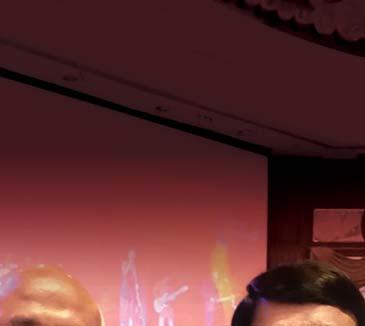


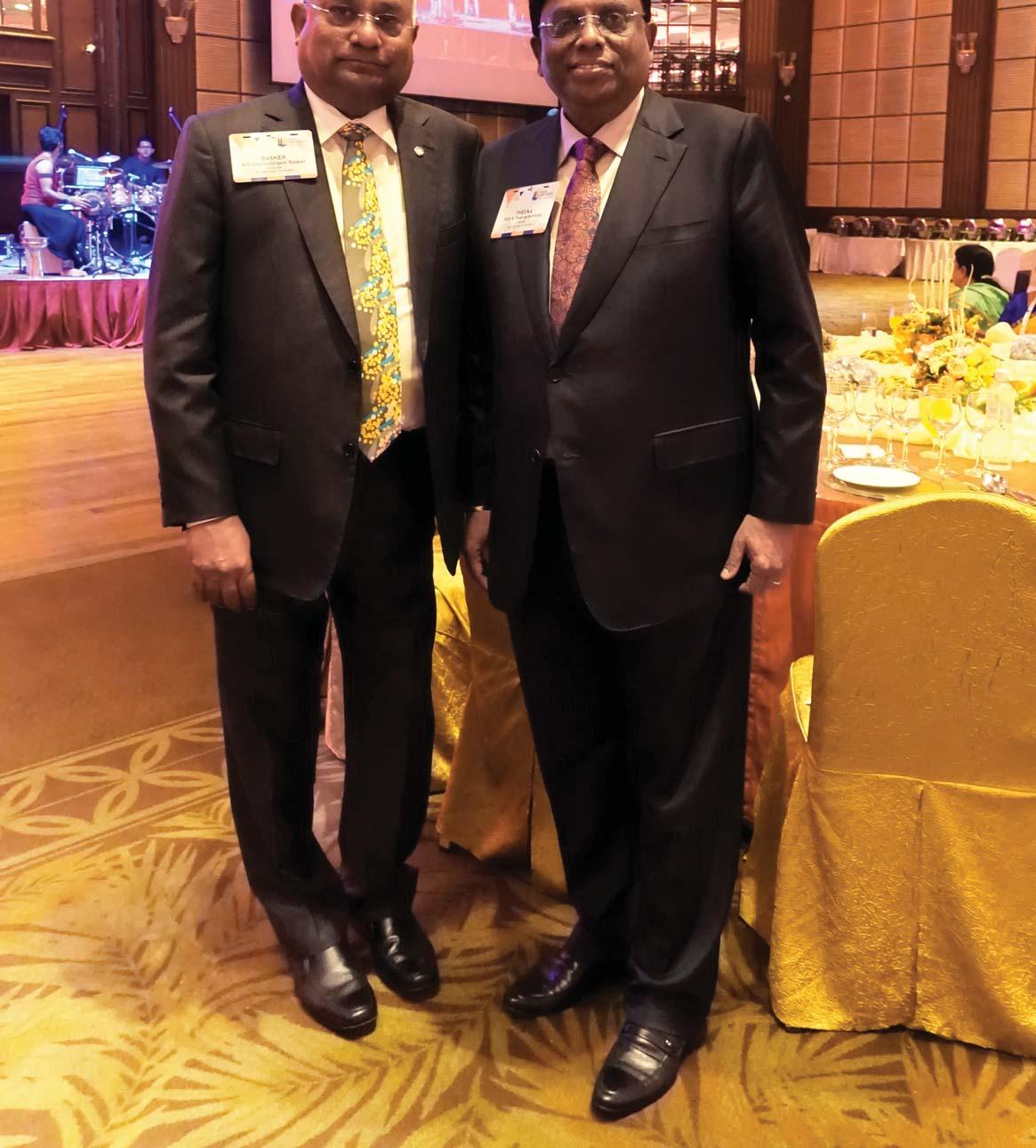

12 Teamwork critical to maximising our impact
A scintillating address by RI President Ian Riseley at the inaugural ceremony of the Zone Institute in Kuala Lumpur, Malaysia.
26 Saboo’s 10-point message on leadership
PRIP Rajendra K Saboo divulges the mantra of good leadership to the incoming governors at the GETS in KL.
36 TRF: Towards a second century
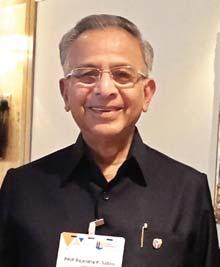
PRIP and Past TRF Trustee Chair Kalyan Banerjee enumerates the success story of TRF in the last century.
Award winners of Zones 4,5 and 6A in TRF contributions, Membership growth and Public Image.
18 I dream of a “strong, complaint-free Rotary in our zones”
RI Director C Basker, the Convener of the KL Institute, lists out his ambitious membership goals.
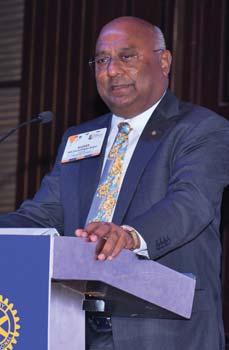

32 Rotarians have raised and invested $4.1 billion in the last 100 years
TRF Trustee Chair Paul Netzel unveils some spectacular figures that have been achieved in the last 100 years of TRF.
Senior leaders deliver some straight talk as PRIP K R Ravindran quizzes them on various Rotary topics.
56 Many firsts at GETS
The DGEs get their ‘hows’ and ‘whys’ clarified at the GETS.

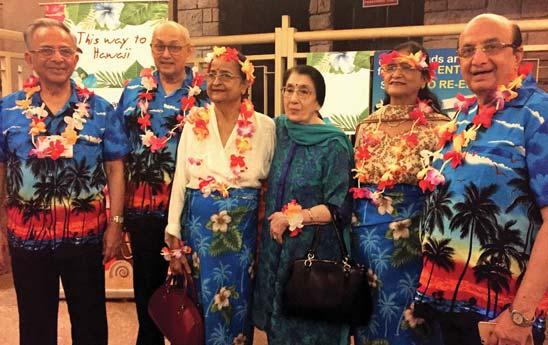
42 Hawaiian mood
Celebration of fellowship at the KL Institute captured in pictures.
On the cover: Malaysian dance performance at the inaugural of the KL Zone Institute.
Photo Courtesy: Rasheeda Bhagat

Your December Editorial is a bait for clubs to do better projects and at the same time make it known to the rest of the region in which Rotary News spreads its wings. With your promise to the northeast, an olive branch is being extended to the other far off and remote clubs which are quietly doing their bit. Kudos to you, Editor.
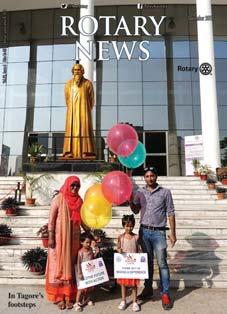
The RI President’s message — Towards a more peaceful world — rings in hope in the otherwise disturbing situations that threaten peace but I wish he had held one peace conference in our region. You have done justice to Setubandhan, the multi-district conference, by covering it in detail starting from Tripura CM’s call to Rotarians. It is news to me that Kerala is not the only State with high rate of literacy and it has a competitor in the northeast. It is good to know through the Regional Editors’ meet that the print magazines are here to stay. Hats off to RC Bangalore for sponsoring 106 Happy Schools. May their tribe grow.
Jaishree’s report on the 75-year-old RC Tinnevelly with the visit of PRIP Ravindran was interesting and informative. I am happy to note that some of the DGs (Meet your Governors) are positive and bold to say that they will induct only quality members.
Nan Narayenen, RC Madurai West — D 3000
The December edition is fantastic for its content, especially the colourful pictures. The article Finding an oasis in the desert has attracted me with its heading and the accompanying pictures, which will surely draw readers at first sight.
But only while reading, we can understand the content with its focus on leading a peaceful and satisfied life even at old age, a difficult phase in human life. The directives given by the
Nice articles in November
Thelaunch of an online Rotaract News to carry the activities of Rotaractors from January is welcome. RC Jalna Midtown, D 3132, can send a small write-up with details of Shudhu tablets to be published in Rotary News.
writers are very useful. Also, the advice “don’t be afraid to take an unfamiliar path, they take you to the best places” and “your life is the greatest enterprise in the world. Only you can stop it from going bust”, is excellent. Thanks for publishing such valuable articles. Season’s greetings and best wishes for the new year.
MT Philip RC Trivandrum Suburban – D 3211
The December issue sports a new look and an eye-opening message from RI Director C Basker. All the articles under the logo “Rotary in Action” are superb.
S Sivasubramaniann RC Tirunelveli Town — D 3212
Iam proud to be a member of RC Tinnevelly, D 3212, which is serving the community for 75 years. Even though we are 75 years old, we are still young, strong and have much more community service to do.
K Girish, RC Tinnevelly — D 3212
Iappreciate the article Fun, food and charity… in aamchi Mumbai which gives an invaluable message — how to collect the funds to serve society. The article motivates Rotarians associated with corporate clubs to organise such events. Congrats to DG Prafull Sharma for taking up this excellent task.
T D Bhatia, RC Delhi Mayur Vihar — D 3012
Thanks for the report 4-Way Test Award for Bunkar Roy in the December issue. The life of Roy was well covered, well-researched and much more than what I had mailed you. It was like icing on the cake.
Piyush Doshi RC Belur – D 3291
It is well said by RI President Ian Riseley “a dollar given to TRF has more muscle than a dollar given to most charities.” Smile at a person and watch its powerful impact, said PRIP Gary Huang. It is true. I have visited Arizona, US, thrice with my wife, also
a Rotarian, and each time attended 8–9 clubs as a guest. We were always greeted with warmth.
Giving Dignity to the Forgotten is a heart-rending article about the deprived and homeless. In A Budapest teaser it is rightly pointed out that during group
tours, a few cribbers and habitual latecomers, could ruin the entire trip. As an octogenarian, I have experienced such situations many a times during group tours.
My hearty greetings to the beneficiaries who got free houses from RC Attur, D 2982, in 2000 and I am happy to note that the houses are being maintained well by the occupants and even after 17 years, the club members meet the beneficiaries periodically. Our congratulations to the five clubs.
I wonder at the handwork of Anil Sutradhar at his age (92). He is making Chau masks in Charida village in Purulia district and this is the only place in the world for creating this beautiful art. The word ‘Sutradhar’ also refers to god or creator of new things.
S Muniandi
RC Dindigul Fort — D 3000
Itwas a pleasure going through the November edition. For the first time I have gone through almost all the articles as all of them were worth reading. You along with your team are doing a commendable job.
Shuddha Jal project is much needed in both our villages and towns where there is water scarcity. Three cheers to Rotary Club of Jalna Midtown for providing pure water to schools there. Water contamination causes contagious diseases. The drop in the number of patients and increase in school attendance after using Shuddha Jal is a positive. We should take up this project at a large scale and provide pure water to the needy in India. I have already taken the lead to do that in my area.
It was informative to read about the innovation of Dr Amar Agarwal in eye surgeries. Using one cornea for implantation on two patients is a remarkable achievement. The journey through Buda and Pest ( A Budapest
teaser) is very interesting and influences the reader to go there. Please include some places in India too.
Rotary in Action highlighting the various projects taken up by different Rotary clubs inspires the Rotarians to “make a difference” in the life of others. The Chau Mask Makers enriched our knowledge about the lesser known art of mask making in Charida village. On the whole, it was worth the time going through the magazine. Continue the marvellous work.
Dr Parvesh K Sablok RC Paonta Sahib — D 3080
Thearticle by Jaishree on the platinum jubilee celebrations of RC Tinnevelly and the global grant project done by the club was great and informative. My salute to all who work for Rotary News , which has attained international standards.
P Chockalingam
President, RC Tinnevelly — D 3212
Itwas great to read about the humanitarian work done by RC Delhi South and RC Sri Ganganagar. The DG Bagh Singh Pannu’s pledge on organ donation is laudable. And the article on Budapest took us into the world of imagination.
Naveen Garg, RC Sunam — D 3090
Fighting cancer with passion Iwas impressed with the article on RC Ambala’s dedicated efforts against cancer in the October issue. The article — RC Ambala’s cancer hospital gets a flying Ambassador — lucidly describes the passion of Rotarians of the club in fighting cancer. They have set an example by constructing a huge cancer hospital with state-of-the-art facilities with the help of matching grant and RC Boca Raton, USA.
But the most important lesson is that they have not ceased to work after providing a cancer hospital with 100 beds. Rather they are now on an expansion mode and aim to add another 30 beds and high-end medical equipment. My sincere regards to Dr Jai Dev who has contributed ` 8 crore in this project.
Dr Prosenjit Ghosh
RC Green Land Silchar — D 3240
Towards better Indo-Pak relations
Towards a more peaceful world, by RI President Riseley with interest. It fascinated me. His remarks on the “scourge of war” and the forthcoming, “series of six presidential peacebuilding conferences” are thought-provoking with reference to India and Pakistan. Without peace, life will never be happy and prosperous. The world will never be liveable and lovable.
When Rotarians from India and Pakistan meet at any Rotary or other events, we greet each other, exchange smiles, shake hands and hug each other. But the border dispute remains unresolved for more than seven decades Why the governments of India and Pakistan have failed to resolve it? It is time for Rotary to step in, under its Peace and Conflict Prevention/Resolution head to help India and Pakistan find an amicable way to resolve their differences.
In India we have PRIPs, PRIDs, past TRF trustees and PDGs. Likewise, in Pakistan, there are a good number of Rotary leaders. Let us together constitute a forum of Rotary leaders and chalk out how to persuade India and Pakistan to resume talks. Here, Rotary will play the role of a friend in need for both the countries. Ramakrishna K, RC Puttur — D 3181
We welcome your feedback. Write to the Editor: rotarynews@rosaonline.org; rushbhagat@gmail.com
RI Dist 2981
DG P S Ramesh Babu
RI Dist 2982 DG Dharmesh R Patel
RI Dist 3000 DG P Gopalakrishnan
RI Dist 3011 DG Ravi Choudhary
RI Dist 3012 DG Sattish Singhal
RI Dist 3020 DG G V Rama Rao
RI Dist 3030 DG Dr K Sunder Rajan
RI Dist 3040 DG Dr Zamin Hussain
RI Dist 3053 DG Rajkumar Bhutoria
RI Dist 3054 DG Maullin Manubhai Patel
RI Dist 3060 DG Ruchir Anirudh Jani
RI Dist 3070 DG Parvinder Jit Singh
RI Dist 3080 DG T K Ruby
RI Dist 3090 DG Bagh Singh Pannu
RI Dist 3110 DG Vinay Kumar Asthana
RI Dist 3120 DG Ranjeet Singh
RI Dist 3131 DG Abhay Gadgil
RI Dist 3132 DG Vyankatesh Vithal Channa
RI Dist 3141 DG Prafull J Sharma
RI Dist 3142 DG B M Sivarraj
RI Dist 3150 DG J Abraham
RI Dist 3160 DG Madhu Prasad Kuruvadi
RI Dist 3170 DG Anand G Kulkarni
RI Dist 3181 DG M M Chengappa
RI Dist 3182 DG G N Prakash
RI Dist 3190 DG Asha Prasanna Kumar
RI Dist 3201 DG Vinod Krishnan Kutty
RI Dist 3202 DG Sivashankaran P M
RI Dist 3211 DG Suresh Mathew
RI Dist 3212 DG Chinnadurai Abdullah
RI Dist 3231 DG Jawarilal Jain K
RI Dist 3232 DG R Srinivasan
RI Dist 3240 DG Sunil Saraf
RI Dist 3250 DG Vivek Kumar
RI Dist 3261 DG Harjit Singh Hura
RI Dist 3262 DG Ajay Agarwal
RI Dist 3291 DG Brojo Gopal Kundu
Printed by Mukesh Arneja at Thomson Press (India) Ltd, Plot A-9, Industrial Complex, Maraimalai Nagar 603209, India and published by Mukesh Arneja on behalf of Rotary News Trust from Dugar Towers, 3rd Flr, 34, Marshalls Road, Egmore, Chennai 600 008. Editor: Rasheeda Bhagat.
PRIP Rajendra K Saboo RI Dist 3080
PRIP Kalyan Banerjee RI Dist 3060
PRID Sudarshan Agarwal RI Dist 3011
PRID Panduranga Setty RI Dist 3190
PRID Sushil Gupta RI Dist 3011
PRID Ashok Mahajan RI Dist 3141
PRID Yash Pal Das RI Dist 3080
PRID Shekhar Mehta RI Dist 3291
PRID P T Prabhakhar RI Dist 3232
PRID Dr Manoj D Desai RI Dist 3060
RID C Basker RI Dist 3000
ExecutiveCommitteeMembers(2017–18)
DG B M Sivarraj
Chair – Governors Council
RI Dist 3142
DG R Srinivasan RI Dist 3232
Secretary – Governors Council
DG Abhay Gadgil RI Dist 3131
Secretary – Executive Committee
DG Vivek Kumar
Treasurer – Executive Committee
RI Dist 3250
DG P Gopalakrishnan RI Dist 3000
Member – Advisory Committee
Editor
Rasheeda Bhagat
SeniorAssistantEditor Jaishree Padmanabhan
Sendallcorrespondenceandsubscriptionsto
ROTARY NEWS TRUST
3rd Floor, Dugar Towers, 34 Marshalls Road Egmore, Chennai 600 008, India.
Phone : 044 42145666 e-mail : rotarynews@rosaonline.org
Website : www.rotarynewsonline.org
The views expressed by contributors are not necessarily those of the Editor orTrustees of Rotary NewsTrust (RNT) or Rotary International (RI). No liability can be accepted for any loss arising from editorial or advertisement content. Contributions – original content – are welcome but the Editor reserves the right to edit for clarity or length. Content can be reproduced, but with permission from RNT
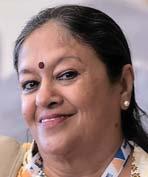
he most welcome and salient feature of the Kuala Lumpur Zone Institute was the candour, honesty and openness from senior leaders who did not pull any punches when articulating the shortcomings and problems of Rotary in India. A sizzling session was moderated by Past RI President K R Ravindran, where he put in the dock senior leaders — RI President Ian Riseley, TRF Trustee Chair Paul Netzel, and Past RI Presidents Rajendra Saboo and Kalyan Banerjee. It’s official now that the RI President receives several mails from India where Rotarians accuse others of dishonesty. And these are copied to the entire RI Board, TRF Trustees and “anybody who has an email address!” Banerjee said it was common knowledge that we Indians “love to complain, and at the drop of a hat shoot off a letter, with copies to everyone around the world. We should stop this and sort out our problems ourselves.”
Riseley said in some places there was “a reported dishonesty in membership figures” which only the Rotary leadership there could rectify. “I was asked by one of the DGs yesterday what RI is going to do about that problem. And I told him that the solution, like the problem, lies with you.” Such things led people in Rotary elsewhere to believe that “something is rotten in the state of Denmark!” Another concern was that highly qualified women who were business and professional leaders were missing from Rotary. This was a huge opportunity that needed to be tapped.
During the session ‘Frankly Speaking’, PRIP Saboo, quizzed by Ravindran on his well-known opinion against the holding of Zone Institute and PETS/SETS etc in foreign locales, came down heavily on such practices. When such events were held in exotic places, the focus shifted on sightseeing, entertainment and other distractions, and the training element took a second place. “But it is not fair
on your part Ravi, that while enjoying the Zone Institute in Malaysia, you ask me this.” To which Ravindran’s lightning-swift return volley was: “Who said anything about being fair!”
Another interesting question, answering which the panelists disagreed, was on TRF Trustees being appointed and not elected, like the RI Directors. While Chair Netzel said they should be elected, Banerjee disagreed. “If we do so, we are likely to run into disputes and situations that are not comfortable.” Saboo agreed with Banerjee and said if Trustees were elected “they would come with their own authority and there will be two parallel bodies and I fear that the RI may get relegated to the second positon because TRF has all the money!” Ravindran said through this session he was giving the wider Rotary world a taste of what happens on the Board…healthy discussions where Board members or Trustees disagreed, but in a respectful, agreeable manner.
And, I suppose, without coming to blows! A message to Indian Rotarians to sort out their differences/problems in a civilised manner and by healthy debate without slanderous mails flying thick and fast across the cyber world?
All in all, Institute Chair R Theenachandran and his team deserve full marks for a well-planned and neatly executed Institute, where the most comforting aspect was Indian food. And, the most enjoyable moments at the Hawaiian night where the suits, ties and sarees were exchanged for colourful clothes and flowery accessories, and there was laughter, fun, music and dancing, of course!
But above all, the best takeaway was President Riseley’s rather exasperated comment: “In how many ways do I say that the 4-Way Test is not something you just put up on a wall.” More details in the next issue, where the Institute coverage continues. Meanwhile, we at Rotary News Trust wish you all a great 2018!
Rasheeda Bhagat
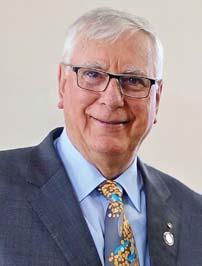
Dear Fellow Rotarians,
In Rotary, our diversity is our strength. This idea dates back to the earliest years of our organisation, when the classification system was first proposed. The idea behind it was simple: that a club with members who had a wide variety of backgrounds and abilities would be capable of better service than one without.
range in the room does not promise a sustainable future for our organisation. Our membership is near a record high, and we are bringing in new members all the time — yet only a small minority of those members are young enough to have decades of Rotary service ahead of them. To ensure a strong and capable Rotary leadership tomorrow, we need to bring in young and capable members today.
ble to serve that comahead, it is clear how in
In the years since, the idea of diversity in Rotary has come to be defined more broadly. We have discovered that a club that truly represents its community is far better able to serve that community effectively. Looking ahead, it is clear how essential diversity will remain in Rotary: not only to strong service today, but to a strong organisation in the future.
One of the most pressing aspects of diversity to address in our membership is the age of our members. When you look around at almost any Rotary event, it becomes immediately obvious that the age
o a strong aspects to s the age of our memd at ly that age
We also cannot discuss diversity in Rotary without addressing the issue of gender. It is difficult to imagine that just three decades ago, women could not join Rotary. Although we have come a long way since then, the legacy of that misguided policy is still with us. Far too many people continue to think of Rotary as an organisation only for men, and that idea has had a detrimental effect on both our public image and our membership growth. Today, women make up just over 21 per cent of Rotary’s membership. While this is certainly a great improvement, we have a long way to go to meet what should be the goal of every club: a gender balance that matches the balance of our world, with as many women in Rotary as men.
Whatever brought each of us to Rotary, we stay because we find value in Rotary membership and believe that our service has value to the world. By building clubs that reflect that world in all its diversity, we will build even more enduring value in Rotary: Making a Difference.

President, Rotary International
Ian H S Riseley ent, Intern

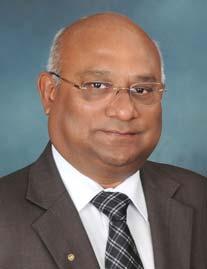
Dear Rotarians,
The happiest people I know are the ones who have discovered the true meaning of happiness. Much of a person’s abilities have to do with his/her understanding their vocation, and success in their chosen field brings them more happiness. The real secret of happy and successful people lies in their applying ethics in daily life in everything they do. He profits most who serves best. People who follow the Four-way Test know the meaning of truth and its successful application in their lives. Look for opportunities, in your vocation, to serve others. Many of us plan to initiate a new life after retirement. Many people work hard for 30 or 40 years of their career but put little thought into what they will do when that work is done. Our call to work remains even if all of our financial needs are met in retirement. In fact, in retirement we will have more time than ever to serve others. We must take the initiative now to thoroughly plan how to avoid idleness, and remain active in the years following our retirement.
Some months ago, a Rotarian sent me a story about a 76-year-old librarian Palam Kalyanasundaram. No words can describe the beauty of this man’s kindness and generosity. Kalyanasundaram, who worked as a librarian for 30 years, is a gold medallist in Library Science and also holds a Masters in Literature and
History. Apart from working as a librarian, he has also worked as a waiter in a hotel for two meals a day and a small salary.
Kalyanasundaram donated his entire monthly salary for the welfare of orphans till his retirement and continues to donate his monthly pension to the needy. He was motivated and inspired by his mother to help the poor and needy. He believed in the doctrine: Don’t bother about how you speak. Strive to make others speak well about you. Here comes the interesting part of his life. He was awarded by an American organisation a very large sum in recognition for his work to benefit orphans. But he donated the entire amount to charity. Kalyanasundaram donated everything he had and subsisted on earnings from doing odd jobs. I truly admire this gentleman for what he has done to help those in need. His immense kindness has created awareness among many people. We will take him as an example and serve through our vocations.
This American Association honoured Kalyanasundaram as the Man of the Millennium and presented him with a sum of `30 crore which he donated to charity. We learn from such role models. Let us, through Rotary, improve the lives of others.
Wishing you all a very happy and prosperous 2018!

C Basker Director, Rotary International
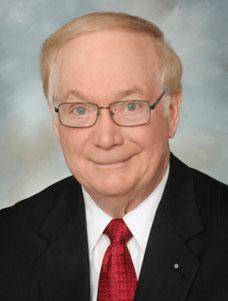
We are at the halfway point of this Rotary year. There is plenty to look forward to in 2018 as we complete the first year of The Rotary Foundation’s second century of service. By working in partnership with our Foundation, Rotarians are making a difference in ways we could never have imagined when we began.
First, our signature polio eradication initiative continues to bring us closer to the historic day of a polio-free world. Following our tremendous World Polio Day event in Seattle, and the thousands of local events hosted by Rotary members around the world, we are keeping up the momentum to reach this year’s polio fundraising goal of $50 million (including District Designated Fund contributions). We are already closing in on that target thanks, in part, to the efforts of Rotarians and friends who participated in the recent Miles to End Polio bike ride to raise funds for the cause.
Second, our Foundation’s comprehensive fundraising target of $360 million this year will empower you and other Rotarians to continue helping people all over the world.
In addition, the Building TRF Endowment: 2025 by 2025 initiative is progressing well. Our goal is to build an endowment of $2.025 billion by 2025 to ensure the long-term financial stability of the Foundation and provide essential resources well into the future.
Another emphasis relates to our work in peacebuilding and the Rotary Peace Centres programme. Applications for Rotary Peace Fellowships become available this month. Be on the lookout for great candidates and support our Peace Fellow alumni in the field by inviting them to work with you as advisers on your projects.
Between February and June, RI President Ian H S Riseley is convening six Presidential Peacebuilding Conferences, which will showcase the connections between our work in each area of focus and sustainable peace. You are invited to attend!
Of course, the biggest event of the Rotary year will be the 2018 Rotary International Convention in Toronto from June 23 to 27. We will celebrate not only the highlights of this Rotary year, but also the 50th anniversary of Rotaract.
In the new year, let us continue to show that we are People of Action! And let the world take notice: We Rotarians are Making a Difference.
Paul A Netzel Foundation Trustee Chair
Send me your thoughts on the Foundation: Paul.netzel@rotary.org. We are listening!



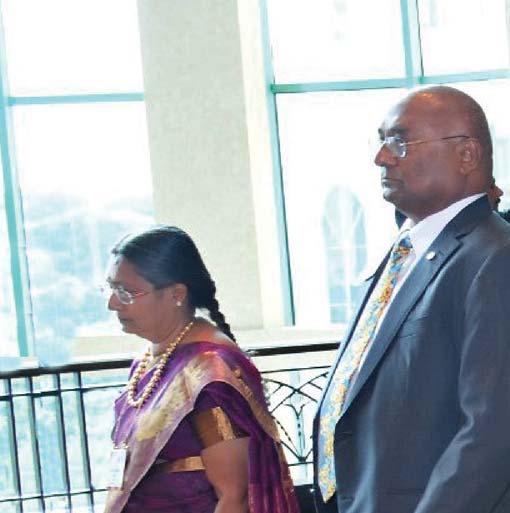
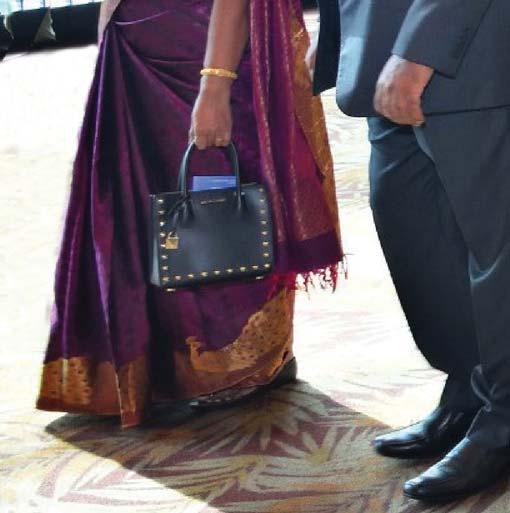
Ilove sports… in many ways it’s a metaphor for life. You can’t always win, especially if it happens to be a team I am supporting! But sports emphasises the importance of teamwork because when we work together, we achieve more than the sum of our individual efforts.”
With these words RI President Ian Riseley began his inaugural address, laced with humour, quips and some plain home truths, at the Rotary Zone Institute in Kuala Lumpur. Posing a question on the greatest sporting victory in 2017 — (“and no, it isn’t the Indian cricket team’s victory over Sri
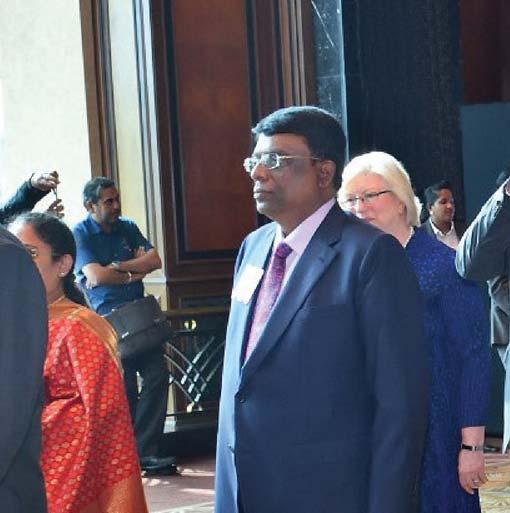
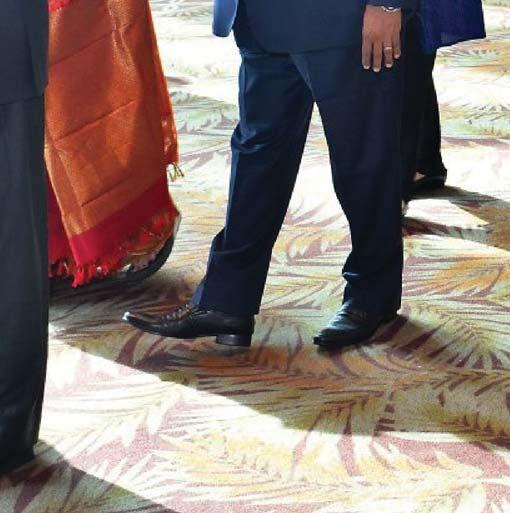
Lanka!”), he said if he asked this to the DG of D 1360, “I know what his opinion is and I would agree with him. He would say it is the Iceland football team qualifying for the World Cup finals. This is a country of 330,000. That team has qualified for the final 32 in the World Cup, whereas football powerhouse nations such as the Netherlands with a population 50 times more, or the US, or a bigger shock, the Italian team, did not qualify.”
They could achieve this feat because “Iceland plays as a team. There is a message here for all other teams as well as a large and great organisation such as Rotary. Teamwork is critical to

maximising the impact of our efforts,” said Riseley.
Just as who would have imagined the Iceland team would make it to the final 32 for the football World Cup, “who would have thought that the scourge of polio could be eliminated, but after 30 years of effort, Rotary and our partners are on the verge of success.”
A challenge we took on
The RI President recalled a quote from former US President John F Kennedy, who said while making his famous speech about sending a man to the moon. “He said we choose to do
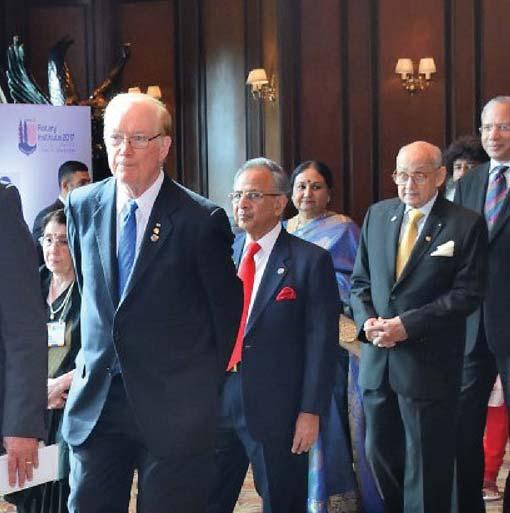
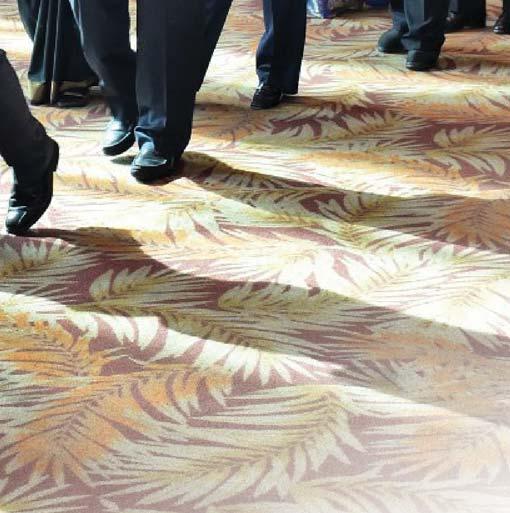
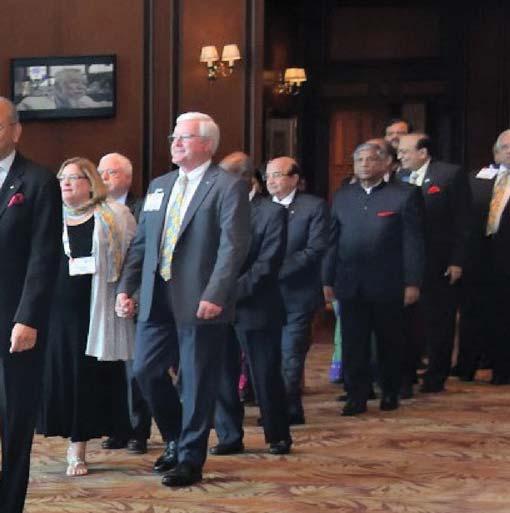

such things not because they are easy but because they are hard. Because that goal will serve to organise and measure the best of our energy and skills. Because that challenge is one that we are willing to accept, unwilling to postpone and one we intend to win. He could have been talking about Rotary’s polio eradication campaign!”
Similarly, Rotary was on the brink of success on polio eradication because “we worked hard, had persistence and good partners. But it is also teamwork... right down to the club level. When we work together we achieve great things.”
Riseley said he was an accountant and hence very fond of numbers

as “numbers can communicate ideas, they are straightforward, work in just about every language and sometimes you can get an idea across much more clearly by using numbers than words.”
For long, the two numbers used about Rotary are that it has a membership of 1.2 million and 37,500 clubs. But while these numbers could communicate the size of the organisation, they couldn’t explain who those members were or what they did. Also, Rotary, despite being a huge organisation, was “unusually decentralised. As the RI President I have far less control over what an individual Rotary club does compared to the president of that
Numbers can communicate ideas, they are straightforward, work in just about every language and sometimes you can get an idea across much more clearly by using numbers than words.
RI President Ian Riseley
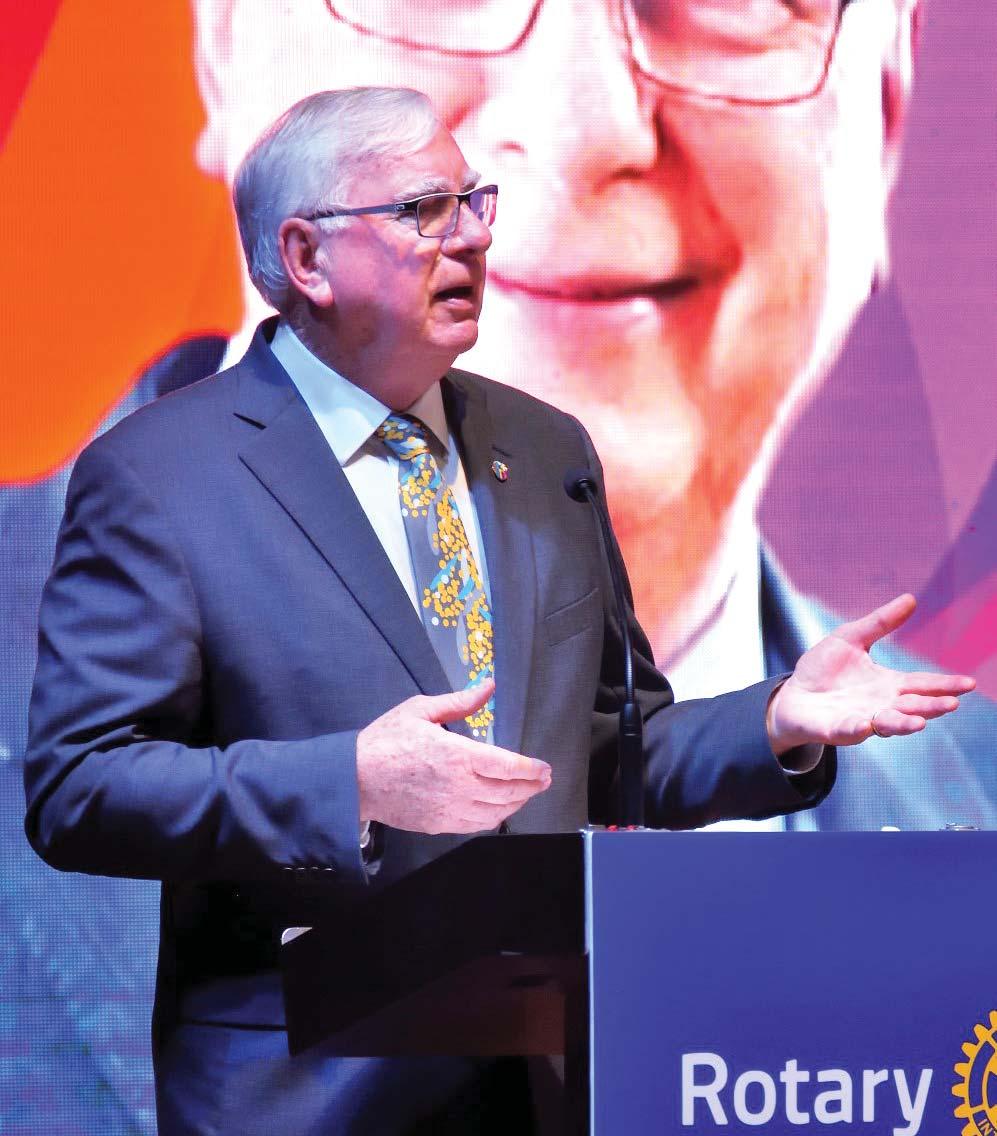
As RI President I have far less control over what an individual Rotary club does compared to the president of that club, and that’s as it should be because it is precisely this system that allows Rotary to be as
RI President Ian Riseley
club.” Ultimately the way each club functions is decided by that club and “that is as it should be because it is precisely this system that allows Rotary to be as effective as it is.”
Rotary’s strength lay in its diversity and this was enshrined in its classification system which ensured that the clubs were vocationally diverse, with a whole range of skills and abilities which enabled them to be so effective in the work they did for the community. Diversity brought strength and this was true of not only different vocations, but also different interests, languages, backgrounds, cultures and ideas.
“But the two areas where diversity is especially vital is in age and gender. It’s not enough to have just a big membership; we need to ensure that the members we bring to Rotary will stay long enough to become leaders. That is not something that is happening enough now and we need to work on it and make it happen.”
President Riseley expressed his apprehension that the membership figures in Rotary tended to be “rubbery”.
“There is a reported dishonesty in membership figures and it is up to the leadership in Rotary to rectify the situation. I was asked by one of the DGs yesterday what RI is going to do about that problem. And I told him that the solution, like the problem, lies with you. It is up to all of you to embrace that challenge.”
Also, he added, a large number of qualified women “who are business and professional leaders, are our biggest membership opportunity, and this applies in India as well as most parts of the world, so I urge you not to lose sight of that opportunity.”
It was well-known that a community with a Rotary club was much better off than one without it. But that club would have to be a good one with diverse membership and wellconnected to all parts of the community to know its problems and in a position to help. “Such a club enriches a community in a way few other institutions or organisations can.”
Riseley explained why it was always a pleasure for him to be with Rotary in this part of the world; “Kalyan (Banerjee) was president when Juliet was DG and he nominated me as a Trustee. Ravi (PRIP K R Ravindran) was the President’s Rep at Juliet’s District Conference and of course he asked me to be co-chair of his Convention in Korea. Ashok Mahajan and I worked as sergeants at the 2003 Convention in Brisbane and Trustee Elect Gulam
At the inaugural session of the KL Institute, RI President Ian Riseley described a heart-warming project that he had seen as President Elect at a Rotary club in Skane in southern Sweden, which has a large and growing population of the refugee community, many of them fleeing from the civil war in Syria. “That war is a crisis all of us have been hearing about for several years. But what can one person do for something that is at such an overwhelming scale, you may ask. Well, in Rotary, you are not just one person.”
Together, the Rotarians of Skane found what they could do; they built a huge warehouse to help the new refugees to settle into their new lives. “They accepted donations of, let’s say, gently used items from the community — everything from kitchenware to coats.” The store is staffed not only by the Rotarians but also refugees who have been in Sweden for some time and who donated their service for this cause. New refugees who had just arrived and have nothing, could help themselves to what is kept here before setting up their new homes. “It’s a win-win across the board. In this place Rotary has made a huge difference to people who have lost everything. There is so much value in a project like that.”
But the trouble is that “when we see our organisation globally, it is very difficult to communicate that value when talking to others about Rotary, whether they are prospective members or partners. It’s a challenge to convey the soul and scale of what Rotary is doing. I am sure I am not the only one here who, when asked
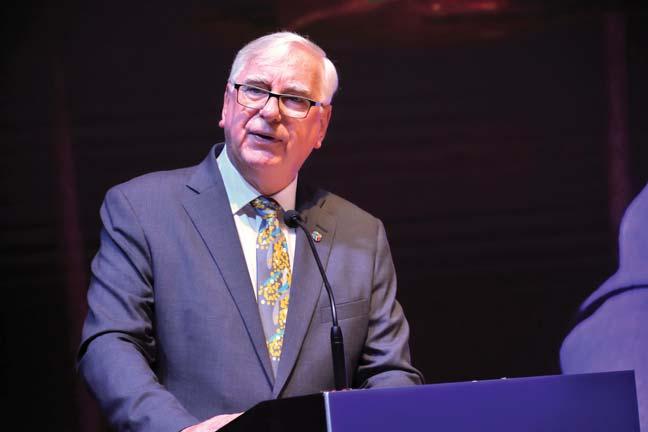
what is Rotary, has responded with a long pause and an open mouth. It is not that we don’t know what it is and what it does, but it is so large and does so much that it is just about impossible to compress it in one or two sentences.”
This was a problem not only because it gives Rotarians a few awkward moments but also a challenge in communicating “our roles and values in the world and that is why, through the DGs, I’ve asked club presidents to provide, at the end of the year, just two numbers — number of volunteer hours during the year put by Rotarians and their families and the value invested in service in cash and kind… money and hours.”
Riseley said his goal at the end of this Rotary year was to aggregate those numbers and “shout from rooftops that not only is Rotary an organisation with 1.2 million members and 37,500 clubs, but we also contribute to our communities an
annual value of perhaps $1 or 2 billion or even $3 billion!”
But the only way to aggregate that number was for each club to add it up themselves. “I think we will all be surprised when we tally the value of the difference Rotarians are making in the world.” Individually, Rotarians would vouch that Rotary had enriched their lives by the skills acquired, the connections made and the satisfaction gained. “For my own part, it is true that beyond anything else that Rotary has done for me personally, being a Rotarian has simply made me a better person, I now think more carefully about the things I do and why I do them. It’s had a positive impact on the way I interact with others and it has not only made me care about others but to also turn that care into action.”
He added that Rotary had also given him a way to make a difference in other people’s lives and “made an incalculable difference in his own life by adding to it a value that no numbers can ever measure.”
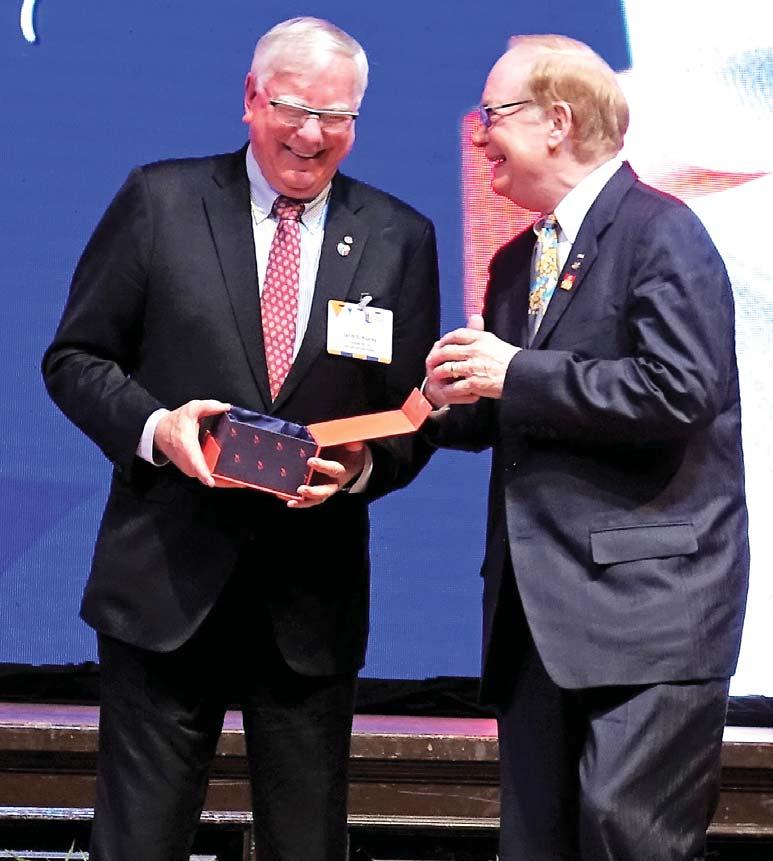
(Vahanvaty) was the President’s Rep to our District in 2007.”
Addressing the inaugural session, TRF Trustee Chair Paul Netzel said that at the 2007 Convention in Salt Lake City, Bill Gates Senior, the father of Bill Gates of the Gates Foundation, who addressed the Convention said he had spent the last decade travelling around the world looking at monstrous problems. “And it boggles the mind to try to make sense of how dramatically you Rotarians have changed millions of lives around the world.”
That is precisely what Rotarians had been doing from the beginning of Rotary and the evolution of TRF — changing
lives. “Gates was focussing not exclusively but heavily on what he had discovered about Rotary’s work with polio at that point. And this was just before the Gates Foundation established their official relationship with Rotary and the TRF and provided major funds to advance our work.”
Netzel said Gates Senior had validated “what we had been working on for a number of years and he was acknowledging that our impact was far greater than we had any idea.”
Rotary’s work in polio had shown what we can achieve by striking partnerships. The Trustee Chair then gave out figures to show the magnitude of Rotary’s work in polio eradication. In 1988, the world was seeing 1,000 polio
At the Salt Lake City Convention, Bill Gates Sr validated what we had been working on for a number of years and he was acknowledging that our impact was far greater than we had any idea.
cases a day, and 350,000 a year in 125 countries. “Last year there were 37 cases of polio in three countries, and this year, till Nov 30, 16 cases have been reported — 11 in Afghanistan and five in Pakistan.”
The numbers he listed on Rotary’s battle against polio were impressive enough — 20 million volunteers; 2.5 billion children immunised; 16 million cases of polio prevented; 1.5 million deaths averted. “So many children and adults are living, walking, breathing and doing so many different things because of immunisation thanks to Rotarians. Overall, $14 billion have been invested and Rotarians have been responsible for raising $1.7 billion for this initiative and this is fantastic and we need to keep in mind that the finish line is in sight. Perhaps the last case of polio was reported yesterday (from Afghanistan); we don’t know,” he added, amidst thunderous applause. Institute Chairman PDG R Theenachandran welcomed the gathering and Secretary PDG Deepak Shikarpur delivered the vote of thanks.
Pictures by Rtn Sridhar Bharathy
Designed by N Krishnamurthy


Rasheeda Bhagat
The Kuala Lumpur Rotary Zone Institute
Convener and RI Director C Basker, addressing its inaugural session, said Rotary had a strong presence in our zones which included
India, Sri Lanka and Nepal. “We have over 160,000 Rotarians which forms 13 per cent of the world’s Rotarians.” In the last three years, membership had been growing and this year the zones have added over 6,400 Rotarians so far.
He recalled that at the RI Directors’ orientation programme, the late RI President Elect Sam Owori had asked him his membership goal. And when he put the number at 10 per cent, he thought Owori would be happy. But he smiled and kept
quiet. Sensing he wasn’t happy, Basker quizzed him, to which Owori’s counter question was on the population of countries in his zone. “When I said 1.25 billion, he said your aspiration should be to get 1.25 million members. I was taken aback and asked
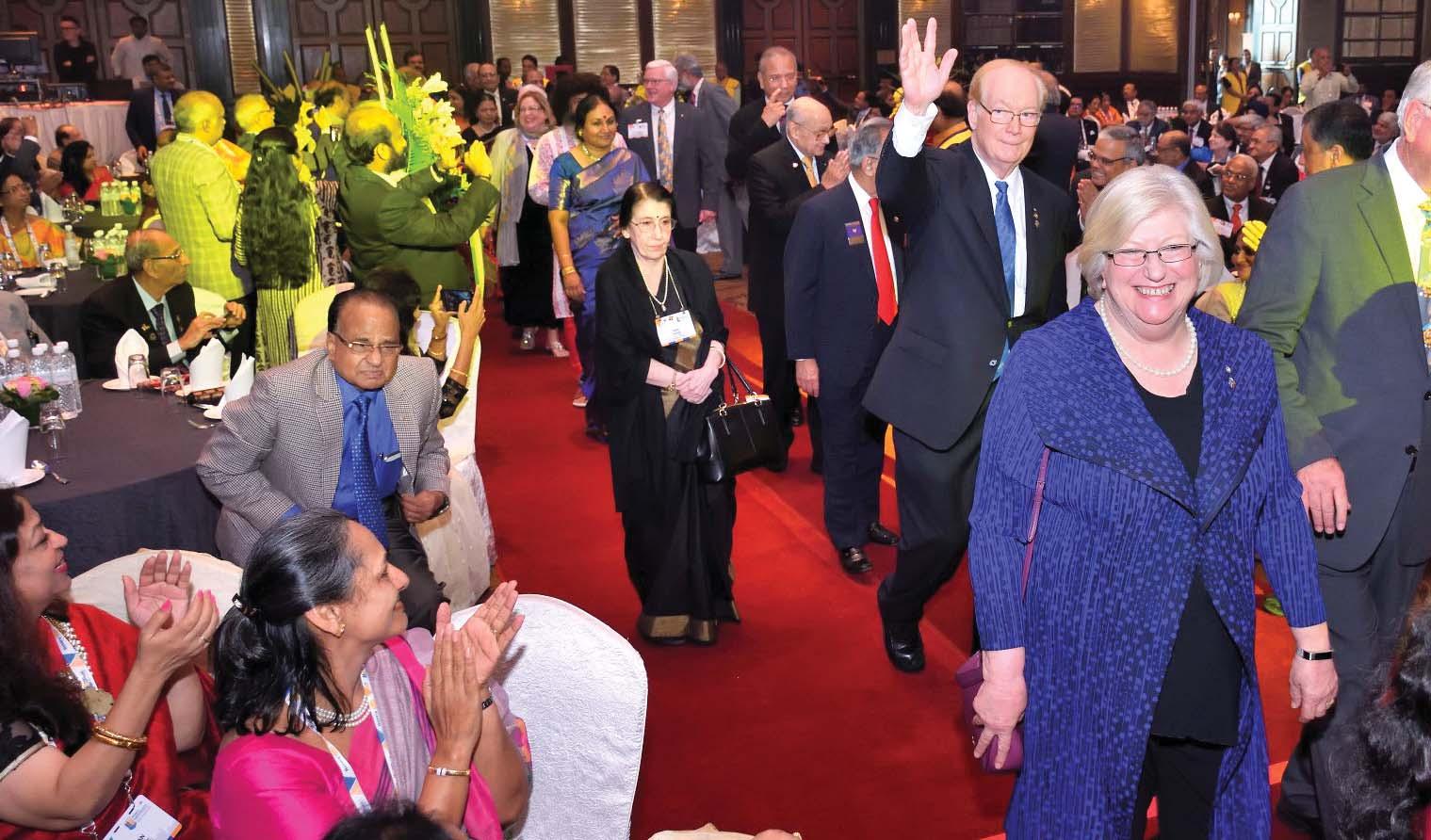
how is it possible to have one per cent of the population as Rotarians? And he said: ‘Well, Sweden has one per cent Rotarians. Why can’t our zones, including Africa, take up that challenge?”
That set him, added Basker, to set his new goal as 1.25 million members in “our zones alone by 2025.”
But such a goal, which he had discussed with the present DGs, wouldn’t be easy, said the RI Director. And to work towards it Rotarians in these zones, particularly club and district leaders, would have to implement three points:
Support and strengthen clubs

Improve Rotary’s public image
An ambitious membership goal
Basker then listed out the initiatives he has taken to march towards this ambitious goal, and make Rotary strong in our zones. “It was decided to improve the running of clubs, and clubs were told that those of them which do not have a Constitution and bylaws will need to get one prepared by September and circulated to members before Sept 30.”
The DGs had agreed to verify this during their official visits, and were also advised to print the bylaws in the district directory. A SWOT analysis for each district based on the lastfive years’ RI data on membership and TRF giving has been prepared and shared with the DGs.
Strategic planning for Rotary clubs has been made simpler through an objective work sheet which each club secretary was asked to prepare with the president during PETS. Most DGs have done that.
Emphasis on training
Coming to the component which he considers “most important”, Basker said
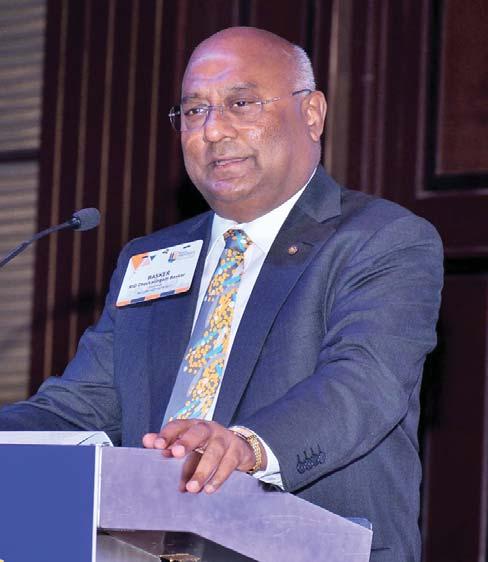
this year the DGs have been asked to take all training events very seriously and some new initiatives and a uniform agenda have been prepared for PETS and SETS based on the RI handbook. “For the first time, the club president’s handbook has been printed in all regional languages. This has helped those who do not follow English to understand the dos and don’ts of a club much better.”
The ‘trainer’s training programme’ has been made compulsory at the district level and “we have trained key officials like the district membership, TRF and public image
Women’s clubs in our zones have proved to be highly dedicated, efficient, especially in humanitarian service projects and they have also proved to be great fund managers. We want to have 25 per cent of our members as women.
chairs centrally naming the programme Disha with a common syllabus and faculty.
Next with membership being an important priority, a district-wise data analysis was done for the last five years to understand recruitment and retention.
A big challenge was the members understanding membership criteria, “so we have prepared and circulated this information to the DGs to share with their club presidents for a better understanding on who to invite to join their clubs.
The DGs are working with weak and dysfunctional clubs, and have promised that either through mergers or induction of new members, they will ensure there are no clubs with less than 20 members by June-end, 2018. I have also encouraged the districts to hold at least two or three membership seminars so
C Basker declares the Institute open.

that people don’t leave Rotary,” said Basker.
Record TRF contributions Coming to TRF, Basker congratulated past Trustee Chair Kalyan Banerjee for ensuring that our zones continue to be among the top giving nations. “Thanks to his tireless efforts as a leader, our zone contributed over $20 million, which is not only the highest ever for us, but has also placed us in the second place in the world in TRF contributions. Now the challenge for the Trendsetters (present DGs) is to surpass our own milestone and show we
Rotaracts are the life insurance of Rotary in our zones, and we have the highest number of Rotaract clubs in the world; we are launching an online version of Rotaract News from January.
are not only aggressive in fighting elections, we are also aggressive in raising funds!”
The goal set for this year for the zone is $30 million. Again, a five-year club-wise analysis on TRF giving has been prepared to help the clubs leaders understand they need to “create a habit of members making a TRF contribution every year. We are hoping that at least 50 per cent of the clubs give to TRF this year.”
To focus on endowments and major gifts, district-level endowment and major gift chairs had been appointed for the first time ever, and they would work under the guidance of the DG and the EMGAs.
CSR funds
Basker said the Indian government had provided a great opportunity to service organisations such as Rotary by its mandated CSR policy which would
really be achieved. Hence, we conducted a central training programme in Hyderabad for the first time involving DRRs, DRCCS, ARCS and RCs with the RI staff and I am sure we will now see a significant involvement and increase in Rotaract activities.”
To capture these activities an online version of Rotaract News on a quarterly basis is being launched and this will bring in synergy between Rotary and Rotaracts.
make available Rs 1,800 billion annually to be spent on community welfare programmes. TRF Trustees have permitted Rotary in India to accept this money and a district CSR chair had been appointed to build a relationship with potential corporate donors.
India was also a major recipient of global grants; “in order to improve the quality of the global grants executed in our zone, the Trustees have approved as a one-year pilot project an oversight panel comprising experienced PDGs as volunteers to oversee completed grants at no cost to Rotary.”
Rotaract News
“Rotaracts are the life insurance of Rotary in our zones, and we have the highest number of Rotaract clubs in the world but unfortunately the RI data base is not updated owing to coordination issues. Without current data no improvement can
Paying a handsome tribute to the dedication of women Rotarians in India, the RI Director said the district governors have been asked to give a special focus to invite women members. “The new women’s clubs started in our zones have proved to be highly dedicated, efficient, especially in humanitarian service projects and they have also proved to be great fund managers. We want to have 25 per cent of our members as women; right now, we are the lowest in this category.”
In conclusion, Basker said: “I have a dream... of 1.25 million Rotarians in our zone by 2025 and an annual contribution of $50 million to TRF, also by 2025. And to execute at least 500 worthy humanitarian projects every year. Last, but not the least, a complaint-free and healthy Rotary in India.”
Pictures by Rtn Sridhar Bharathy
Vijay Jalan appointed RRFC
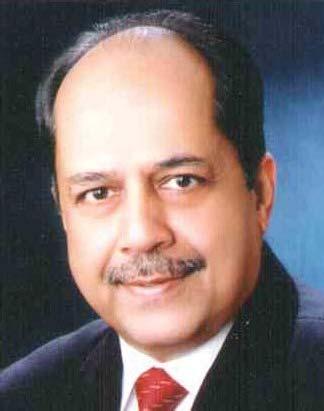
Past District Governor Vijay Jalan has been appointed as Rotary Regional Foundation Coordinator for RI Zones 4 and 6A with immediate effect until June 30, 2020. He holds a record for the highest collection for TRF in India till now and has also served as Rotary Coordinator for the same zones during 2014–17.


Rasheeda Bhagat
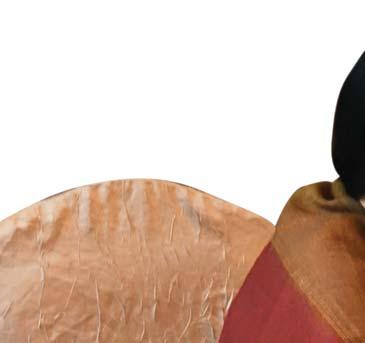
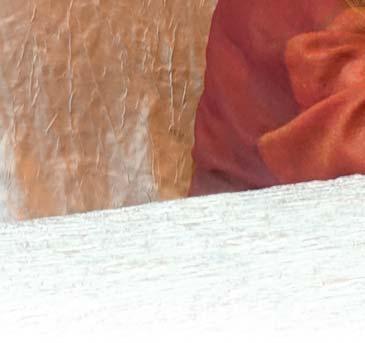
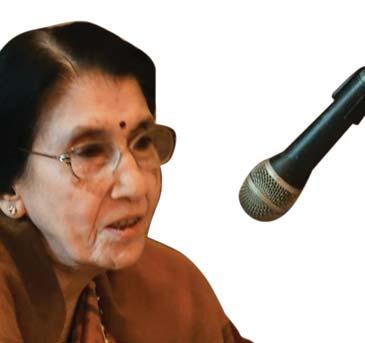
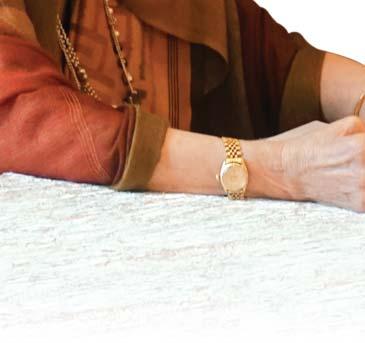
Those familiar with Usha Saboo, the tiny frail woman, well-known in both the Indian and international Rotary world, also know that the tiny package comes with a steel spine. And you can count on her to deliver some tough punches, in her soft voice, when required. Her address at the Kuala Lumpur Zone Institute proved no different. PRID Shekhar Mehta chaired the session where she spoke on the theme, Service is Divine
After telling the audience about her initiative in rallying Rotarians to send Diwali sweets to our jawans


serving in the toughest of regions in the world in Siachen, she quietly said: “Now please permit me to do some frank speaking and share my experiences on the functioning of Rotary in other countries, as compared to some of our districts.”
Saying that she has attended many district conferences in the US, Australia and elsewhere, she gave the example of one in Australia where some 600 Rotarians had registered. “They were present throughout the conference, where lunch was served in boxes containing sandwiches, a fruit, cake, juice and coffee. The punctuality,
silence and involvement of Rotarians in programmes throughout the conference was tremendous.”
There was no awards ceremony, and awards were given during the conference only to a deserving few. “And this pattern we saw elsewhere too. Nowhere have I seen the extravaganza, the fuss over food, entertainment and the free gifts, as happens in our zones. Is it not something for us to think about?”
Wondering who would take the lead in changing this, Usha said, “right now we compete with our predecessors in the district in terms of gifts,
food and sometimes even free alcohol. So our conferences and other Rotary events don’t get much notice because there is hardly anything to showcase.” Also, the number of awards given to Rotarians at the end of the year is reaching humongous levels. “There is nothing wrong in giving some awards… a genuine appreciation for a job well done. But changing times need a change in mindset and fresh innovative ideas to enhance the image of Rotary.”
Thinking aloud, she said that perhaps awards to clubs or individuals could be given in the form of scholarships to deserving children of soldiers or policemen killed in the line of duty. If they were adopted, educated and given employment, greater visibility would come to Rotary. With the caveat that her remarks were not meant to “criticise any individual or event”, and were an exercise in selfevaluation to improve Rotary’s public image and “spread the fragrance of our good deeds in society”, Usha added: “I am not a Rotarian, but a Rotary spouse for over 57 years; I feel hurt when Rotary’s image is hurt. I feel proud when Rotary gets the appreciation it deserves. Rotary’s future is in the present and the present is in our hands. Therefore, in true spirit of friendship and service, let us do service that will make a difference to society.”
Diwali sweets
Narrating the genesis of the gesture to send Diwali sweets to jawans in the Siachen, Usha said once while
Water is a very expensive commodity in Siachen and the soldiers are given a very small quota to wash and drink. Hot food is another luxury they don’t have; food is also dropped by helicopters and for days on end, when the weather turns bad, there is no helicopter service.
sharing some sweets?” She shared the idea with her husband PRIP Rajendra Saboo, District 3080, who embraced the idea and just a day before Diwali, 4,500 sweets boxes were airlifted, free of cost, by an IAF plane. The boxes contained a greeting card which added: “Aap hei toh hum hei (Because of you, we exist).”
Least expecting this gesture, the soldiers were overjoyed and expressed their thanks with the heart-warming message: “Hum aap ke liye hi hei (We are there only for you).”
Nowhere have I seen the extravaganza, the fuss over food, entertainment and the free gifts, as happens in our zones. Is it not something for us to think about?
travelling by train, she was chatting with an army officer who was posted at Siachen. “I inquisitively asked him what kind of life soldiers lead when serving on high altitudes above 19,000 ft and many degrees below freezing point. He smiled and asked: ‘Can you guess how often we soldiers bathe — once in a fortnight, a week, or a month?’”
She was stunned to learn that the water available to these men is “only by melting snow with kerosene which is airlifted. So water is a very expensive commodity and they are given a very small quota to wash, brush their teeth and drink. Hot food is another luxury they don’t have; food is also dropped by helicopters and for days on end, when the weather turns bad, there is no helicopter service. You can imagine the commitment, the courage and sacrifice of our soldiers.”
This account left her speechless; “I could not imagine that water and hot food which are simply taken for granted by us are not available to them. My chance meeting with that officer opened the floodgates of thought and my conscience started pricking me.”
A few days before Diwali of 2016, she wondered what these festivities meant to the soldiers who were so far away from their families, and couldn’t “we express our gratitude to them by
This Diwali too, the sweets were sent and Usha said that this initiative was appreciated, publicised and brought laurels to Rotary, and added that it should be continued. “This requires no Foundation grants and no fundraising if each Rotarian participates. It’s a small amount but a big gesture.”
Volunteering at medical missions
Earlier, addressing a spouses’ session during GETS, Usha Saboo described her experiences as a volunteer in various medical missions to Africa, India and elsewhere, and said she cherished these moments. Rotary came into her life when her husband Rajendra Saboo joined it in 1961. As the years rolled by, she got many positions as the First Lady of the club, district and finally RI. But all these titles gave her “no satisfaction and I felt a deep void within me. I had seen Rotary at all levels, grand events, meetings in elite hotels with seven-course meals, appointments with Presidents and Heads of States, endless speeches and applause, flowers and gifts.”
But she wanted to add a different “first” to her life, and that came when Saboo and she decided to “dedicate our time, resources and hearts for reaching out to others”, through the medical missions. In the last 19 years, she has served in over 30 medical missions starting from 1998, in countries in Africa, India, Cambodia and Mongolia, “touching thousands of
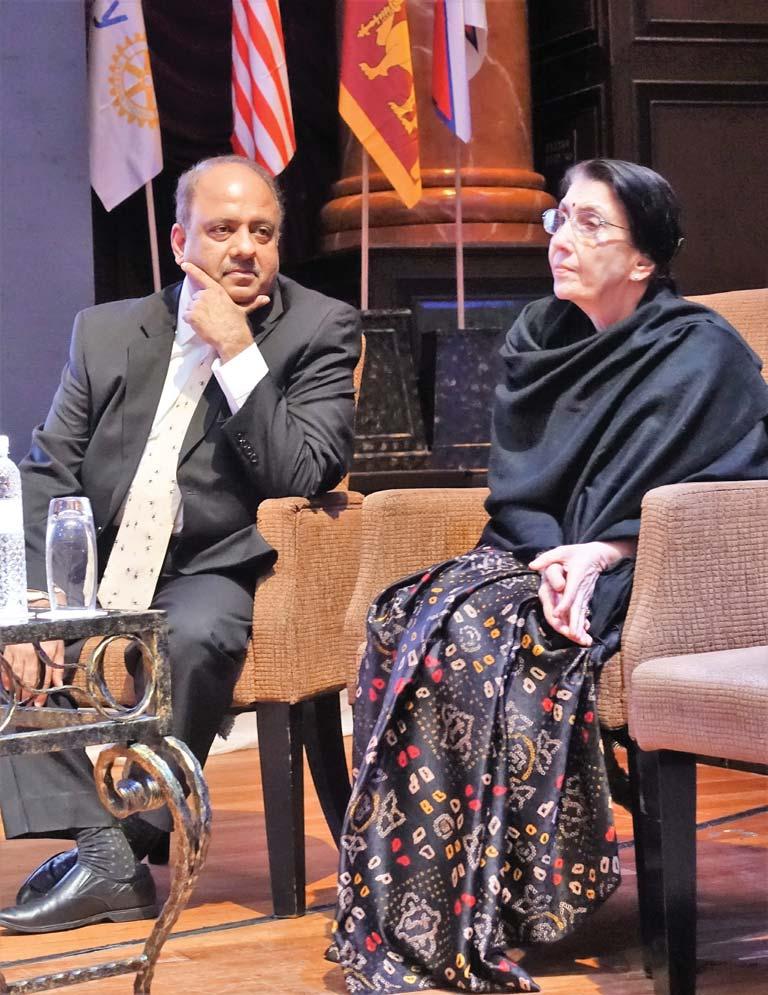
lives and in turn transforming my own life completely”.
She says the couple is often asked why Africa when there is so much need in our own country. “But we go to Africa because Raja (Saboo) and I feel that as Indian Rotarians we should contribute to world understanding and peace in this special way.”
She has never looked at these medical missions in terms of the number of operations done as they “are real people who are suffering and need our care. For us, more important than numbers is each surgery becoming a life changing experience not only for the patients, but for their whole families.” Complimenting the Indian
surgeons participating in these medical missions, she gave the example of a 3-day-old infant in Malawi, born with his intestines protruding outside his stomach, and who the local surgeons had refused to touch. “Our surgeons readily performed the delicate and difficult surgery and the child is hale and hearty.” There was the Ethiopian man blinded by cataract in both eyes who could not lie down for surgery because of a severe spine defect. Indian surgeons restored his vision, operating on him in a sitting position and “through another difficult surgery, corrected his spine defect also. You can imagine his and his entire family’s happiness. Such surgeries are done in
On the other side of 82, I am neither tired nor retired. Strength comes to me by holding the hand of my Rotarian husband and serving humanity. We have many more milestones to reach, many more lives to touch.
each medical mission and they make beautiful soul-stirring human stories making our work rewarding.”
Maintaining that no act of service is ever too small, Usha said “it touches the heart of both the giver and the receiver. After seeing the badly torn and disfigured faces of the genocide victims in Rwanda, I am no more conscious of the leukoderma patches on my face and body. I count my blessings realising how fortunate I am to have a healthy body.”
In these medical missions, she had seen the “true spirit of Rotary”; they offered “no luxuries, comforts and sometimes not even necessities. Here our strength gets tested; we volunteers travel at no cost to Rotary, but Rotary gives us an invaluable reward — the opportunity to serve and become the citizens of the world.”
She concluded by saying she couldn’t have even dreamt of doing all this without being a Rotary spouse “for over half a century. On the other side of 82, I am neither tired nor retired. Strength comes to me by holding the hand of my Rotarian husband and serving humanity. We have many more milestones to reach, many more lives to touch. So many children with heart ailments, sightless elders, women with torn genitals, so many polio victims are awaiting us.”
Pictures by Rasheeda Bhagat
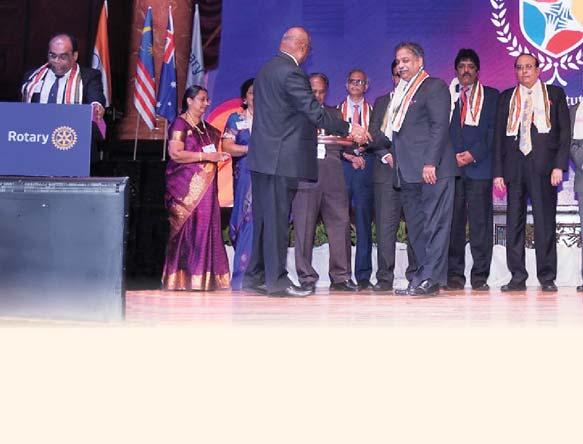
t the Kuala Lumpur Zone Institute RI Director C Basker announced that the next Institute will be held in Chennai from Oct 5–7. PDG ISAK Nazar will Chair the Institute. The event will be held at Hotel Leela Palace, one of Chennai’s iconic hotels and the metro’s first Leela property, where Chettinad architecture and opulence come together to create an aura of regal splendour.
The key people behind the next Zone Institute, for which a record 210 registrations were done in KL itself, are:
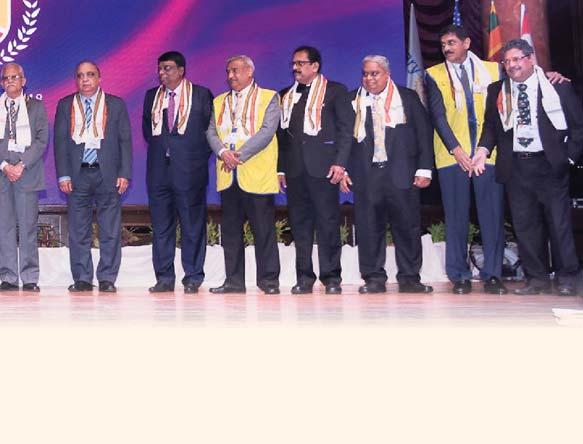
Convener RI Director C Basker
Chairman PDG I S A K Nazar, D 3232
Secretary PDG Dr N Subramanian, D 3011
Treasurer PDG P T Ramkumar, D 3232
Vice Chairman PDG G Olivannan, D 3232
Joint Secretary PDG Natarajan Nagoji, D 3232
Registration Committee Chair: DGN G Chandramohan, D 3232
Venue and Accommodation Chair: DG R Srinivasan, D 3232
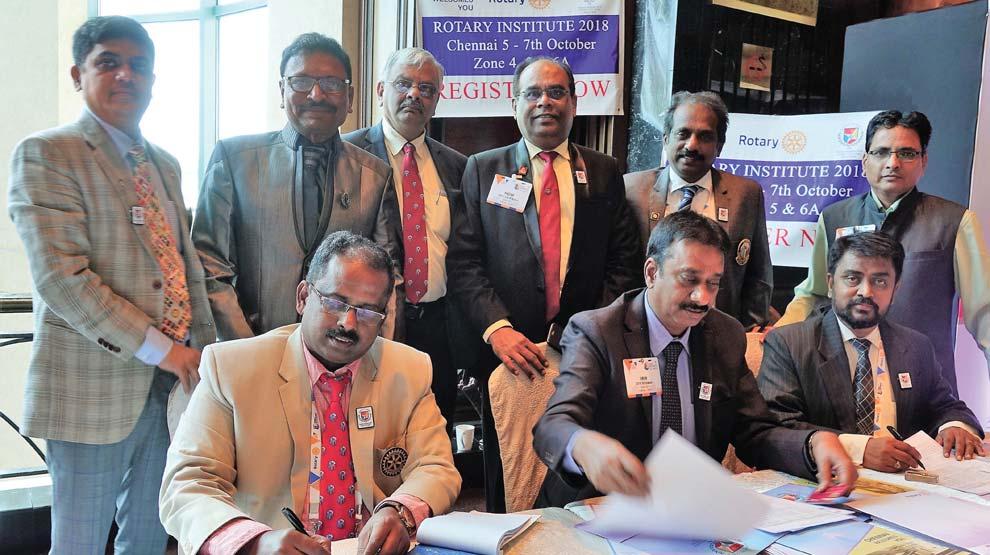
Top: PDG ISAK Nazar introduces the Zone Institute 2018 team. From L: Mala Baskar, Afzalunissa Nazar, DGN G Chandramohan, PDGs N Subramanian, Krish Rajendran, PRID P T Prabhakar, PDGs R Raja Ramakrishnan, Ranjit K Bhatia, R Theenachandran, Basu Dev Golyan, Guddati Viswanadh, Bhashkumar Rajan, Sam Patibandla and Natarajan Nagoji. Also seen: RID C Basker greeting PDG Vinod Bansal; Above: (Standing from L) PP D Dev, PDG V Ravindran, DGE C R Chandrabob, PDG ISAK Nazar, PP G Balasubramaniam and DG Vyankatesh Vittal Channa. (Seated from L) PP A Shankaran, DG R Srinivasan and PP D Vijayakumar at the registration counter in the KL Institute.

As he stood before the group of DGEs and their spouses, he was filled with “utmost positivity. I can see a new surge of energy which will enable you to handle the job of leadership with your personal commitment of action, sincerity, beliefs, values, and most of all, objectivity,” said Past RI President Rajendra Saboo, addressing a GETS plenary session on the topic ‘Ignite the leader in you’.
As the “future custodians of leadership” in their districts, each of them would do well to remember the Olympics swimming legend Michael Phelps’ reply when asked if he would become the second Mark Spitz, the top record holder till then. Phelps replied: “Mark has been an all time great but I don’t want to be the second Mark. I would like to be the first Michael Phelps.” He was sure Virat Kohli would say the same when asked if he’d like to be the second Sachin Tendulkar.
Similarly, each of the incoming governors could scale a new height in Rotary not by “sitting on the shoulders of others, but standing tall on your own feet”.
Coming to the essence of leadership, and its genesis, Saboo said one theory was that some people are born leaders. “If you are one, I will bow before you because I am not.” The second theory is that leaders are created by catalytic events, such as M K Gandhi being thrown out from a firstclass compartment in South Africa despite holding a valid ticket. Had that not happened, perhaps he would have remained just a lawyer, without getting transformed into the Mahatma who gave us Satyagraha.
The third theory is that everybody has dormant qualities of leadership, which surface once the dust is cleared, said Saboo, offering the class of 2018–19 ten points to mull over.
Think positive. Just as Thomas Edison did after failing 38 times, but never giving up. Rather than saying “I can’t, if you believe that you can, I bet you will,” Saboo said, while giving an example from his own life. When he was nominated RI President, his son Yasho joined
as Managing Director in their German joint venture. But his father’s absence from the scene caused a tussle with the German partners, even court cases.
“It was one of the most difficult periods in my business and I even thought of resigning from RI Presidentship. But I was back in my elements after I talked to my son. He was firm and positive in his attitude. He was like a raw iron that was put in a furnace and came out as perfect stainless steel. Today, he is heading the biggest watch
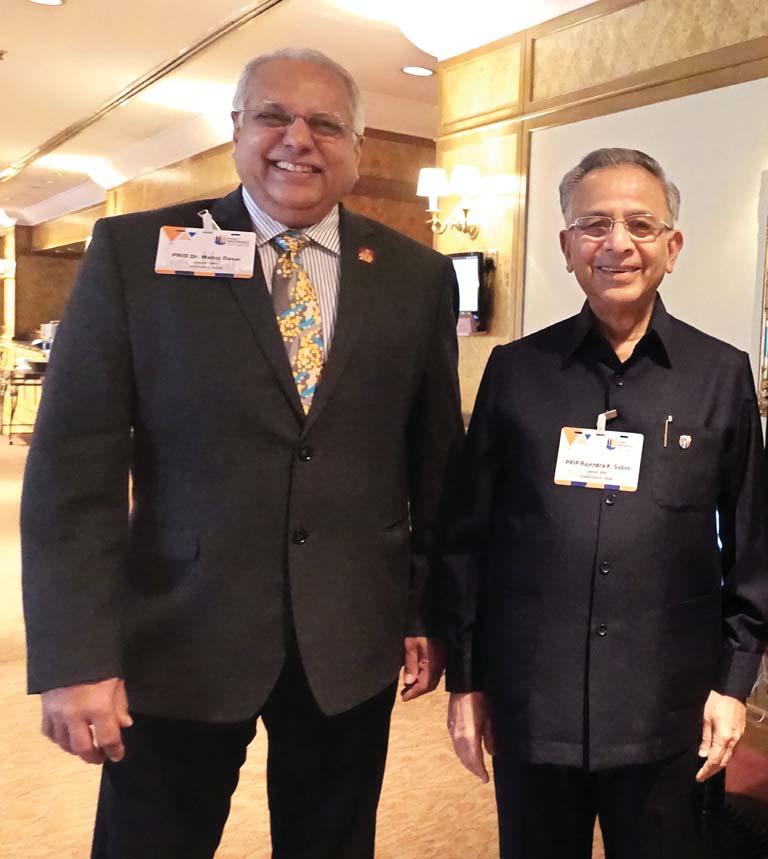
conglomerate in India. All because he never lost his positivity. So when you have a cause or an objective, the leader in you awakens; your winning card is positivity and objectivity.”
Don’t think of positions. Just as Tribhuban Dass Bhai had not aspired to become the chairman of the newly formed milk cooperative AMUL, in Gujarat, many decades ago, leading Morarji Desai to give him the mantle. And he went on to serve the milk producing farmers of Anand with distinction for long years. True leaders don’t aspire for positions.
“I do not call myself a great leader,” Saboo said, adding he was reluctant to take roles such as club president and later district governor. But when he did become a DG, some people told him that the next July he would become a nobody. To which he answered that as he had no plans to put himself on a
pedestal, such a catastrophe wouldn’t ever happen. “So don’t be obsessed with your position; a good leader is made through his work.”
Add value to yourself. For this, the first requisite was an impeccable character. “Superficiality does not work. People are not fools, they see through us just as we see ourselves in the mirror and know what is inside.”
Poison called populism: Next, the district leaders should imbibe the true values of Rotary, which “teaches us to be kind, thoughtful and a role model to your children and other Rotarians.” Populism was a poison best avoided and the right path, however tough, selected.
Integrity: Rotary advocated high ethical standards in business and professions, and this was one of the foundation pillars on which the Rotary edifice rests. “You
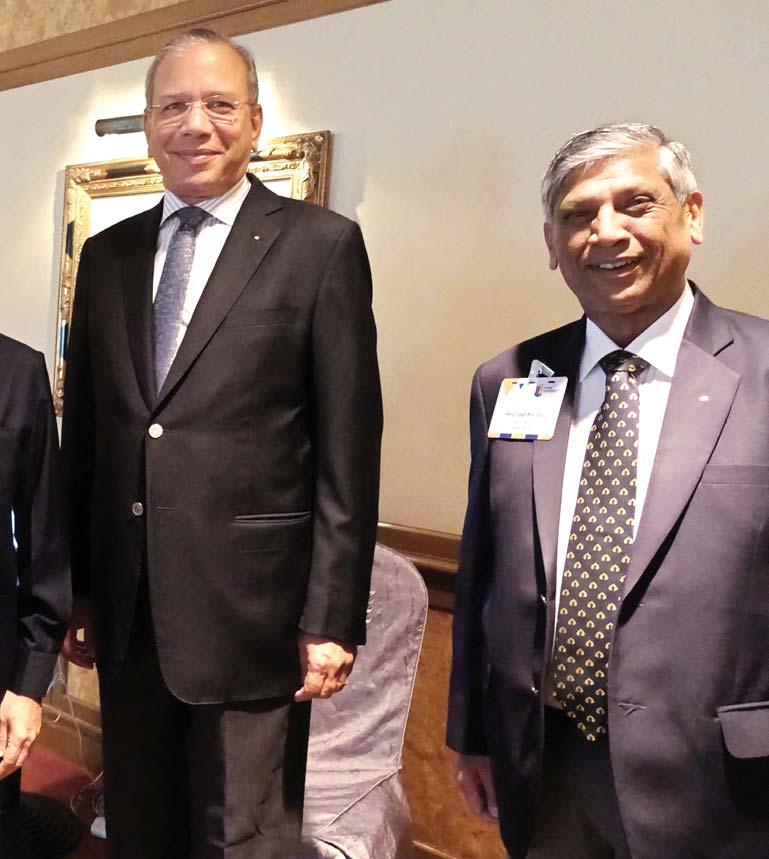
Never compromise with the values you cherish, the principles you live by, the ideals of the organisation you’ve adopted. Have the courage to stand up and speak against the evil that you see.
will be the custodians of this pillar and have to ensure it does not get weakened.” Again, delving into his own experience, Saboo said in his business partnership with the Germans, he had their total confidence and it wouldn’t have taken much effort to copy their high-end specialised machines and start a parallel needle factory of his own. “But I did not abuse their confidence and I have never regretted my stand on integrity.”
It was well known in investment circles that “ethical bankruptcy precedes financial bankruptcy”. Satyam’s Ramalinga Raju was a good example of what happens when you throw integrity out of the window.
Think big, act big. A leader should always think beyond the immediate present. “Many times we think of the food, the programmes, time management, etc, at conferences and we complain. That is not leadership,” Saboo said, giving the example of PRIP Clem Renouf from Australia who had the vision to make the world polio-free, and he galvanised the whole Rotary world to work for this dream, which is now on the threshold of being realised. There have been some great new ideas, such as literacy, shelter boxes, medical missions, water projects and others.
Big thinking, clubbed with immediate response, gets great results, such as happened in building schools after the Uttarakhand disaster and the tsunami in Sri Lanka and villages after the Gujarat earthquake.
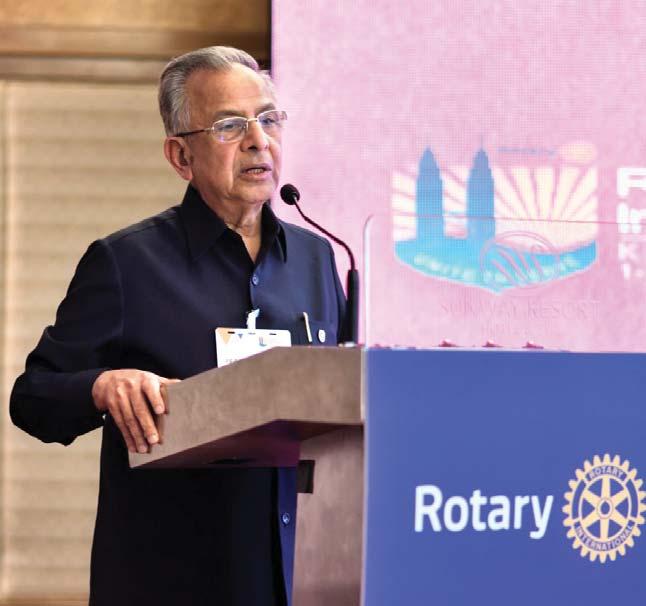
Choose your team wisely. As DGs they would have to choose their teams wisely, without giving “important positions to those who helped them in the election. Just as we would, in our business or profession, keep out sycophants from plum positions in exchange for favours done. Get the best people for the job because they will become your permanent support and help you achieve your goals.” Great plans would fail without the right people to execute them, Saboo said. Once the right team was chosen, “you must stand with them as part of the team as its captain, not because you are the best but because you are a part of the team where all the players are the best.”
Saboo then gave the example of the DG he had succeeded — late R K Berry, who compromised some principles to support a particular candidate, not fit for the role, for governorship. “He later told me: ‘Raja I have gone through hell. Be straight and you will be happy at the end of your year.’ ”
Get yourself out of the way. A good leader should get her aspirations, ego
and above all, stupidity, out of the way, said the former RI President. Many a times at the International Assembly, he was pained to see many governors-elect “desperately wanting to meet the next RI President, not their own President. The reason is very clear. They are already looking for assignments once their year is over. When you have that objective, you are misguided at the cost of your own performance in the district.” He then gave the example of Socrates who would take on as his disciples only those who saw fish in the pond against those who saw only their own reflections.
Flexibility and firmness: Another great tool was to be strong but “by being soft and flexible rather than inflexible, brittle and hard”, just as an ancient Chinese philosopher had advocated. “Friends, all things, including grass and trees, are soft and pliable in life; dry and brittle in death. The hard and stiff will be broken; soft and pliable will prevail.” But, he put a caveat, the flexibility should not mean any compromise with the “values you cherish, the principles you live by, the ideals of the organisation you have adopted. Have the courage to stand up and speak against the evil that you see. If you don’t, you will be collaborating with it. Integrity, honesty, dignity, sincerity cannot be redefined.”
You can be wrong. Another principle to remember was that one can be wrong and saying “I am sorry” would go a long way in raising both one’s own and the other person’s self-esteem.
Walk the talk. He illustrated this point with an apt message from the children of a school he manages. They told their teacher: “Our parents complain that we don’t listen to them. Ma’am, please tell them that we are always watching them.” Similarly, please remember that other Rotarians may not be listening to you but they are always watching you… “and me, and all others, particularly those who are rising up in positions in Rotary.”
He concluded by leaving them with two thoughts; ensuring quality — “in your own conduct, your team, planning, conference, membership, whatever… make quality your character.”
When I became district governor, my wife Usha said: ‘God you have made my husband governor; now give me the power so that I can keep him humble!’
The second message was particularly directed to the spouses in the room and was on humility. Saboo recalled that when he became district governor his wife Usha said: ‘God you have made my husband governor; now give me the power so that I can keep him humble!’
Pictures
by Rasheeda Bhagat





Jaishree
Two spiritual gurus, Mahatria Ra and Swami Sukhabodhananda, energised delegates.
If you have to achieve a target of 1.25 million members in India by 2025, introduce Rotary to at least 15 million educated Indians. Instead of playing the National anthems of various countries in conventions, play one ‘Rotary anthem’.
Shrink the agenda, instead of speeches, have dialogues.
Talk Rotary to non-Rotarians.
These were some of the suggestions made by Mahatria Ra, philosopher and founder of Infinitheism. “I see so many elite Rotarians scrolling the screens of their mobile phones… some even sleeping and whenever they wake up, the speech is still continuing.” Commenting on the speakers focusing on retention of members, he said club presidents should dedicate at least one weekly meeting to ‘purely listen’ to their members. Everybody has an idea, everybody wants his/her voice to be counted… heard. “Unfortunately, we don’t have a forum where we can learn from each other, we are not leveraging collective intelligence. There is lot of focus on inviting speakers but hardly any thought to listen to the challenges club members face. When you give your team that opportunity to be heard, it will create a lot more attachment. Then you can retain your members,” he said.
Rotary events must invite nonRotarians to give them a first-hand
feel of the organisation. Otherwise, it is like the Vegetarian Congress where all vegetarians are invited, talk on vegetarianism to vegetarians, all vegetarians will applaud the goodness of vegetarianism and after the convention all vegetarians will remain vegetarians and all non-vegetarians will continue to remain non-vegetarians. Shouldn’t a Vegetarian Congress invite non-vegetarians? Even if one could be converted there would be some achievement. “I think outsiders like me should hear a lot more about the good work of Rotary, rather than Rotarians talking to Rotarians about Rotary.”
His list of templates for a successful life:
Go into any relationship with what you can give, not what you can
receive… because that puts you at the mercy of somebody. It need not be material. A pat on the back at the right time is all it takes to make a difference. He said that while the senior leaders were walking into the hall, he watched PRIP K R Ravindran waving at people and inviting them to join the procession. “I know Rotary has very strict protocols, but by this gesture, he made them smile, recognised and feel included. A small gesture and that’s all it sometimes takes to make people feel special.” Let problems come from anywhere, solutions will come from you for a complaint-free Rotary in India, as the solution lies only with you. Don’t over-dwell on the problem, invest less than 10 per cent on the
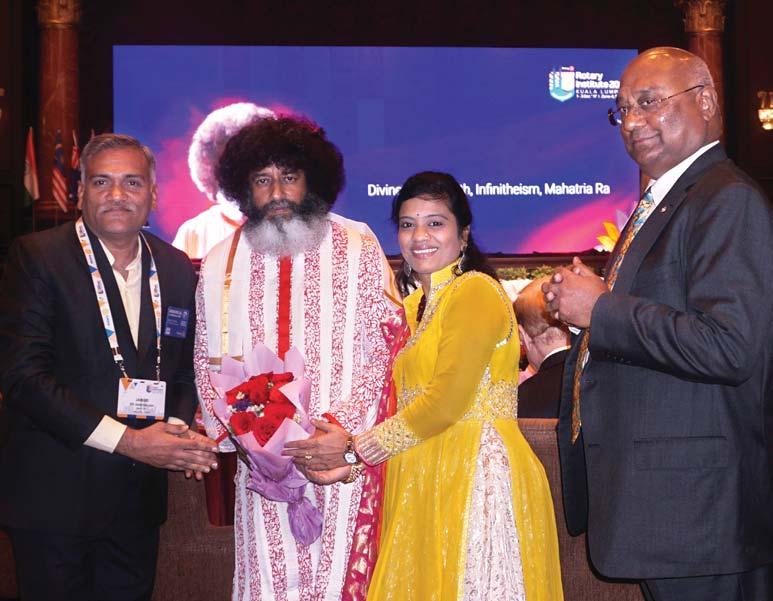
problem, give 90 per cent of your intelligence to finding the solution. The question is not from where to where; the question is from here to where? Do not sit on your past laurels and glory. Yesterday’s success does not need today’s applause. At some stage tell yourself that this is the new zero. Referring to the number of polio cases today, he said, “16 is the new zero. It is fantastic to know that 350,000 has come down to 16, but let’s work to bring it down to 12, and from there to zero. Planting one million trees is not a project, growing them is the project. You can plant so many trees; take pictures, get awards. But next year when you go there, half the trees are not there. Start a project that the next three presidents can take forward.
Bigger the goal, stronger the motivation. Nobler the ideal, greater the
If you really ‘see’ around you, you will realise that there is so much to give. Real seeing is absorbing the situation and environment, rather
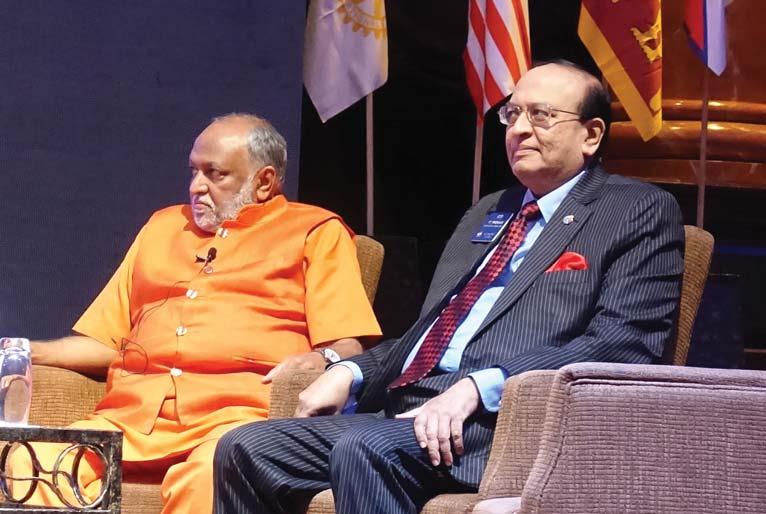
inspiration. Higher the altar, deeper the surrender. When we all come together as one team, we motivate each other and inspire others. If you do not have a strong enough ‘Why’, you cannot inspire others. Focus is not only the ability to say ‘Yes’ to the one, but also the discipline to say ‘No’ to the remaining 99. Don’t crowd too many projects. When you take over as a DG or president you will be tempted to take as many things. But remember giving your 100 per cent to 10 projects is better than giving 10 per cent to 100 things.
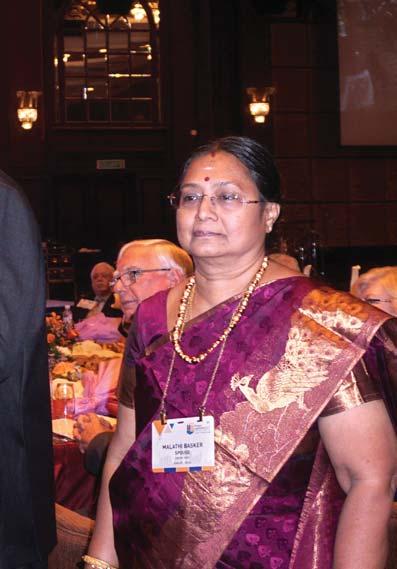
We’re technologically savvy, but the consciousness still remains a beggar,” observed Swami Sukhabodhananda, speaking on the theme, Unite to give. Weapons of mass destruction have increased, nations are more organised in destroying each other, but is this growth? He asked, pointing out that compassion and empathy are the need of the hour to set right a world filled with greed, corruption and hatred.
“Patthar ek baar mandir jata he aur bhagwan ban jata he; magar
insaan baar baar mandir jaakar patthat hi rehta hai. Mandir aur masjid kya gazab ki jagah hai… bhikari log bahar mangtey hei aur amir log andar mangtey hei,” he thundered.
If you really ‘see’ around you, you will realise that there is so much to give. Real seeing is absorbing the situation and environment, rather than superficially seeing things. You’ll understand that giving is actually expanding. Learn to respond and not react. Give with a smile.
Sukhabodhananda had the audience engaged with intermittent jokes and humorous examples illustrating his points. Talking about waiting for the right time to do good, he said, “Why wait for a conducive situation, it is all in the mind.” The hall reverberated with laughter when he recited an Urdu poem: As a bachelor, a man said, Takdir hei magar kismat nahi khulti; Taj Mahal banana chahta hu, magar Mumtaz nahi milti. When he found a girl, he said, Takdir hai magar kismat nahi khulti, Mumtaz mil gayi hai, magar Shadi nahi karti. After marriage, he wailed: Takdir hai magar kismat nahi khulti, Taj Mahal banana chahta hu, Magar Mumtaz nahi marti!
Give happily; live positively; love abundantly… were the other thoughts he left the delegates with.
The session was chaired by PRID P T Prabhakar.

Rasheeda Bhagat
Your year (2018–19) as Governors will be the second year of the second century of The Rotary Foundation and the opportunities we have before us are amazing because what we have been able to accomplish in 100 years of our existence,” said TRF Trustee
Chair Paul Netzel, addressing a plenary session of GETS at the Kuala Lumpur Zone Institute on the topic “Ushering in a new century”.
Unveiling some spectacular figures, he said during the last 100 years of its existence, Rotarians have raised, given and invested $4.1 billion. “Just imagine what an incredible amount
this is… it is unbelievable. In 2016–17 our Centennial year, when Kalyan Banerjee was the TRF Trustee Chair, we raised $304 million, a record number, and all of you (from India) were a critical part of it. If we now look at $300 million a year as the minimum threshold, over the next 100 years, just imagine what we can do.”
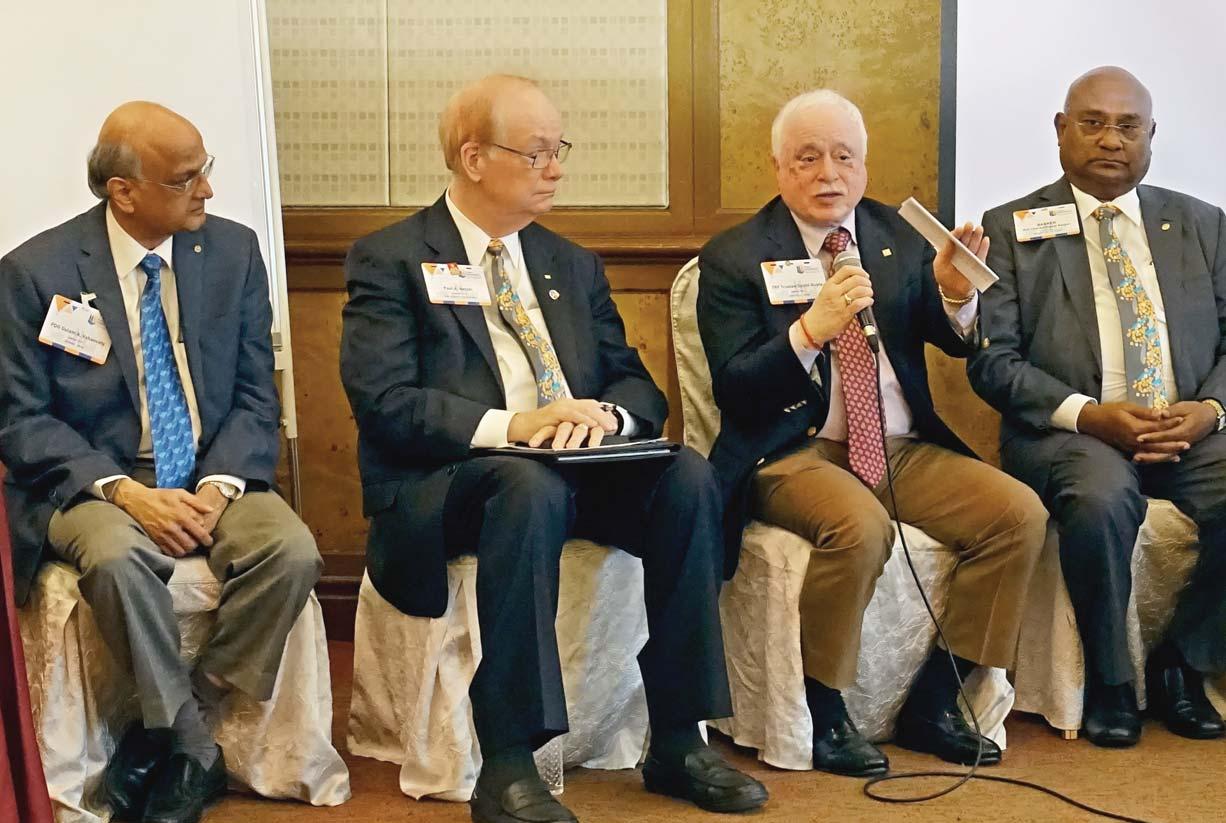
Saying what he was doing was akin to a Google Earth look at Rotary and TRF, Netzel said that this batch of DGEs, when their term begins in July 2018, would also have to take such a view in their districts.
During the TRF Centennial, he added, Banerjee had introduced the concept of a comprehensive fundraising goal, and this year he had set that goal at $360 million. The proposed goal for 2018–19 would be disclosed at the International Assembly in San Diego by the incoming Trustee Chair Ron Burton. “A comprehensive fund raising goal is important because it is more than the annual fund and polio put together. For years we just talked about these two, which are both important, but in recent years we have become more sophisticated.”
Other areas are becoming important too and at the beginning of each year these are identified, a strategy
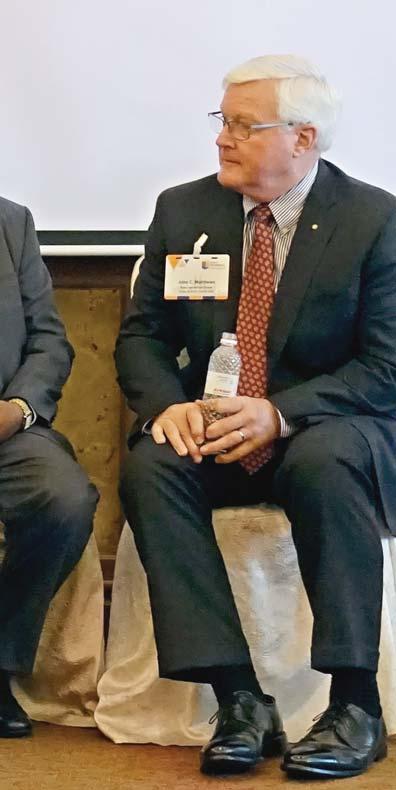
developed to raise funds and the goals achieved.
Looking at the big picture, the Trustees have also adopted another goal and developed a programme — building The Rotary Foundation Endowment 2025 by 2025. “This means we have a goal to raise $2 billion and $25 million by the year 2025. And when that happens, we want to have a minimum of $1 billion cash to be invested at that point of time with another $1 billion $25 million in what we call legacy commitments.”
Giving a status report, Netzel said on October 31, TRF had an endowment fund of $1.1 billion; “one third of that is in what we call gifts and commitments, fulfilled pledges, payments, cash in the bank and invested — $420 million dollars. The other two thirds of the money is in what we call legacy commitments — State gifts, commitments, life insurance policies and donors who have made a commitment payable at some future date. So technically, we are almost half way to our goal of $2025 million by 2025.”
The Trustee Chair said that when this money is eventually raised and invested, it will produce an estimated minimum returns of $100 million every year in perpetuity to be used in the work of TRF.
Isn’t this what Rotary is all about; “turning dreams into reality. As we usher in a new century, as governors, directors, trustees, club presidents… we all need to have dreams, and our job as Rotary leaders is to turn dreams into reality,” he said.
Netzel added that he had visited India a number of times and “I never leave without feeling the energy, the excitement and the possibilities that you are constantly looking at and addressing all the time. You are so blessed to live in an area of the world where the needs of the people are among the greatest. And with the leadership that your senior leaders, such as Director C Basker
We have a programme to build The Rotary Foundation Endowment 2025 by 2025. The goal is raising $2 billion and $25 million by the year 2025!
provide, you more than rise to the occasion to address the challenges in your country, utilising the opportunities that you have.”
On the coming years and where TRF was headed, Netzel said in the last 100 years many lessons had been learnt and these were being dissected while planning the way forward. And the DGEs would have to do the same in their districts and clubs. One lesson learnt in Evanston during the last five years, and articulated too, was that “Rotary is one organisation. I have heard many different definitions of what ‘One Rotary’ means. I believe it represents three basic elements - clubs, RI and the Foundation.”
Another lesson learnt over 30 years and through polio is that partnerships are important to serve the community. “And you are the glue that connects all these little pieces. You represent Rotary on the ground through the clubs, and with both RI and TRF. This is what makes your role so important.”
In the coming years two important themes were peace and partnerships. Peace was crucial if Rotarians and the rest of the world were to address critical issues and eliminate illiteracy, disease and bring in economic development over the long term in the world. “So we want to reposition the concept that all our six areas of focus are elements that lead to positive peacebuilding, and hence the Rotary Peace Centres programme was launched in 2002, through seven Universities and six centres.”
“We have 1,052 Rotary peace alumni out in the field in 100 countries
and perhaps it is time to identify them. We have a future planning committee, led by Past President K R Ravindran, at work for the last 12–15 months looking at what we’ve learnt through the Rotary Peace Programme since 2002, and we’ll have a report coming to the Trustees in January at San Diego.”
He was certain this committee would propose some exciting new things that would hit the ground during their year as DGs. “We want to see the big picture on what we want to be by 2030 and are looking to evolve some exciting partnerships.”
Netzel added that Indian Rotarians held a position of pride in the fight to eliminate polio from the world. Except for two countries… only 16 cases of polio had been reported; 11 from Afghanistan and five from Pakistan, the world was polio free. “Just imagine; we were having 1,000 cases of polio a day in 1988; 350,000 a year, and have had only 16 this year. We are on the cusp of seeing the last case of polio and there is a strong probability that your batch of governors will be the first in the world to have no reported cases of polio. Think of that. Polio goes back 5th or 6th century BC… it goes back that far.”
But to have a year with no reported cases brings its own responsibility as it will take another three years from there to get the world certified polio free. But the task is not over till then. “I know many of you in India, after eliminating polio, have moved on to other things. And that is human nature and how we Rotarians are. We are entrepreneurial; give us a job and we’ll get that done and we’ll move on to new things. But the task is not done till 36 months of no new cases, so let’s stay focused with the same level of energy and emphasis to ensure that 400 million children are immunised in the 60-odd countries that need help.”
Banerjee’s leadership
Later at a session on the Foundation, TRF Trustee Sushil Gupta recalled how during the TRF Centennial year, when Kalyan Banerjee was Trustee Chair, “we had a number of discussions on what our goal should be for the year and Kalyan (Banerjee) finally said: ‘Well, this is my comprehensive goal — $300 million. And everybody was taken aback but then we realised that we are talking comprehensive goals and we are talking about the Centennial year. Another
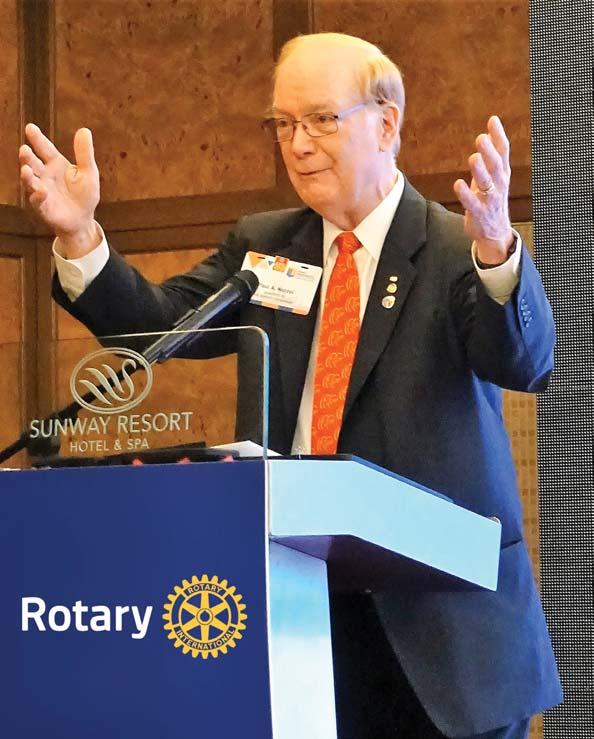
one will come only after 100 years, so we need to have a special goal.”
Gupta said while last year $300 million was considered “a special goal, look at the beauty of it, after we achieved $304 million, Trustee Chair Paul (Netzel) has set the goal for this year at $360. And nobody raised any questions. That proves that once you raise the bar high, you keep raising it higher and higher. Thank you Kalyan (Banerjee) for your great leadership.”
Next big project?
During the last 100 years of its existence, Rotarians have raised, given and invested $4.1 billion. Just imagine what an incredible amount this is… it is unbelievable.
TRF Trustee Chair Paul Netzel
Next, added Gupta, came a very interesting discussion between the Trustee Chair, Past President and TRF Trustee K R Ravindran and RI President Ian Riseley on what would be Rotary’s next major project. “The conclusion was very clear that the
Rotary world is not ready for a project that will take another 30 years and cost us billions of dollars. But at the same time we all have to keep looking. Where would Rotary be if we didn’t have a polio eradication project and its success story behind us? Could we raise the kind of money we are raising? The answer is no. So you need a project… the process is already on, it could be a project of scale from our six focus areas; it could be regional, continental, what it is going to be is anybody’s guess. But whatever we decide will be measurable and achievable.”
KL Institute Chairman R Theenachandran welcomed the gathering and Secretary Deepak Shikarpur gave a vote of thanks.
Pictures by Rasheeda Bhagat
V Muthukumaran
Teamwork came to the fore when all the 68 Rotary clubs of D 3231 participated in a mega car rally to mark World Polio Day on Oct 24. DG K Jawarilal Jain led from the front as over 1,000 cars took part in the event covering Tiruvannamalai, Vellore, Tiruvallur and Kancheepuram districts, with the respective district collectors flagging it off from their end.
Over one lakh leaflets were distributed along the route and 100 digital banners erected at vantage points to sensitise the public on polio eradication, dengue and Swachh Bharat mission. “While the main caravan passed through 16 major towns, we hired 50 share autos which made repeat trips in villages and small towns to spread the Rotary message,” said A Anbarasu, President, RC Tiruvannamalai Pride.
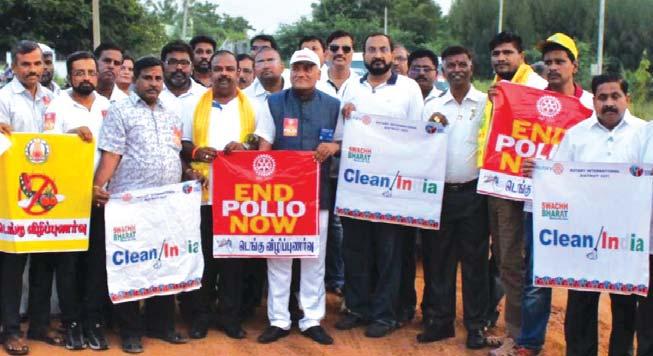
Rotarians with DG Jawarilal Jain (sixth from right).
Nearly 8,000 students from 30 government schools lent support along the thoroughfare. “Rotary is the reason for smashing polio from the beginning and till date. Our vow is to ensure polio-free world,” said DG Jain at the end of the rally.
Randi Druzin
When you’re in Toronto for the 2018 Rotary International Convention, from June 23 to 27, build some time into your schedule to see the sights of this beautiful city. The iconic CN Tower is one of the most popular tourist attractions in Toronto, welcoming about 1.5 million visitors each year. The tower has two observation areas and two restaurants, all of which provide breathtaking views. For the adventurous, the tower also offers a hands-free walk around the outside ledge of its main pod, which is 1,168 feet above ground.
For something easier on the nerves, stroll through St Lawrence Market, which has dozens of vendors

selling food products and specialty items, or the Distillery District, a restored historic area that has been turned into an entertainment and shopping district.
You could also visit Gothic Revival-style mansion Casa Loma. Built in 1914 by a Canadian
multimillionaire, it has almost 100 decorated rooms as well as secret passages and five acres of estate gardens. Once a private residence, the “House on the Hill” is now a museum and hospitality venue.
To enjoy nature, visit High Park — a huge green space with sunken gardens, hanging basket gardens, nature trails, and streams — or take a ferry to the Toronto Islands, which have meadows, woods, lagoons, and sandy beaches.
Register for the 2018 Rotary Convention in Toronto at riconvention.org.

KL Institute
Rasheeda Bhagat
As The Rotary Foundation has begun its second century under the leadership of Trustee Chair Paul Netzel, Past RI President and past Trustee Chair Kalyan Banerjee, who dreamt big during the TRF Centennial to set a goal of $300 million — and surpassed it to cross $304 million — recalled TRF milestones over the last few decades.
Addressing a GETS session at the Kuala Lumpur Zone Institute, he listed the challenges he had to encounter during his year at the TRF helm thanks to his wife Binota having to undergo a second
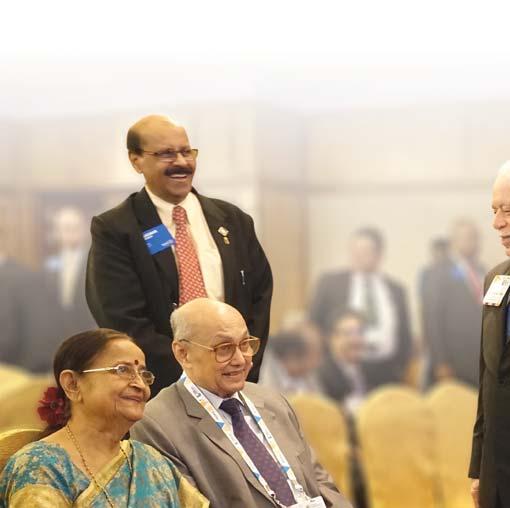
kidney transplant surgery after 17 years. The surgery led to some unexpected problems unconnected with the transplant itself, “which kept her in hospital and kept me running around. At one point, around the halfway mark in January 2017, I had wanted to hand in my papers. But then, good friends like you convinced me that if that happened, the rest of the year, with an unprepared replacement, might go even worse and spoil the Centennial year completely. And so, I stuck to the job and everyone around the world rose to the challenge.”
On the eve of the Atlanta Convention, a clear
picture emerged; “thanks to the generosity of Rotarians, full support from the staff, and amazing, unexpected gifts pouring in from all over the world, we were able to surpass our goal of $300 million when the Rotary year ended,” Banerjee said.
He said a century back, when RI President Arch C Klumph first proposed an endowment for doing good in the world, “he made a modest proposal that had great consequences. It set in motion a far-reaching
series of events that would transform not only Rotary, but also the lives of millions of men, women and children in every part of the world.”
With a war raging in Europe, 1917 hardly seemed an auspicious time to start raising money. The postwar climate was worse; soon, the market crashed, the world economy collapsed, the Great Depression began, and with World War-II looming, “it wasn’t surprising that Rotarians didn’t rush to adopt Arch Klumph’s
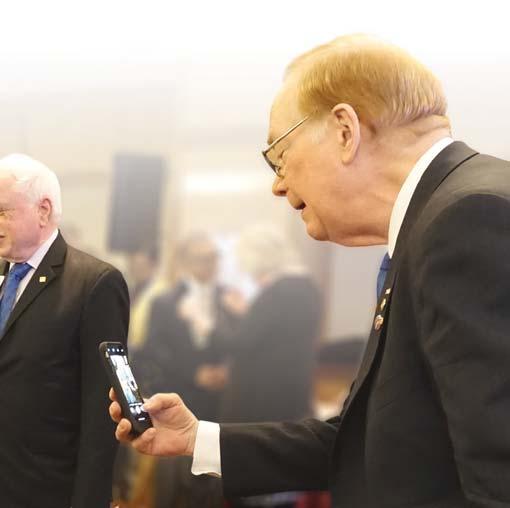


grand idea.” But not easily discouraged, he refused to give up; “it was said of Arch Klumph in 1917 that he was a dreamer of colossal proportions.” But TRF had surpassed even “his most colossal dreams by providing $3.7 billion for its vital projects across the world.”
Banerjee said Rotarians should remember that TRF started with just $26.5 in 1917, which in today’s valuation comes to about $550, “just about enough to buy a smart phone, but hardly sufficient seed money for a Foundation with the ambitious mission of doing good in the world.”
TRF awarded its first grant in 1930 for $500 (about $7,000 in 2017 valuation). “Contrast that with some of our more recent figures. In the 2015–16 Rotary year alone, our Foundation awarded almost $100 million in global and district grants, $4 million for Rotary Peace Fellowships, and $114.7 million for polio eradication.”
While these were all very impressive numbers,
In the 2015–16 Rotary year alone, our Foundation awarded almost $100 million in global and district grants, $4 million for Rotary Peace Fellowships, and $114.7 million for polio eradication.”
the one number that won’t be ever known is “the number of people whose lives have been improved, transformed, or saved through the work of our Foundation,” he added.
Here are some numbers
Banerjee listed:
• 16 million people are walking today who would have been paralysed by polio without Rotary’s Global Polio Eradication Initiative.
• 1.5 million — the number of lives saved by Vitamin A given with the polio vaccine.
• 268 patients received life-changing surgeries during a recent global grant medical mission from India to Rwanda.
• 423,795 people received free healthcare at Rotary Family Health Days in Ghana, India, Nigeria, South Africa and Uganda in 2016.
• 41,850 scholars funded by TRF over the past century. The programme was started “because we believed that time spent studying and living in another country would expand a young person’s world view and imbue him/her with the Rotary ideals of service and tolerance.
• 1,067 graduates of Rotary Peace Centers programmes are today working for peace throughout the world as diplomats, journalists, teachers and even police officers.
Banerjee laced his speech with anecdotes of peace scholars and
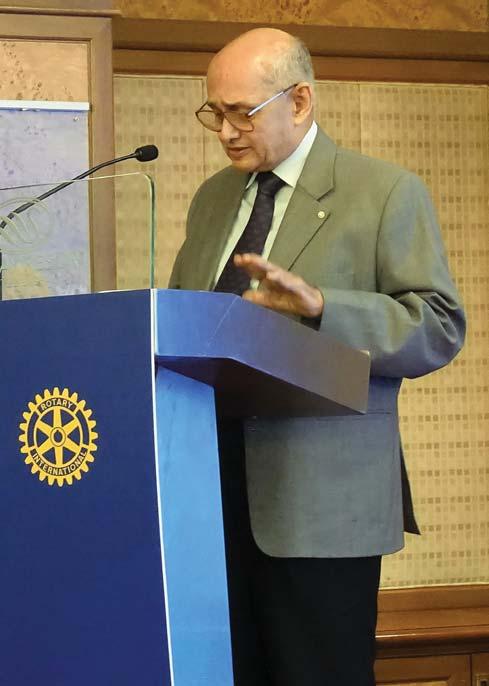
ordinary persons helping Rotary carry out extraordinary projects. Such as Fatima Begum donating her lifetime savings — `85,000 — kept for Haj pilgrimage after her only granddaughter Munni was killed in the Kutch earthquake in 2001 and urging Rotarians to use the money towards the homes they were rebuilding in the devastated city of Bhuj.
Even though Arch Klumph had never told Rotarians how exactly to do good in the world, trusting Rotarians to figure this out themselves, one thing he was clear about was what TRF shouldn’t do. And “that is build monuments of brick and stone. Instead, he envisioned his
creation as a living, breathing entity, one that would, in his words, ‘work upon immortal minds…engraving something that will brighten all eternity’.”
His words had inspired the early Rotarians to build TRF from the ground up: “not in brick and stone, but in lives, health and hope. And his legacy lives on today in every Rotarian who has ever carried out a grant project, hosted a scholar, immunised a child against polio, or made a contribution to our Foundation. And it lives on in the many millions who have benefitted both directly and indirectly from the good we have done.”
Pictures by Rasheeda Bhagat

Highest Total Contribution to TRF3141
Highest contribution to Annual Fund 3141
Gopal Rai Mandhania
Gopal Rai Mandhania
Highest contribution to Endowment Fund 3011 N Subramanian
Highest Per Capita Giving to Annual Fund3141
Highest contribution to Polio Fund 3141
Gopal Rai Mandhania
Gopal Rai Mandhania
Nitish Laharry Trophy Highest Giving to Annual FundGopal Rai Mandhania3141
Binota and Kalyan Banerjee TrophyHighest Giving to Endowment Fund N Subramanian3011
Usha and Raja Saboo Trophy Highest Giving to Polio FundGopal Rai Mandhania3141
Usha and Raja Saboo Trophy Highest Total Contribution to TRFGopal Rai Mandhania3141


Highest Total Contribution to TRF3190H R Ananth
Highest contribution to Annual Fund 3190H R Ananth
Highest contribution to Endowment Fund 3020 S V S Rao
Highest Per Capita Giving to Annual Fund3190H R Ananth
Highest contribution to Polio Fund 3190H R Ananth
Highest Total Contribution to TRF3292Jaya Shah
Highest contribution to Annual Fund3292Jaya Shah
Highest contribution to Endowment Fund 3120Pramod Kumar
Highest Per Capita Giving to Annual Fund3292Jaya Shah
Maximumcontribution towards AKSmembership
3011 N Subramanian
3141 Gopal Mandhania
3190 H R Ananth
3211 John Daniel
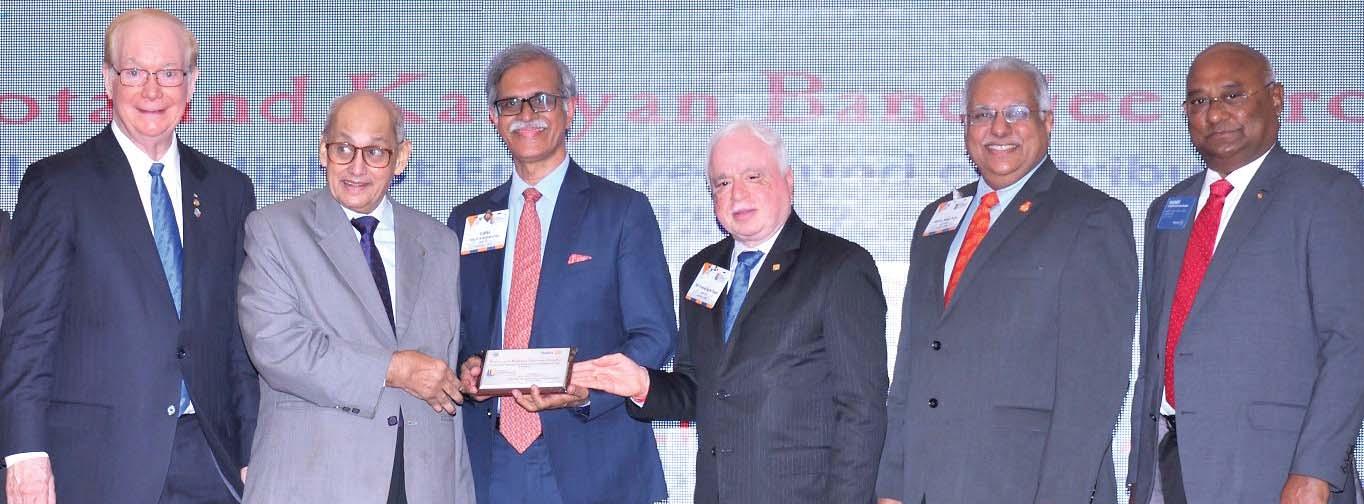
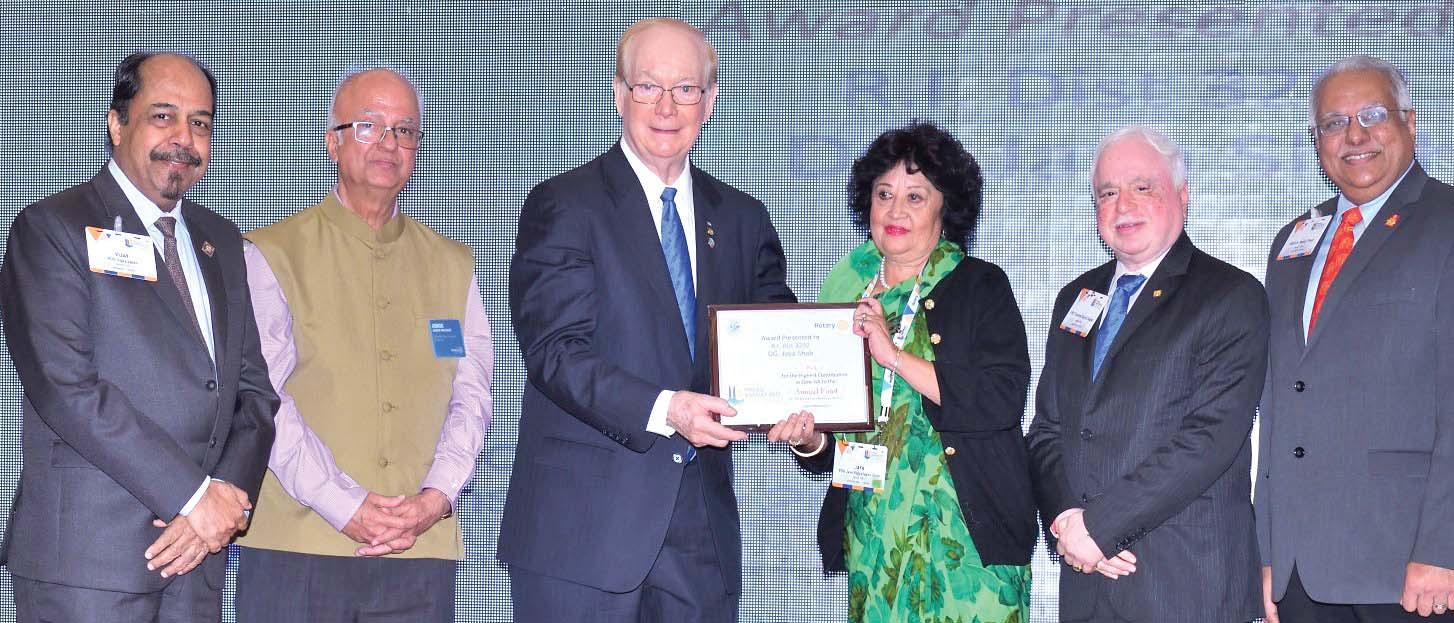


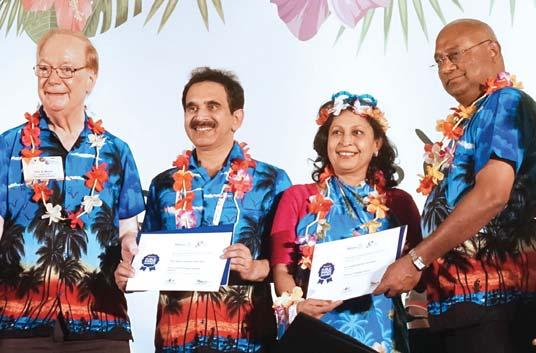
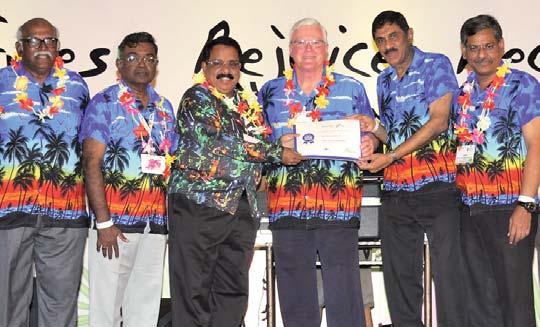
Zone 4
AwardCategoryAwardeesDistrict
Public Image AwardSubramanian N3011
AV Media AwardChandrashekhar Kolvekar3142
Social Media Award Prashant Deshmukh3131
Print Media AwardPramod S Parikh3132
Zone 5
AwardCategoryAwardeesDistrict
Public Image AwardMuruganandam M3000
Social Media Award Vijayakumar K3212
Print Media AwardRao S V S3020
Zone 6A
AwardCategoryAwardeesDistrict
Public Image AwardBrig Narayan Nayak3262
AV Media AwardMajor Deepak Mehta3261
Social Media Award Rintu Guha Niyogi3240
Print Media AwardPramod Kumar3120
Brand Ambassador Award
Zone 4, 5 and 6A
AwardeesDistrict
Subramanian N3011
Gopal Mandhania 3141
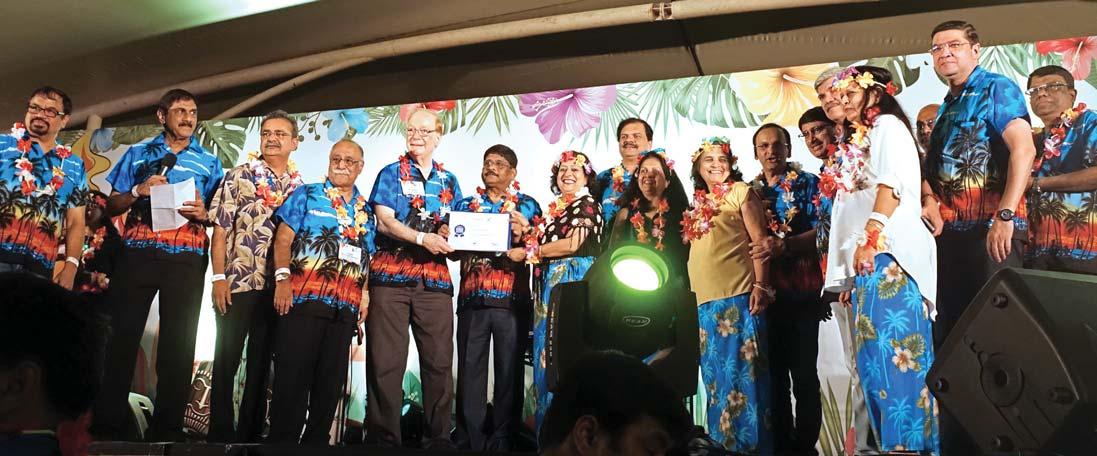
IPDG Prashant Deshmukh and spouse Padmaja receive an award from TRF Trustee Chair Paul Netzel in the presence of (from R) DG Abhay Gadgil, PDGs Vinay Kulkarni, Deepak Purohit, Deepak Shikarpur, Sudhir Rashingkar, Ashish Desai, Sam Patibandla and Rajadurai Michael.
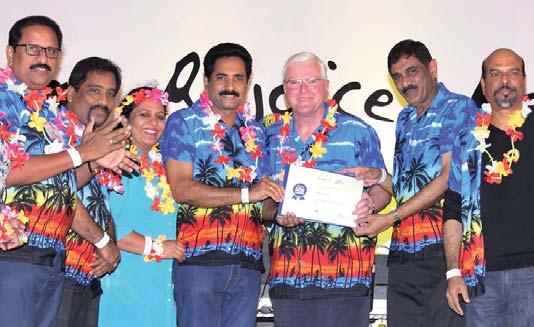
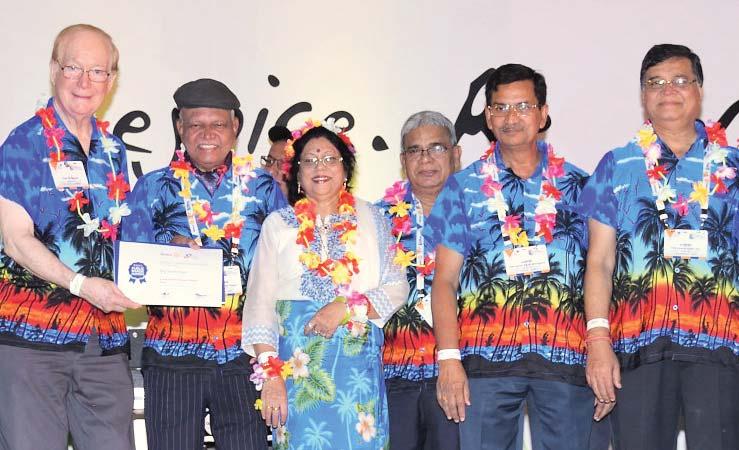


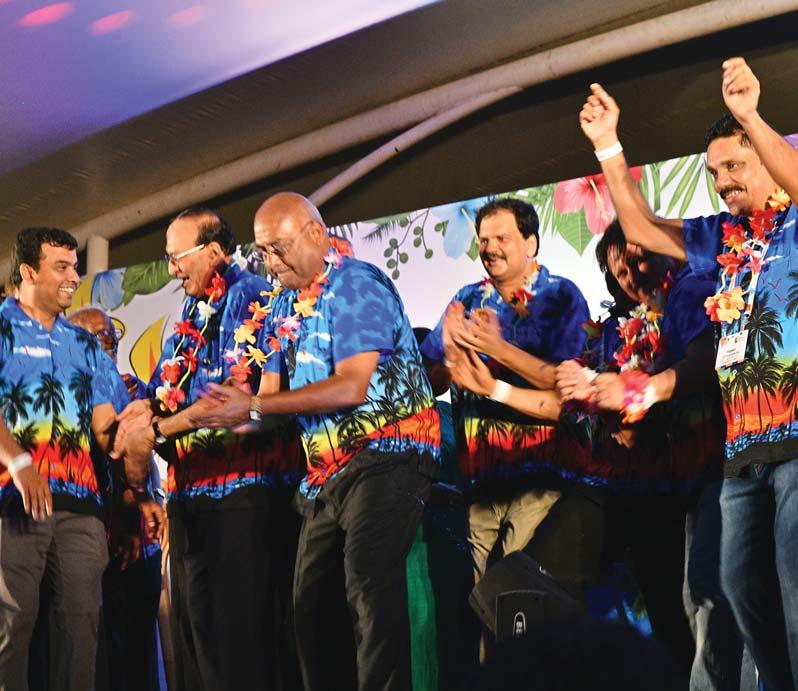
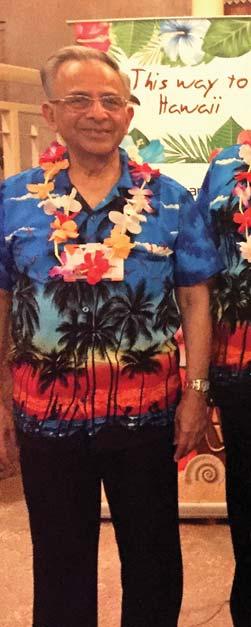
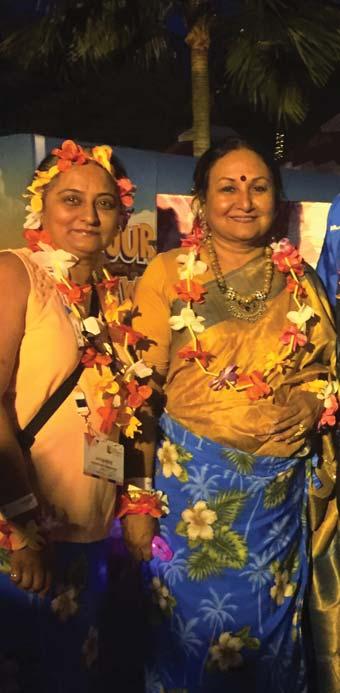


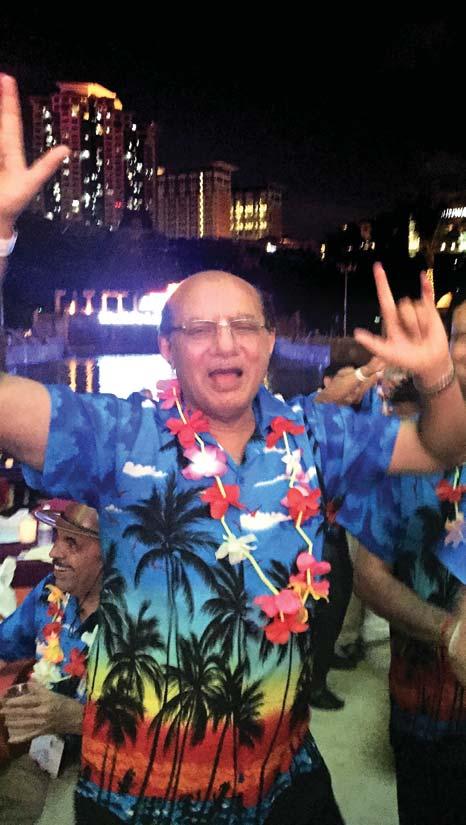
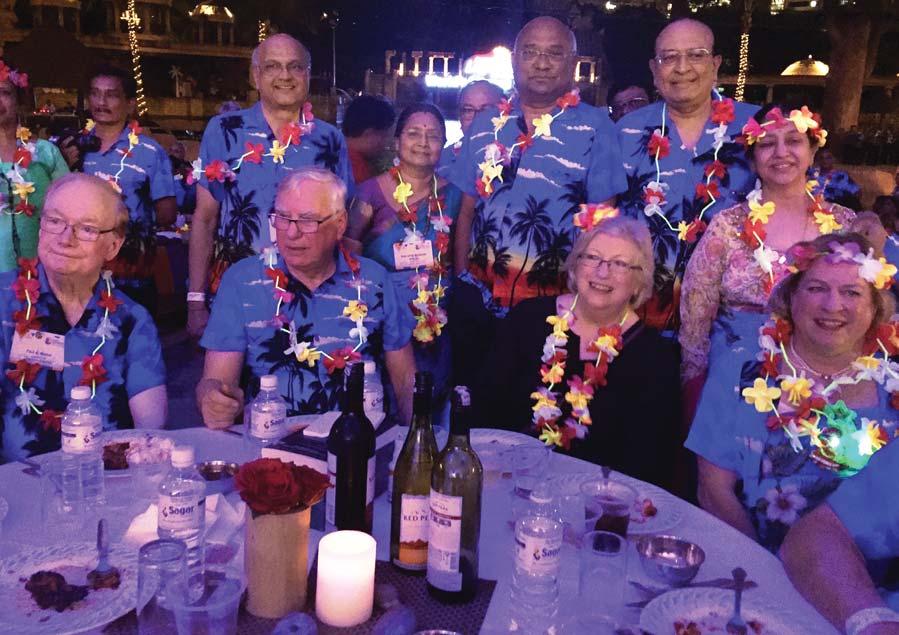

Rasheeda Bhagat
The one person who was the cynosure of all eyes at the KL Institute was Binota Banerjee, the spouse of Past RI President Kalyan Banerjee. Having undergone some trying times after her second kidney transplant, and due to a complication, which Banerjee said was unrelated to the transplant itself, she was returning to a major Rotary event after four years. The manner in which she was literally mobbed, with Rotarians swirling around her, clicking pictures with her, taking selfies and fussing over her, it was obvious what her husband meant when he said: “But then Binota has always held her own in the Rotary world!”
Addressing The Rotaray Foundation seminar, a beaming Banerjee, thanking RI Director C Basker for the special welcome he had arranged the previous evening when the couple arrived, added: “She is alright now; she has lost some of her weight, but none of her chutzpah!”
Sound of drums… but not distant!
Making a subtle reference to music in our part of the world, particularly at public meetings, being louder than of an acceptable decibel level in the developed world, RI President Ian Riseley said in a lighter vein that he was “totally relaxed” about delivering his inaugural speech at the KL Institute. Referring
to the VIP procession that made its way to the hall, accompanied by the heavy beat of booming drums, he said, “I loved the drums on the way in, my ears are just about recovering. But I am totally relaxed knowing that thanks to the sound we heard just now, you can’t hear me anyway, so it doesn’t matter!”
Who said anything about being fair!
One of the most memorable sessions of the KL Institute was “Frankly Speaking”, in which PRIP and TRF Trustee K R Ravindran grilled senior Rotary leaders such as RI President Ian Riseley, Trustee Chair Paul Netzel, PRIPs Rajendra Saboo and Kalyan Banerjee on some no-holds-barred issues. In his
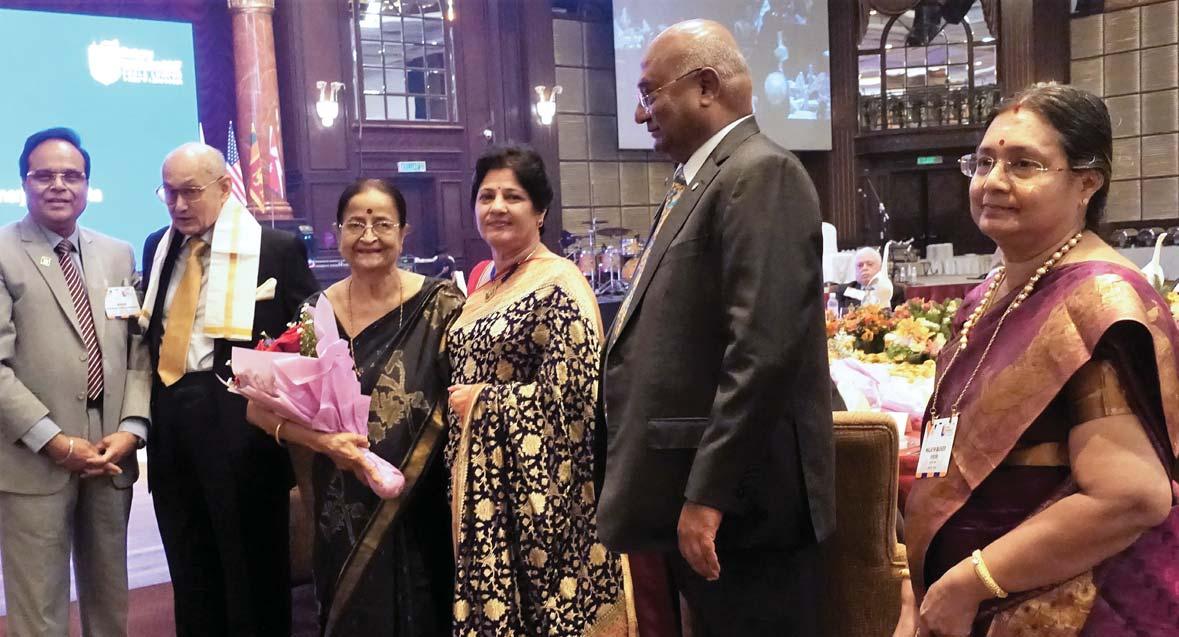
Binota is alright now; she has lost some of her weight, but none of her chutzpah!
Past RI President Kalyan Banerjee
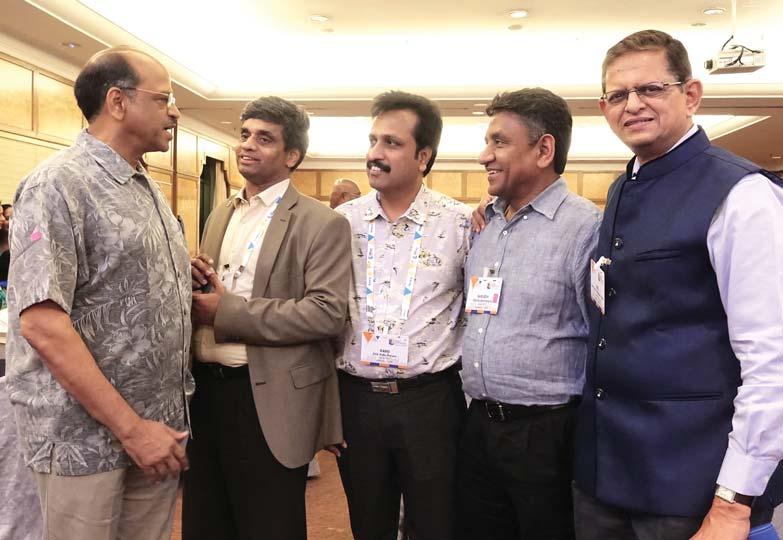
usual peppy form, as the session was nearing its end, he asked RI Director C Basker if he could take another 15 minutes, found him missing from the hall and quipped, “Basker’s run out of town, so we will take that time!”
And the next question went to Saboo, whose views against conferences such as PETS/SETS and Zone Institutes being held in faraway, exotic places, are well known. Asked Ravindran: “Raja, you have strong views on PETS etc being conducted out of town. I strongly disagree. But having this Institute in Malaysia… isn’t it a lot cheaper than having it in one of the Indian metros?”
Saboo: “Ravi, this is unfair. Sitting here in Kuala Lumpur and enjoying the Institute, you are asking ME whether this is right or not!”
Ravindran: “Who said anything about being fair?”
(Saboo’s detailed response in the article Frankly Speaking)
As the GETS sessions were in the concluding phase, and it was time for feedback from some of the DGEs, one of them came to the podium and said:
“Everything was good at GETS… but maybe one or two presenters/trainers were on the weak side. Had those sessions been held after lunch, we could have taken a nap. Otherwise, the training sessions were wonderful.”
To which the GETS Chairman PDG Sam Movva, who came up to the stage next, said wryly and with a straight face: “I know one of them was me that he was referring to. I wonder who was the other.”
Later, when it was time for RI Director C Basker to sum up the GETS
You are comparing Raja with the Taj Mahal… one is a cold monument, beautiful to look at, but visitors visit it to remember somebody who is dead. I am not THAT past!
Past RI President Rajendra Saboo
sessions, he said, amidst much laughter, “Maybe I am the second fellow, as I was in the morning session. You have identified the two right persons.”
Just before PRIP Rajendra K Saboo delivered his address at a GETS session titled “Ignite the leader in you”, PDG Anil Agarwal, while introducing him recalled how one Rotarian had said: “We do not have two things in our RI district; the Taj Mahal and Raja Saboo.”
Beginning his address, Saboo said: “About your comparison of Raja (Saboo) with the Taj Mahal… well, one is a cold monument, and beautiful to look at… and visitors go and see that monument, which is to remember somebody who is dead. I am not THAT past… but thank you Anil for that wonderful introduction.”
“Also, mine is supposed to be an inspirational speech. But I wonder how can the past, a long past, inspire the future? In fact, on the other hand, my interaction with you (DGEs) should leave me inspired!”
Pictures by Rasheeda Bhagat

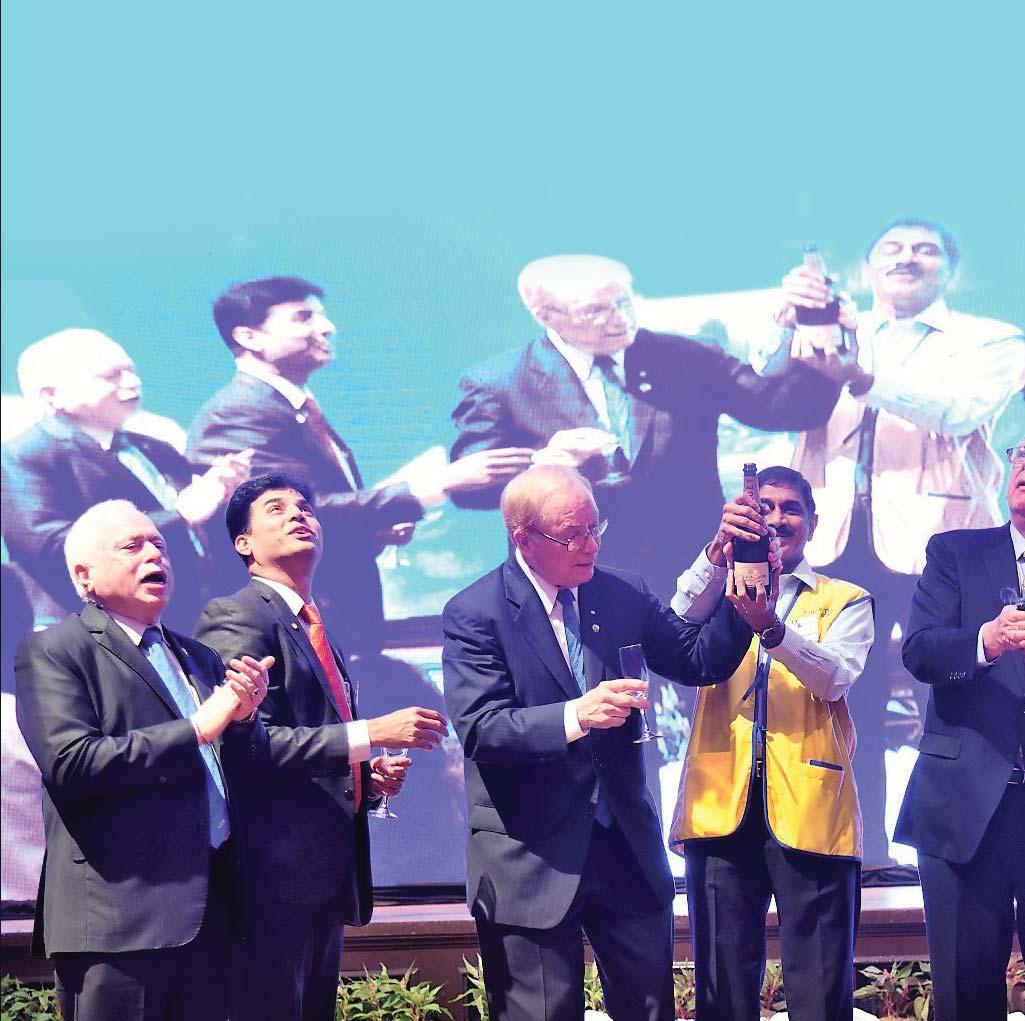

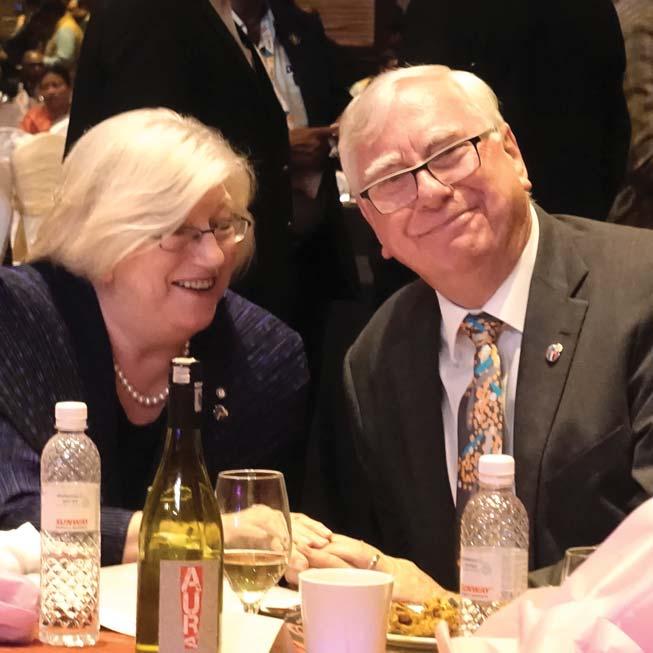
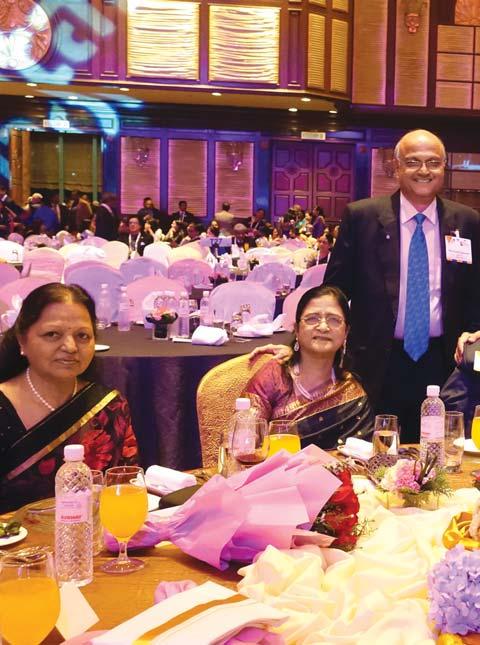

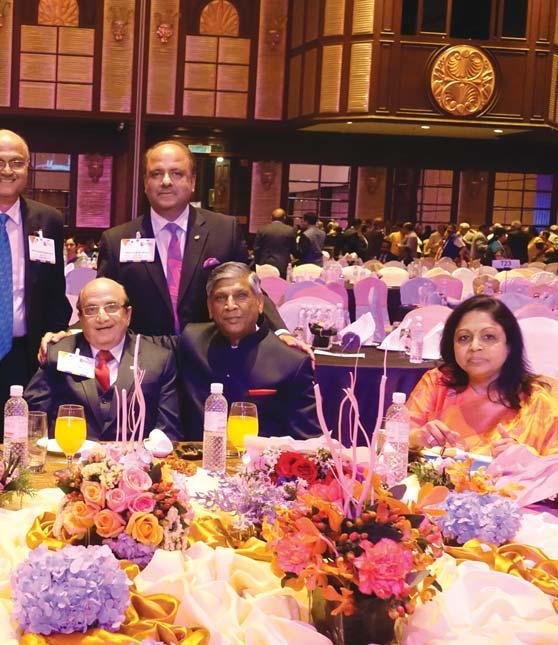

Sunita, spouse of PDG Ajay Kala, Vijaya Gupta, spouse of RC Ashok Gupta, PRIP K R Ravindran, PRID Panduranga Setty, PDG Ajay Kala and PRID P T Prabhakar.
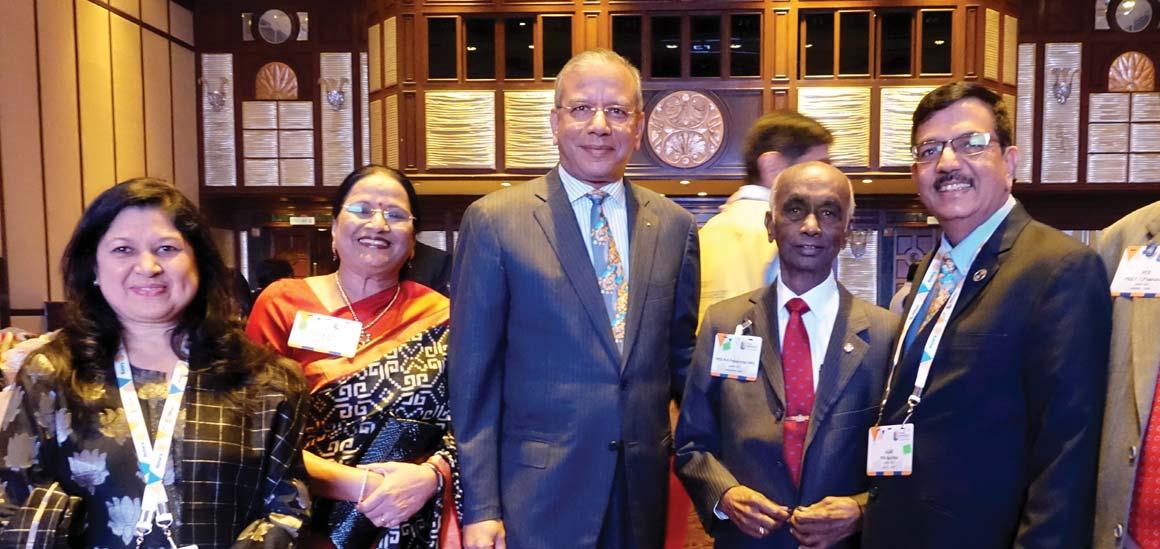
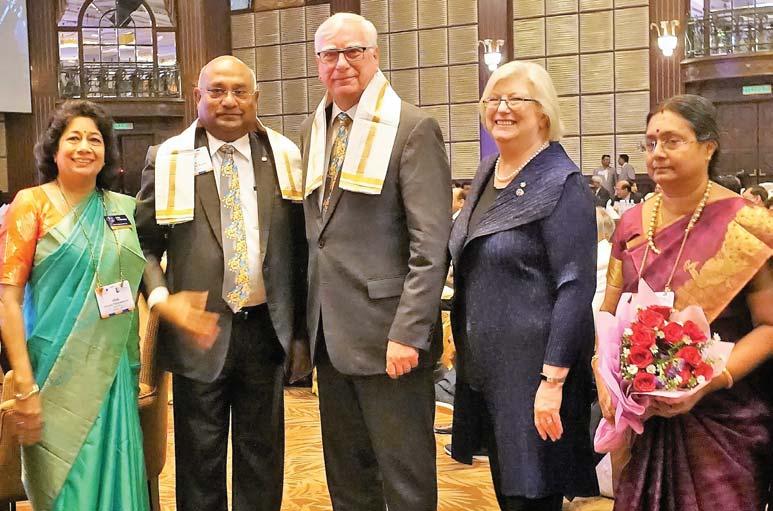
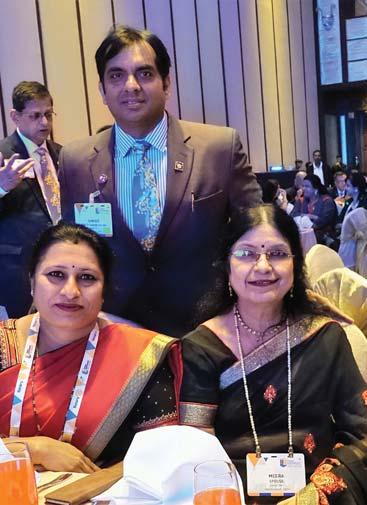
FROM LEFT:
(From R) Institute Chairman R Theenachandran, Institute Convener and RID C Basker, PRIP
Rajendra K Saboo, PDG
S Krishnaswami, TRF
Trustee-elect Gulam Vahanvaty and PRID P T Prabhakar.
(From L) RC Ashok Gupta, PDG Narayan Nayak, AKS member Sudhi Jabbar, TRF Trustee Sushil Gupta, DG Suresh Mathew and PDG Vishram Patel.
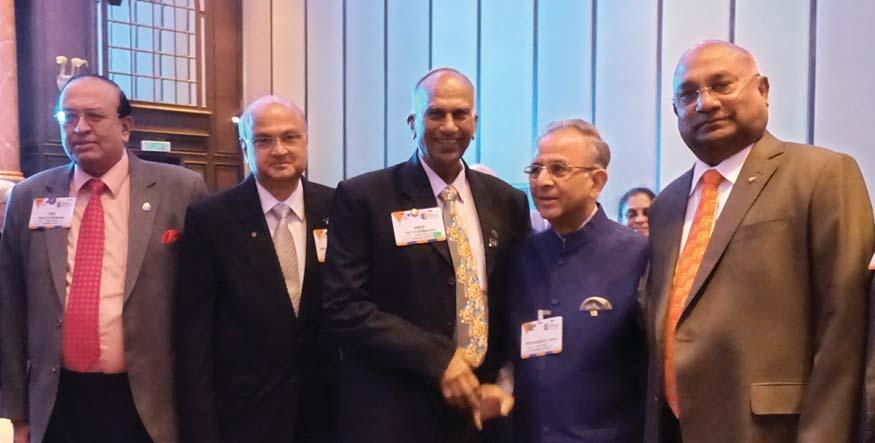
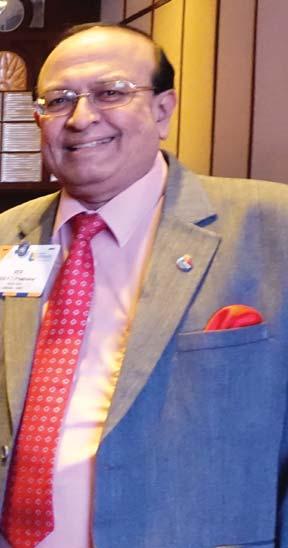
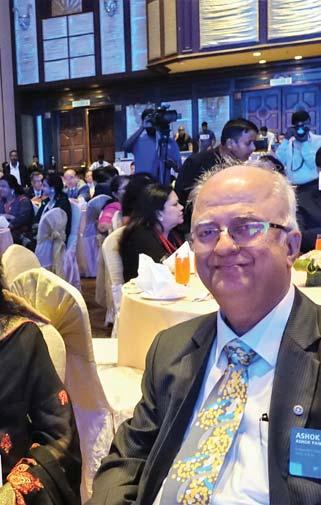
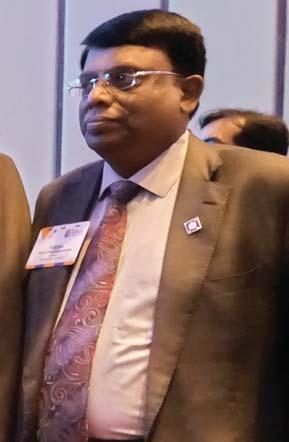
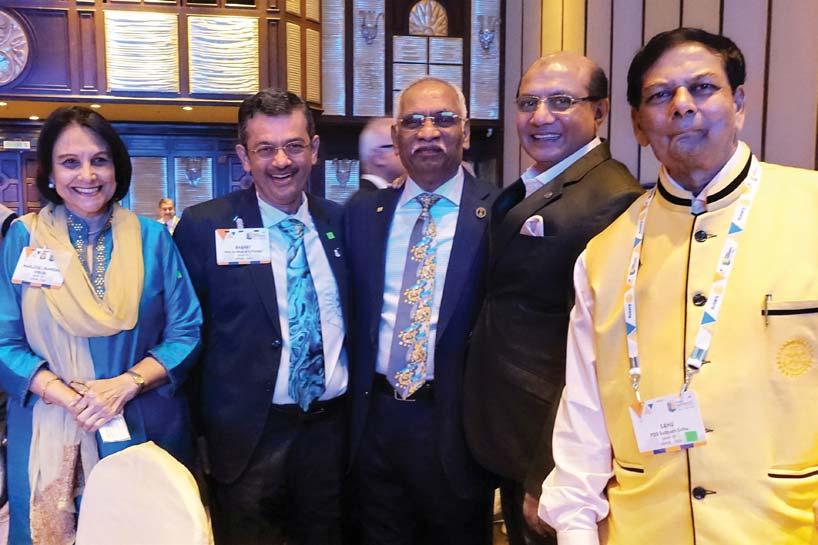
(From L) Marlene Kamdar, PDGs Bharat Pandya, J B Kamdar, Kamal Sanghvi and Subhash Sahu.
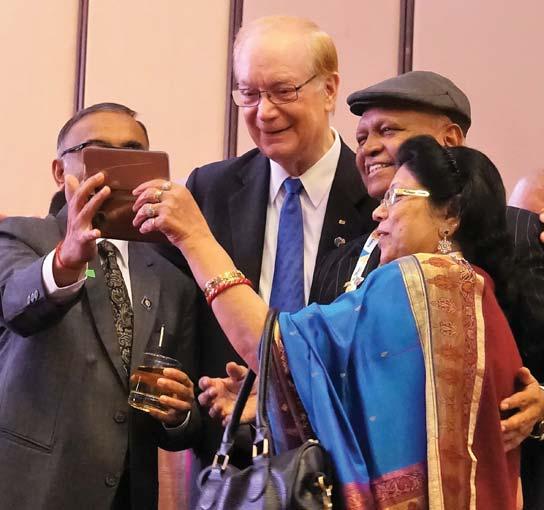
FROM LEFT:
Traditional welcome: DG Asha Prasanna Kumar, RID C Basker, RI President Ian Riseley, Juliet and Mala Basker.
(From R) EMGA Ashok Panjwani and Meera with DGN Sameer Hariani (the MC at the Institute) and Uma Nagesh.
Selfie time: (From L) PDG Sharat Chandra, Trustee Chair Paul Netzel, PDG Narayan Nayak and spouse Sunanda.
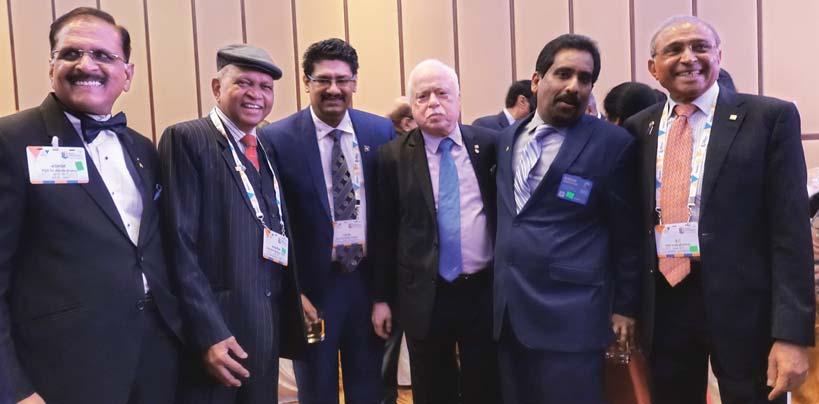

During the Rotary Institute 2017 in Kuala Lumpur, a two-day training programme for the partners of Governors Elect was conducted. The partners, led by Mala Basker, provided not only colour, but incredible, creative thoughts for the conduct of Rotary in 2018. During the two-day highly
interactive workshop, they came up with ideas that could transform the Rotary movement.
No longer were they just being challenged to help the DGs, but actually being asked to lend their feminine shakti to make sizeable contributions to the work of Rotary.
The prayer song and the Rotary songs
Usually partners are silent supporters of the governors. In this group I found all of them extremely participative.
Mala Basker Spouse of RI Director C Basker

surrounded the session with a special energy. There were lively and interesting quiz sessions conducted by Jayanthi Raja Seenivasan and Nalini Olivannan, which proved how surprisingly well-informed the partners were.
The Round Table format got everyone talking and the presentations on how women can be attracted to Rotary were innovative and lively.
Mary Ellen Matthews, wife of Director John Matthews was emphatic and impactful. She also shared her experiences about the International Assembly.
Vasanthi Theenachandran made an interesting presentation on how to make the District Conference more effective.
The discussions ranged from how to increase the membership of women Rotarians in clubs, to how they could enhance the contributions to the Foundation.
Dr Sharmishtha Desai gave a practical presentation on projects. Manju Das shared a sensitive account of her experiences as a spouse. Marlene Kamdar shared her secrets on how to be a better aide to VIPs and guests. Usha Saboo’s
Spouses of DGEs at the Partners Training session.
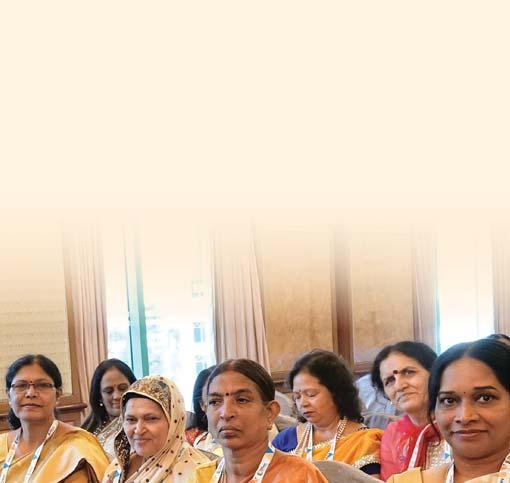
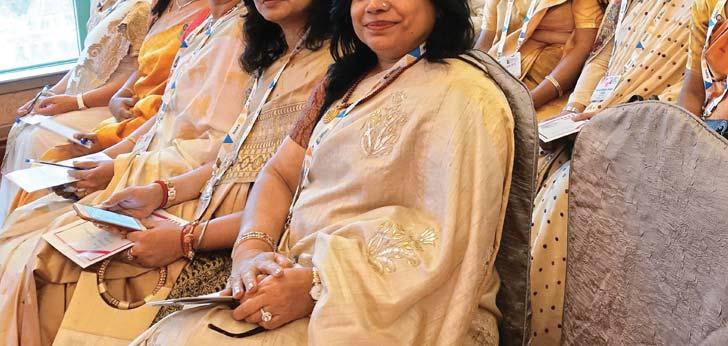
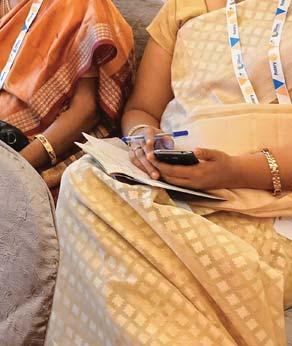

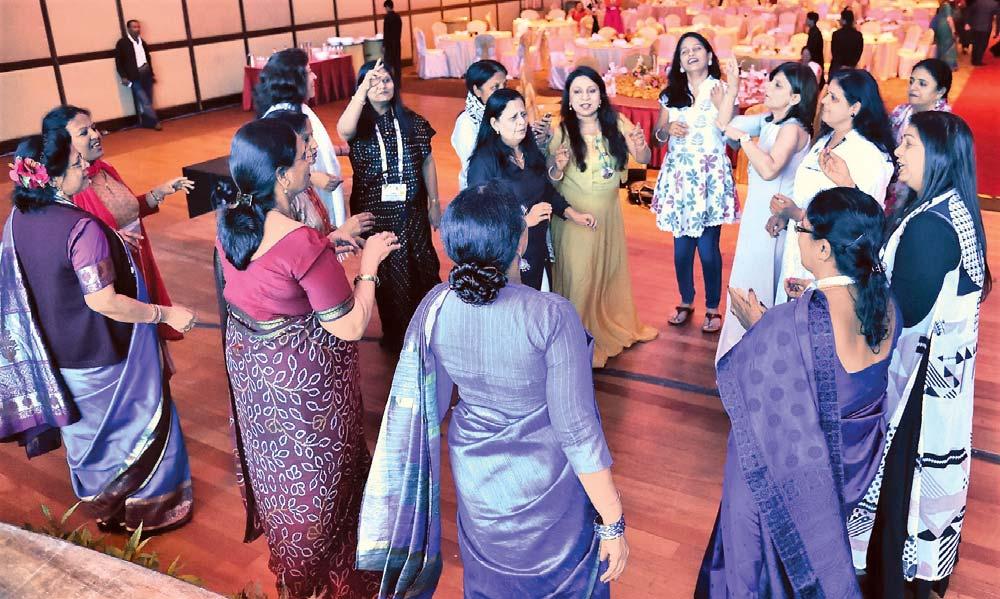
inspiring presentation on her experiences in Africa moved the audience to plan more international projects. Kiran Jalan added a special touch to the discussions by her effervescent personality.
One of the most interesting sessions, conducted by Nalini Olivannan, focussed on special projects and plans by partners. Most of them had a flagship project to energise the woman power in their district.
Dampathi is the ancient Indian concept of marriage being a journey of partners joined in a common enterprise. Like oxen drawing a cart together. This twoday session proved that Rotary believed in the
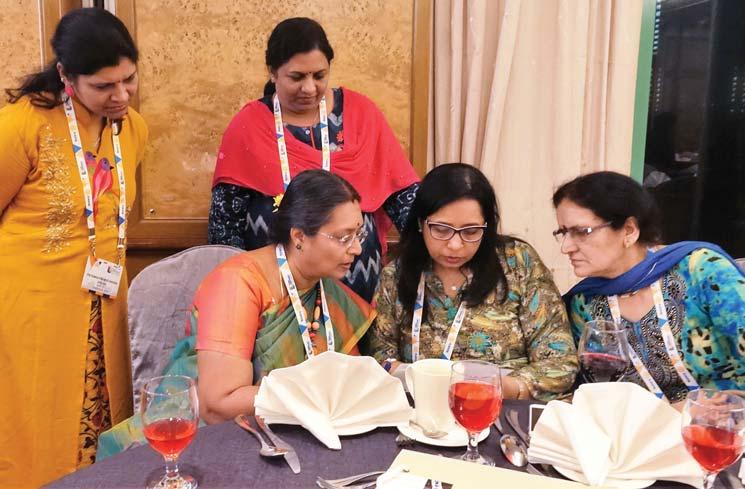
equal support and strength offered by partners.
‘Friendship is essentially a partnership,’ wrote Aristotle.
“I was amazed and delighted by the enthusiasm and commitment among the partners,” says Mala Basker about the partners’ programme. “Usually partners are silent supporters of the governors. In this group I found all of them extremely participative. The format of the programme also allowed for a lot of involvement and interaction.”
The writer is a PDG from D 3232 and conducted an interactive session on how partners could take proactive steps to raise Foundation giving.
Pictures by Rasheeda Bhagat

We Indians love to complain and at the drop of a hat we shoot off a letter. Not only one letter, we send copies to everyone around the world. We should stop that as soon as we can. Though I do feel that overall the total number of complaints from India are going down. But I wish we’d stop marking everyone in the accusations we keep making. There is no reason why we can’t sort out our problems ourselves. Why does it have to go to the RI?”
And thus PRIP Kalyan Banerjee responded to a question addressed to him by PRIP K R Ravindran, moderator of one of the best sessions at the Kuala Lumpur Institute titled ‘Frankly Speaking’.
Ravindran had initially directed the question to RI
President Ian Riseley on what was “the best and the worst” he had seen of the Rotary world during his year hitherto at the RI helm.
Responded Riseley: “The best is easy; Juliet and I have seen a lot of the Rotary world and the absolutely fine projects and the work done in the name of Rotary… it is all so uplifting. The worst is the avalanche of emails I get from India where people accuse each other of being dishonest. And there is a lot of it... four or five a week.”
PRIP Rajendra Saboo at first quipped in a lighter vein: “I am glad that I am not president this year because I come from an era when the email wasn’t there.”
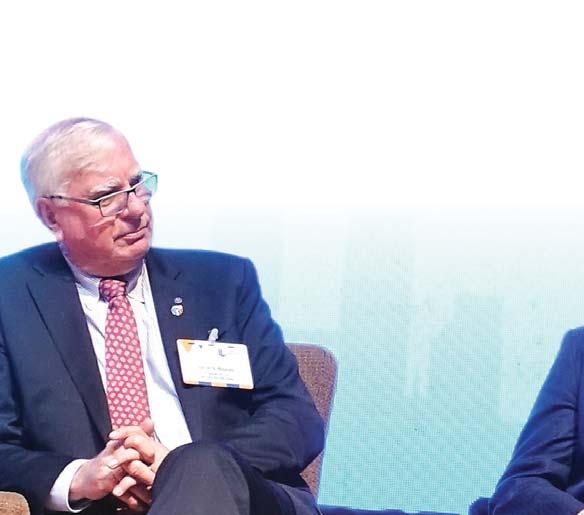
More seriously, he wondered why “we in India are so obsessed about positions. Most of the time such complaints have to do with some
election dispute or the other. Though I am a past president of RI, the only thing I will never be is a “past Rotarian till I leave this world.” While joining Rotary, one has to understand “the spirit of Rotary, and not hanker after positions. I don’t know why we can’t sit down and resolve our issues. We have in our midst incoming governors; with that position comes the responsibility that change is continued.”
Unfortunately, added Saboo, the good work that Indian Rotarians do is lost because of such behaviour.
Riseley intervened to say, “I need to balance that; Juliet and I have had the opportunity to see the good work being done in the name of Rotary in India. For example, after the floods in the north (Uttarakhand), we saw the building of schools. It was amazing work and the
From L: RI President Ian Riseley, TRF Trustee Chair Paul Netzel, PRIP Rajendra Saboo and PRIP Kalyan Banerjee.
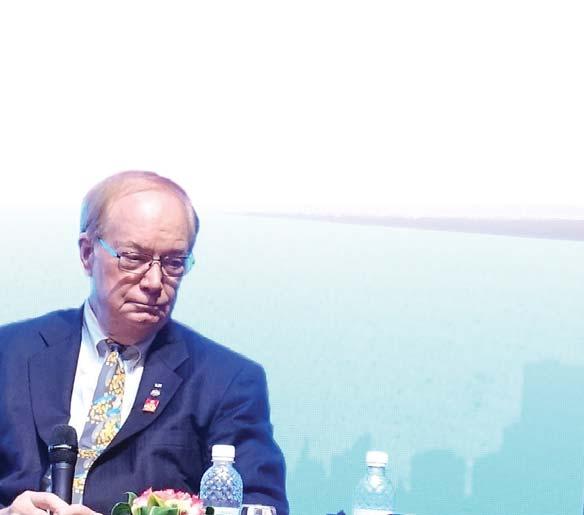

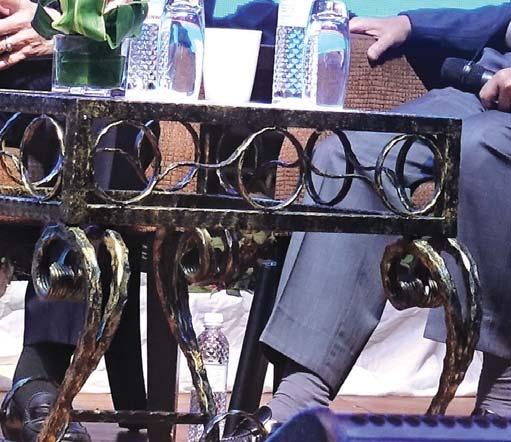
reception from the young people to this work was amazing.”
He added, “I accept the fact that in Rotary we have cultural differences and that is the way this should be seen. But even if it is a legitimate complaint or otherwise, I don’t understand why it should be sent not only to me but every member of the Board, every Trustee and everybody else who has an email address! It baffles us and it gives those of us who are in some position of leadership beyond the subcontinent to believe that everything, as they say in Hamlet, is rotten in the state of Denmark! It gives us the impression that Indian Rotary can’t govern itself, which I am sure is not right.”
TRF Trustee Chair Paul Netzel added, “Let me echo the sentiments of President Riseley; I too have been inundated with emails along the same lines, but I have to point out that this is the superficial perspective we would get if we didn’t have the opportunity to visit India. But when you visit India, you get the absolutely amazing experience to see the fabulous work being done.”
In another question directed to “the two big ones from India”, Ravindran asked: “In our zones, in the process of increasing members, are we dropping quality and bringing Rotarians who shouldn’t be in Rotary?”
Responding, Banerjee said that during the Institute’s inaugural session RI Director C Basker was “very optimistic about numbers from India, but when the (RI) President spoke, he had a note of doubt about how real are those numbers. And that is a feeling that I have heard expressed countless times in RI. How real are the numbers from India? I am afraid I have heard of clubs or districts where the total number of members might be 1,000 but the number presented to RI is 750 and the other 250 might be paying their dues but the information is not sent to RI.”
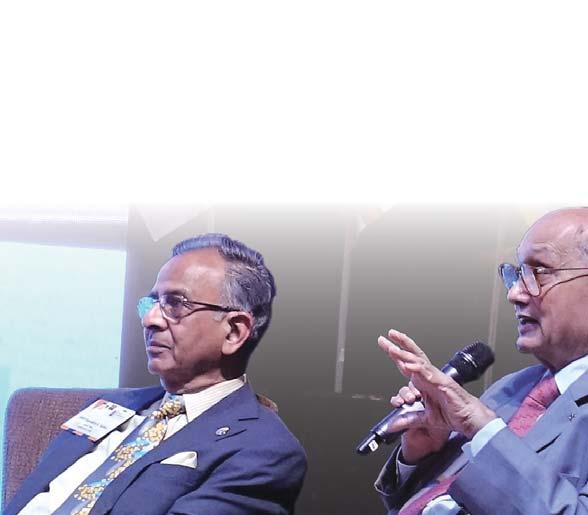
Juliet and I’ve seen the good work being done in the name of Rotary in
(Uttarakhand) we saw the building of schools. It was amazing work ap-
the big doctors, surgeons, lawyers, professors? Do we have among the top 10 industrialists in India as our members? Perhaps not even the top 50. The problem is we don’t ask them.”
The person who could rightly answer this question, he added, was Jatinder Singh from the South Asia Office in Delhi “rather than me! But apart from numbers, to me the quality certainly needs to improve. Where are


Banerjee expressed his displeasure that too often Indian Rotarians rushed to make dignitaries honorary members and “an honorary member is member only for one year. The man coming in doesn’t know that at the end of the year his membership means nothing at all. He doesn’t probably care. So why are we going through the gimmick of making honorary members? It means nothing to them at all. And we are missing out on the really big ones who could become members.”
This was not so in other countries; “I can tell you in Uganda, the Chief Justice, the Chairman of the Bank of Uganda, etc, were Rotary members. This doesn’t happen in India.”
On the avalanche of emails that Riseley receives, Ravindran asked Saboo if he is happy that as the RI President in 1991–92, “you didn’t have to face what Ian is facing. Do you believe the president of today has to have a different group of skill sets?”
Saboo quipped, “I don’t know about that but I feel I was really busy that time also! At that time the fax was the fastest mode of communication and as president elect I wanted to have a fax machine, as on the 18th floor there was only one fax machine. And I was told: ‘It is so expensive that it will not be covered in your budget.”
He then went on to relate how he had to send fax messages on all kinds of issues in advance, including “Usha and I being vegetarians... nobody understood what a vegetarian is.”
Riseley quipped in an aside “Nothing has changed!”
Saboo recalled he had requested his wife Usha to make a list of vegetarian dishes and how to prepare them. On one occasion, prior to their visit to Brazil, his secretary faxed 22 pages on vegetarian dishes with their recipes. During the visit when food was served, “they brought a dish which had fish on top of it. Usha said but this is fish. And the man serving it said: ‘Take it out.’ So the RI Director said, ‘this man did not read any of the 22 pages you had sent!’ That was the kind of communication we had. Yes, life was different; maybe the pace was slow, but there was enough work!”
Next Ravindran asked Netzel why couldn’t TRF Trustees be elected like Directors rather than the President simply appointing them.
Where are the big doctors, surgeons, lawyers, professors? Do we have among the top 10 industrialists in India as our members? Perhaps not even the top 50… because we don’t ask them.
Kalyan Banerjee
Netzel felt the current system whereby an independent committee reviews nominations of potential trustees and then makes recommendations to the President Elect, who then sends it to the Board of Directors, “is okay. But it misses an important ingredient. I feel this system is deficient in not having representation from all the parent zones in the world.” So the election of Trustees in the future was an option. But Banerjee disagreed and said that what shouldn’t be forgotten is that
TRF is an arm of Rotary International, and “if we keep the two as independent bodies, we are likely to run into uncomfortable situations. After all the President Elect and nominating committee may recommend names, but it is the RI Board which finally okays the list of Trustees. I think it is doing alright. But the audience might not like it, I can understand the reason why!”
Saboo agreed with Banerjee and added, “If the Trustees are elected then they come with their own authority and there will be two parallel bodies and I fear that RI may get relegated to the second positon because TRF will have all the money.” It was better to have one supreme body which was the RI Board; “and if all the zones are not represented, then increase the number of Trustees but go through the same process.”
“Unofficial formula’ on RI President Ravindran then posed a question on the prevailing “unofficial formula” that while one RI President should come from the US, the next two should be from outside the US. Riseley said such
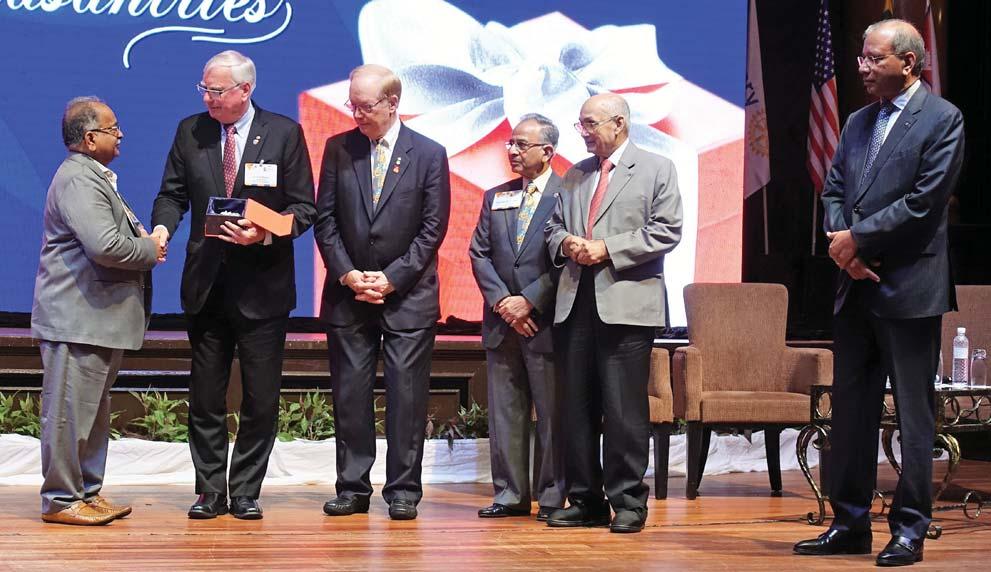
an understanding of a revolving basis did exist; “I don’t like that for two reasons. First, it is an unwritten understanding; second, it is the responsibility of the nominating committee to select the best possible person for the role.” He had recently discussed this with the Board of Directors and they had agreed with him that the very concept of an unwritten understanding was outdated. “So I have written to all past directors to suggest that if they proposed to be on the nominating committee, it is their responsibility to choose the best candidate, irrespective of the nationality.”
He would also be suggesting to the next CoL through the RI Board on a limitation not to have a president from the same country for two successive years. “We should free it up as much as possible because the nominating committee should choose the best candidate for the job.”
Netzel too agreed this was the correct way to go; as the current system was outdated and needed to be changed. Saboo and Banerjee were not in sync; they felt that if the system was reversed there could be a stream of presidents coming from the same country.
Ravindran quipped as an aside “I was hoping there may be three presidents in a row from India”! Shot back Riseley: “And the next 10 from Australia!”
Ravindran next quizzed Saboo on his well-known views on holding major training events like a Zone Institute
If elected, the Trustees will come with their own authority and there will be two parallel bodies and I fear that RI may get relegated to the second positon because TRF will have all the money!
Past RI President Rajendra K Saboo
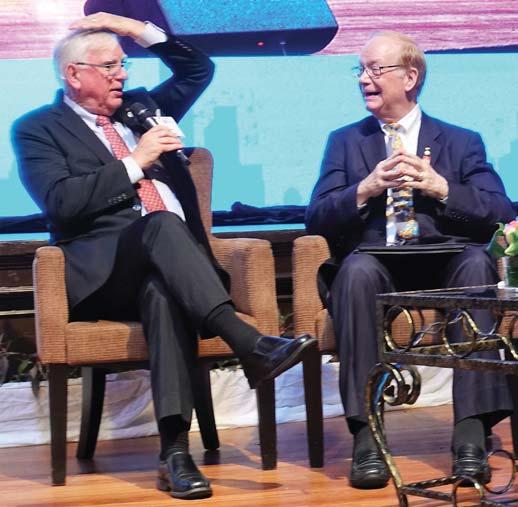
or MDPETS and PETS/SETS outside the region in foreign locations. “I strongly disagree; having this Institute in Malaysia is a lot cheaper than in any of the Indian metros,” he said. Saboo’s response: “Let me be very frank and this is not against anyone. But rupee to rupee value… I feel it is unfair to have the Institute outside the zones for many reasons. We think it is cheaper, but you have to look at the sponsors from whom the money is being collected… sums of `10 or 15 lakh or even more. And some of them are giving that money in return for some favour!”
The Institutes were meant for PDGs, current DGs and incoming DGs. But some of the DGEs returned from such Institutes to hold their PETS and SETS in places like “Dubai or Hong Kong, where they go for fun and there is no element of training at all. Now we in India are wanting to have a Convention and people say you don’t have a place in India for an Institute and you want to have a Convention? These are some of the questions we have to ask.”
Saboo added that the justification for MDPETS (of which, he suggested, Ravindran was a strong proponent) was that the RI President gets to meet and interact with so many club leaders in
one place. “Well, this is in his interest, but not in the interest of the districts, the DGs or the club leaders.”
Ravindran responded, “I am the moderator so I can’t debate with you but let’s see what Paul has to say about that.”
Netzel disagreed with Saboo and said, “The MDPETS started in my zone some 30-plus years ago in California. I have been exposed to a dozen and there is nothing that prevents the governors from meeting with or working with their club presidents, which is critical. And in such a large audience it is possible to get the RI President, RIPE and other Rotary dignitaries. In how many district conferences of PETS is this possible? So I am in favour of MDPETS.”
Ravindran summed up the session saying it had been tailored to give the Institute participants an idea of what and how the RI Board and the Trustees operate. “How people at the highest level debate. They don’t always agree but they disagree in an agreeable manner and this is what gives strength to Rotary; the ability to extract diverse opinion and arrive at the best conclusion. And this is what we lack often in our zones… it is like either do it this way or no way!.”
Pictures by Rasheeda Bhagat
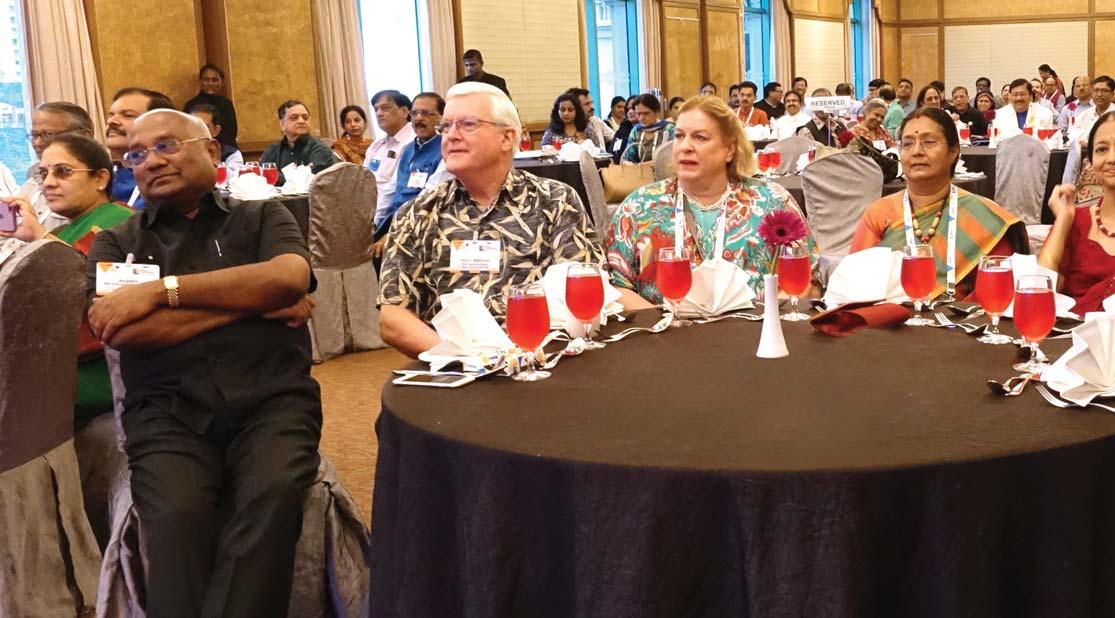
With RI Director C Basker’s penchant for training well-known, well articulated and well enforced through training sessions not only for RI general officers and district leaders, but also DRRs, the GETS sessions at the Kuala Lumpur Institute were well planned and rigorously executed.
PDG Sam Movva was the captain of the Governor’s Elect Training Seminar for the 40 incoming district governors and their spouses from India, Nepal and Sri Lanka. Conducted over three days prior to the Institute, this year, GETS kicked off with a trainers’ training session, handled by the training team leader Movva. “At this session, the finer aspects of facilitation techniques, room
management and nuances of adult learning were discussed at length. This year’s GETS curriculum included, for the first time, a joint session of governors-elect and their district trainers at the instance of RI Director Basker, who wanted DGEs and the district trainers to be on the same page when it came to the training cycle at the district level,” said Movva.
Another first time event at this GETS was a session on RI constitutional documents and “it was deftly handled by PDG T N Subramanian, who is a member of the RI constitution and bylaws committee,” he added.
Apart from Movva and Basker, the plenary speakers included the who’s who from RI, such as RI President Ian Riseley, TRF Trustee Chair
Rasheeda Bhagat
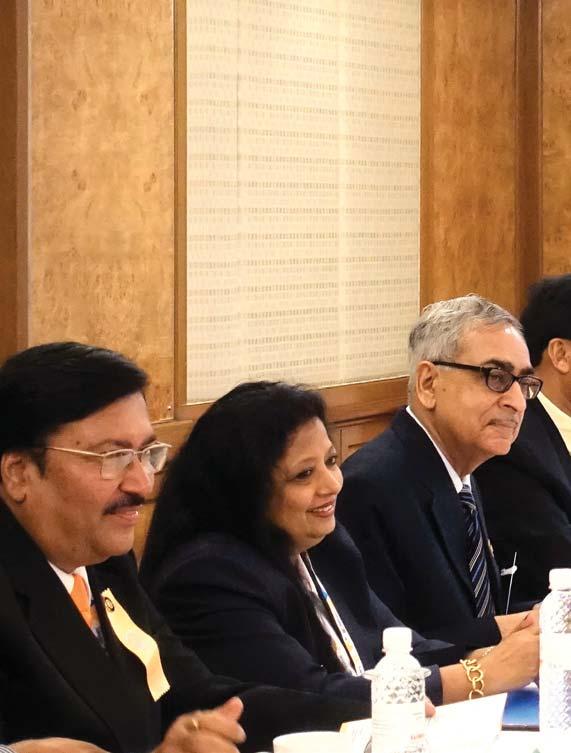
Above: (From L)
Vasanthi Theenachandran, RID C Basker, RID John Matthews, Mary Ellen Matthews, Mala Basker, Nalini and PRID P T Prabhakar.

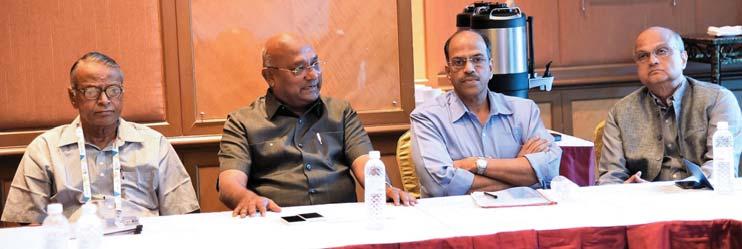
From L: PDG R Rajaram, RID C Basker, GETS Chair Sam Movva and TRF Trustee-elect Gulam Vahanvaty.
Paul Netzel, RI Director
John Matthews and Past RI
President Rajendra Saboo. The Foundation Seminar, addressed by PRIP and immediate Trustee Chair
Kalyan Banerjee and Trustee Sushil Gupta, evoked a lot of interest, and many doubts about raising funds and executing grants for
sustainable projects in a transparent manner were discussed.
From L: DGEs Neeraj
Sogani, Stuti Agrawal, Vishwa Bandhu Dixit, Ashes
Ganguly and Praveen
Goyal with GETS Chair Sam Movva.
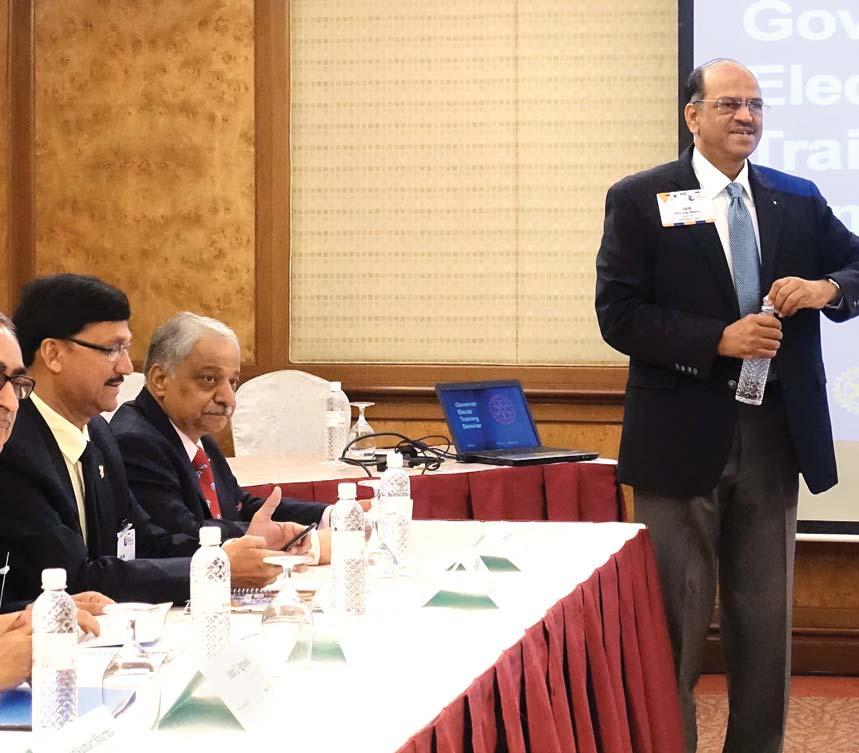
This year’s GETS curriculum included, for the first time, a joint session of governorselect and their district trainers, and a session on RI constitutional documents.
The various training sessions were handled by team leader Sam Movva, general trainer PDG Raja Ram, past directors Yash Pal Das, P T Prabhakar, Manoj Desai, TRF Trustee Elect GulamVahanvaty, and past district governors Dr Rajiv Pradhan, Ashok Gupta, A S Venkatesh, Ashok Panjwani, Raja Michael, Rajendra Rai, Avinash Potdar, Ashish Desai, Bal Inamdar, K P Nagesh and Gowri Rajan. RI staff members including Abe Mcnear, Nick Smith, Jayashree Jayaraman and Joseph Thomas, the last two from the RI South Asia office, were the resource persons at the GETS.
At the feedback session many incoming governors expressed their happiness on the manner in which the various GETS sessions were conducted, the quality of training and said they felt inspired and looked forward with much greater confidence to further training at the International Assembly in San Diego. Pictures by Rasheeda Bhagat


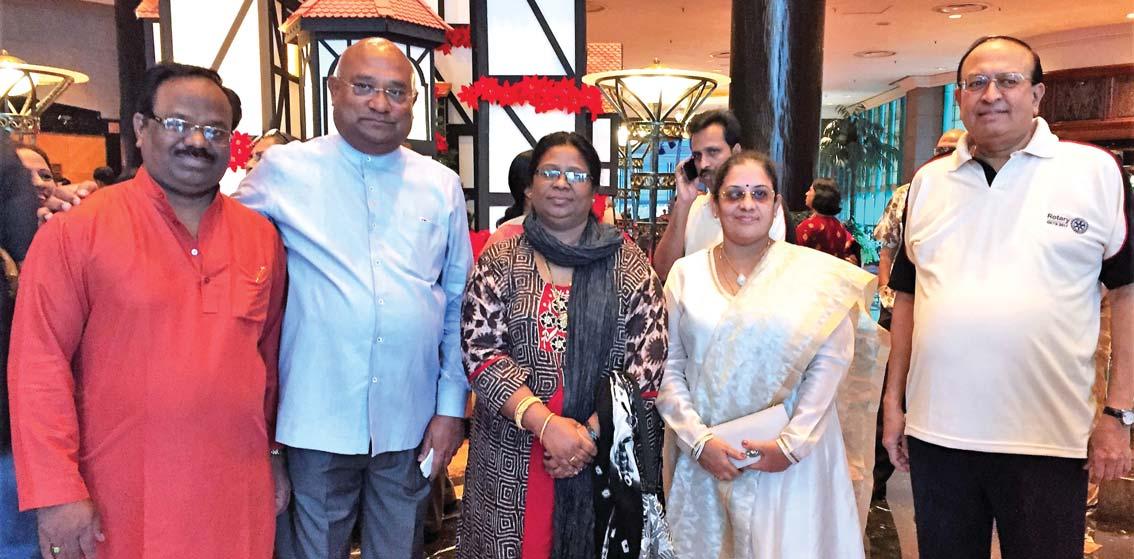

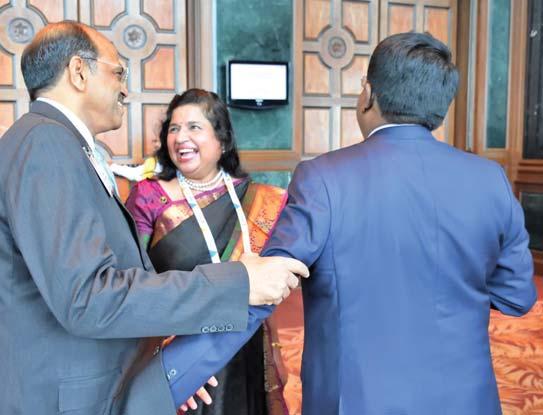
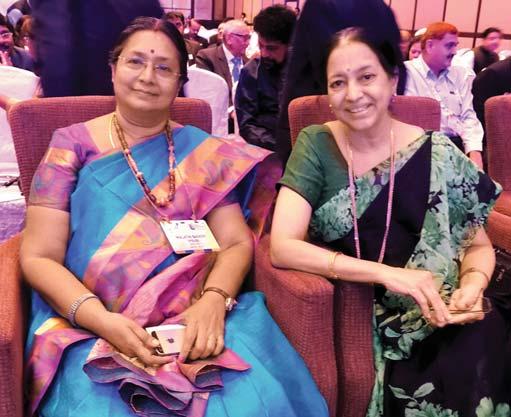
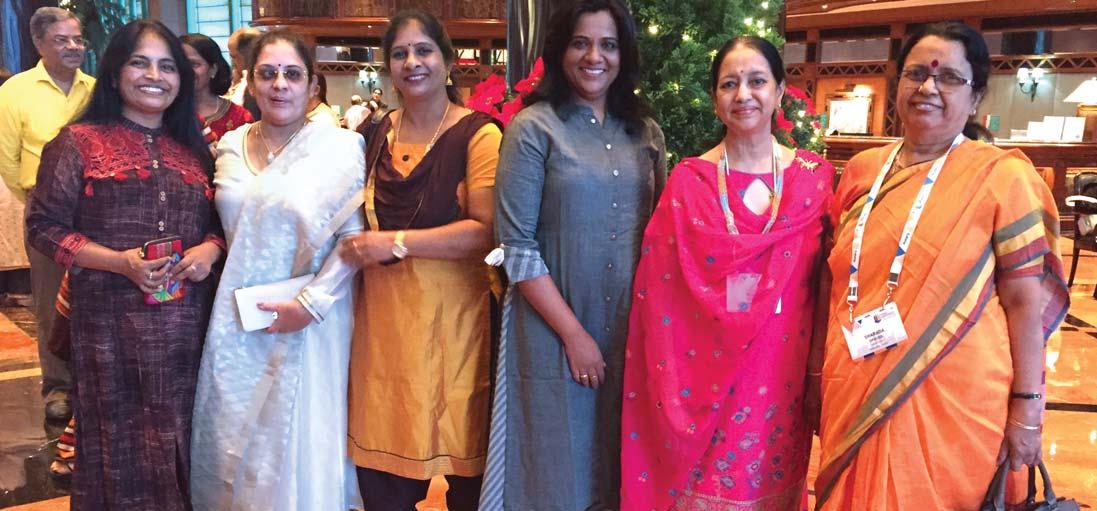
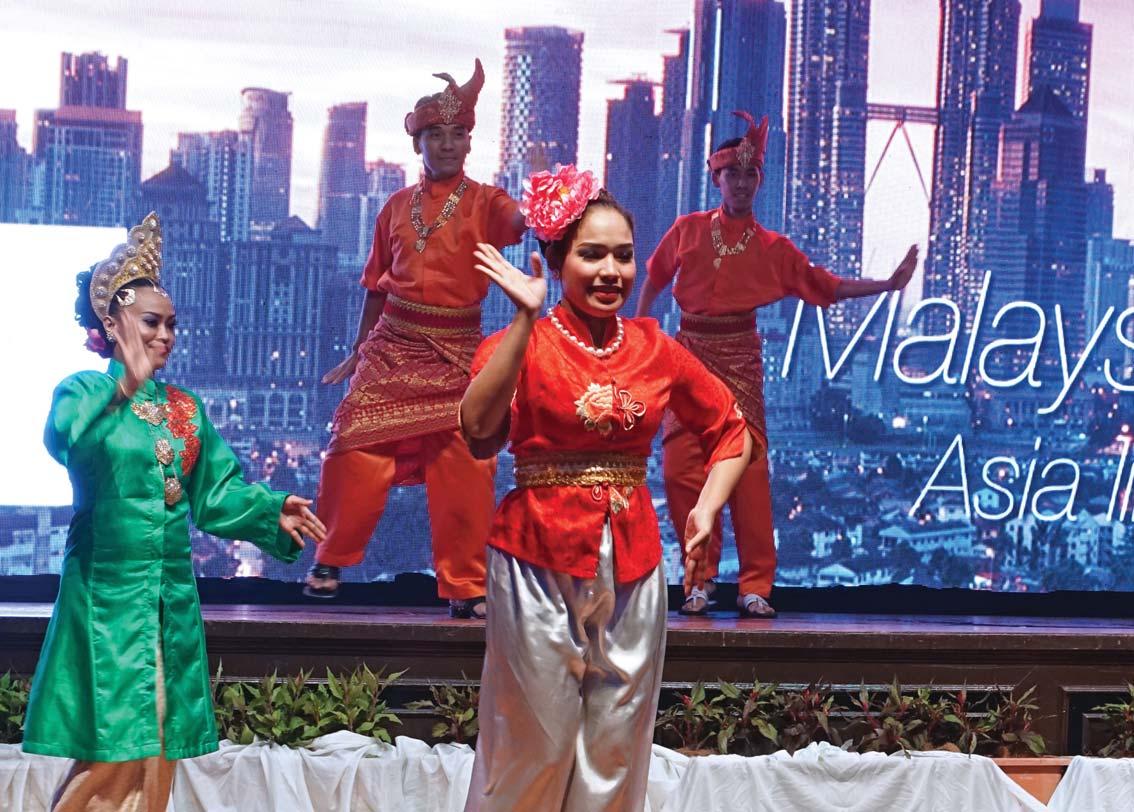
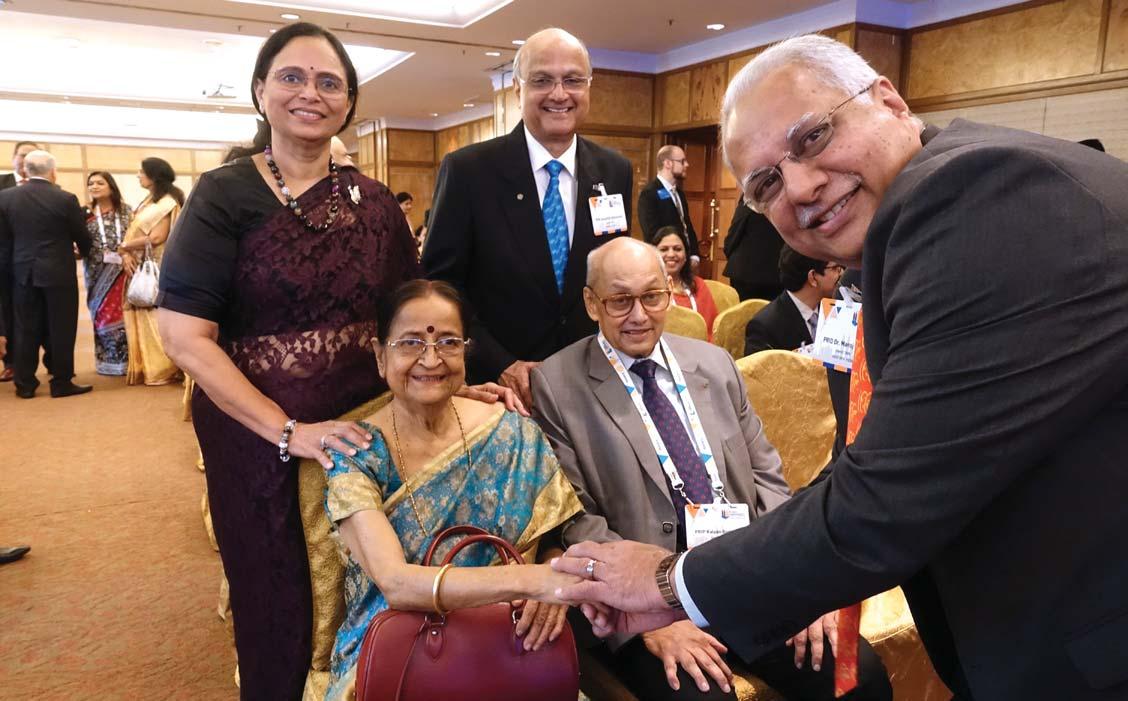
Clockwise: (from R) Juliet Riseley, Usha Saboo and Mary Ellen, wife of RID John C Matthews; PRIP Kalyan Banerjee, Binota, Usha Saboo, PRIP Rajendra K Saboo and Mahatria Ra; PRID P T Prabhakar and TRF Trustee-elect Gulam Vahanvaty; PRIP K R Ravindran and PRID Ashok Mahajan; PRID Manoj Desai and Sharmishtha greet Binota and PRIP Kalyan Banerjee. TRF Trustee-elect Gulam Vahanvaty is also in the picture; a Malaysian dance performance.
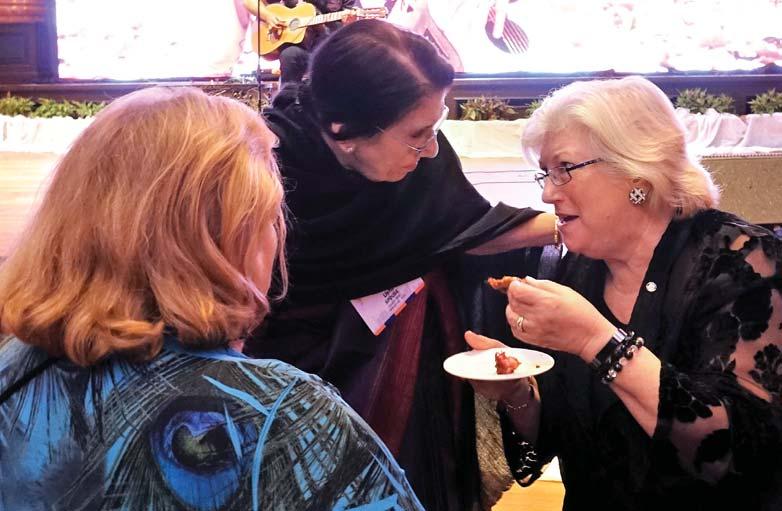
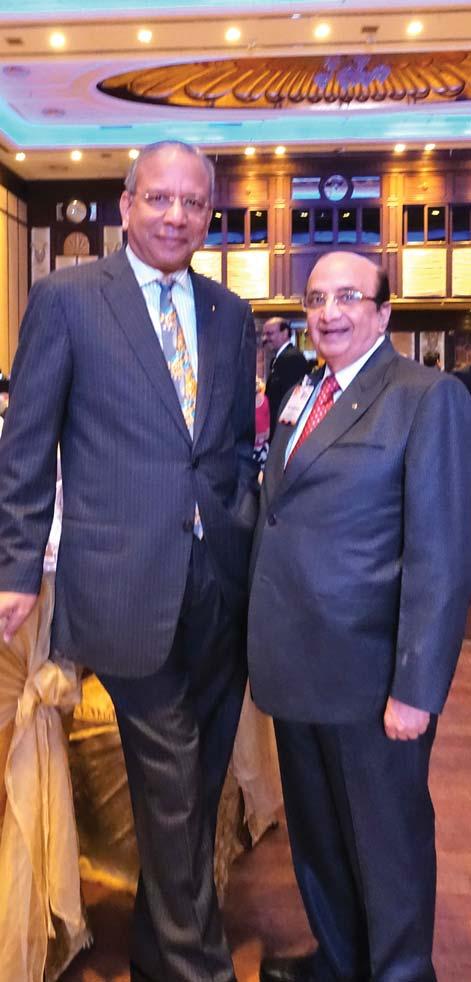
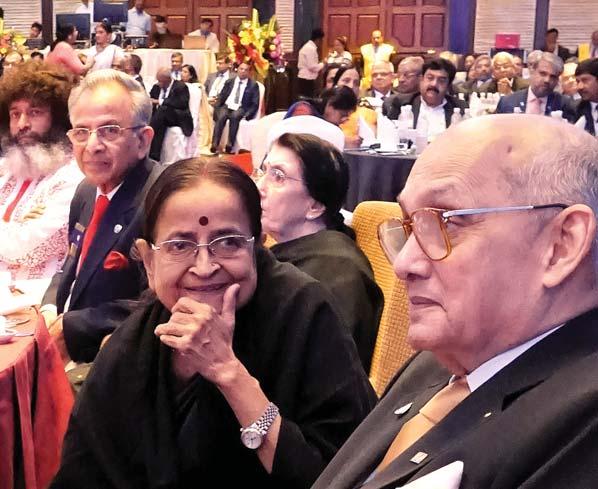
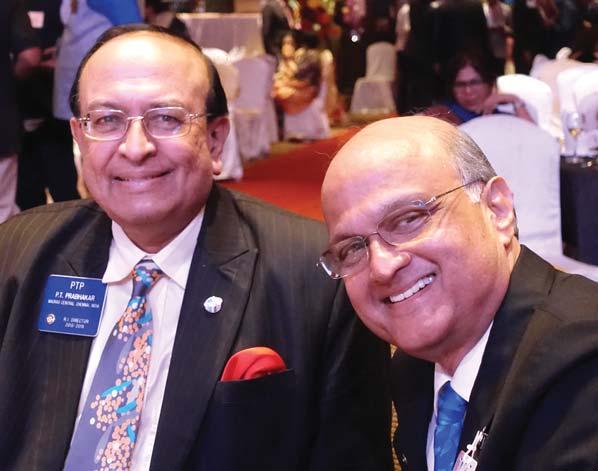
On the skill development front, District 3141 has kicked off a novel project by opening four Computer Learning Centres — three in remote areas and one at the Rotary centre — to provide joboriented training courses to underprivileged students.
The novelty of the project is that it entails “zero cost to the implementing club whose members only need to coordinate with the district and the school or campus which houses the computer centre,” says Rajesh Agrawal, District Avenue Chair, Skill Development from RC Bombay Airport. The Vedanta Foundation, the CSR arm of the
conglomerate Vedanta group, is taking care of the entire infrastructure right from computers and furniture to faculty hiring, course structure, publicity material and ensuring 24x7 internet connectivity at these centres. “Vedanta will pay the electricity bills, while the space is given free of cost by the school or institution which is housing the computer facility,” says Agarwal.
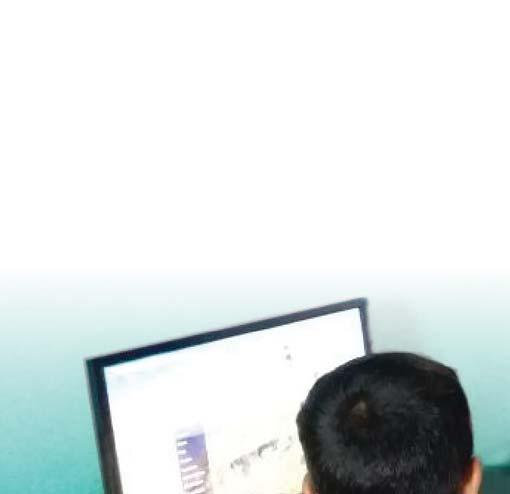
The objective of Vedanta is to ensure computer literacy across India and instead of providing ready cash, they set up the entire facilities on a turnkey basis and bear the recurring expenditure (or other exceptional spend) in running
the computer centres. “A very modest fee is levied on the beneficiaries. But no student will be turned away for want of money as the club will find large-hearted donors who will pay their tuition fees.” At present, 250 students are enrolled in four centres and are attending the two-month course having a 90-hour curriculum package.
While a 2-month basic course is taught for a modest fee of `500, as against `3,500 being the
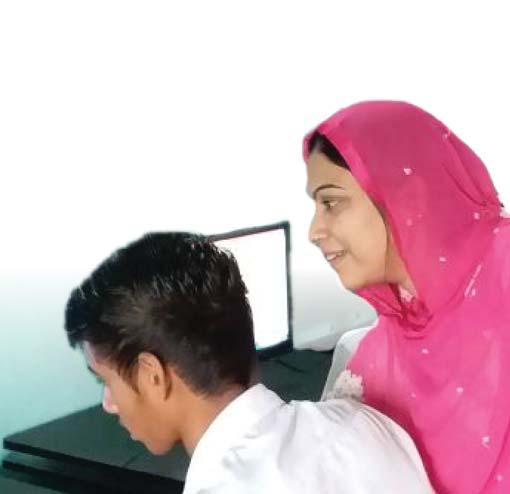
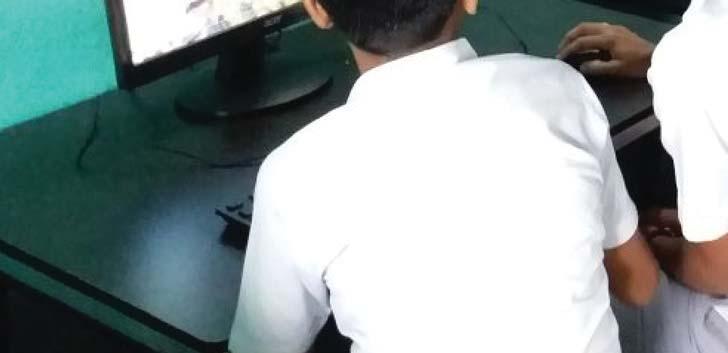
norm in private institutes, for those interested in taking up a career in this field, an advanced course for 2–3 months is also held in which website designing, Tally and computer networking are taught for `3,000, as against `18,500 being charged by commercial institutes. Each centre is equipped with 10 computers fully integrated with the accessories and loaded with the original software. D-Link Academy, an IT training company, has
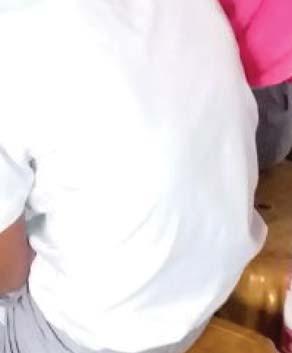

No student will be turned away for want of money as large-hearted donors who will pay their tuition fees.

Boys learning computer at the centre set up by RC Palghar in the Urdu High School, Shirgaon.

installed CCTV cameras in each centre for remote monitoring of the facility and also offer skill training in computer networking to the students.
During the inaugural phase between August and September, Rotary clubs of Dahanu, Mumbai Dahisar and Mumbai Ghatkopar have set up their computer centres in coordination with the district. The Ashramshala, a government initiative where children of nomadic families reside for school education, in Ganjad (Dahisar); Baba Harnamdas School at Tungareshwar, Vasai (Dahisar); and Bhimadri tribal school at Karjat in Raigad district (Mumbai Ghatkopar) have accommodated a centre each offering rural children from remote areas to acquire computer skills. The Rotary centre in Dahanu
houses the computer facility in an urban area.
All the four computer centres were inaugurated by DG Prafull Sharma and following the overwhelming response for the pilot project, DGN Shashi Sharma has decided to further expand the initiative in the next year too, says Agrawal. “At the optimum level, each centre is fully equipped to turn out at least 400 qualified beneficiaries in a year.”
A beneficiary Ankita Sule at Ganjad is elated to get trained in computer skills. Hailing from a tribal community, “I now feel confident, communicate better and use emails and other basic programmes that had enhanced my interpersonal skills.”
Expansion chalked out
In December, three new centres — hosted by RC
Palghar (Urdu school in Shirgaon); RC Bombay Airport (Boisar); and RC Mumbai Bay View (BDD chawl, Worli) — were inaugurated and three more will be opened by the end of January 2018.
DG Prafull Sharma has approved the plan of taking the ‘zero cost’ skill centre to Rotary districts across India and has communicated details about the model to all DGs.
D 3141 will coordinate all activities till the inauguration of the computer centre. “So far six districts have responded to our offer. We are fully equipped to roll out this unique project across the country and interested clubs can contact us,” says Agrawal.
For more details contact: District Avenue Chair Rajesh Agrawal: 98204 45542.
Rasheeda Bhagat
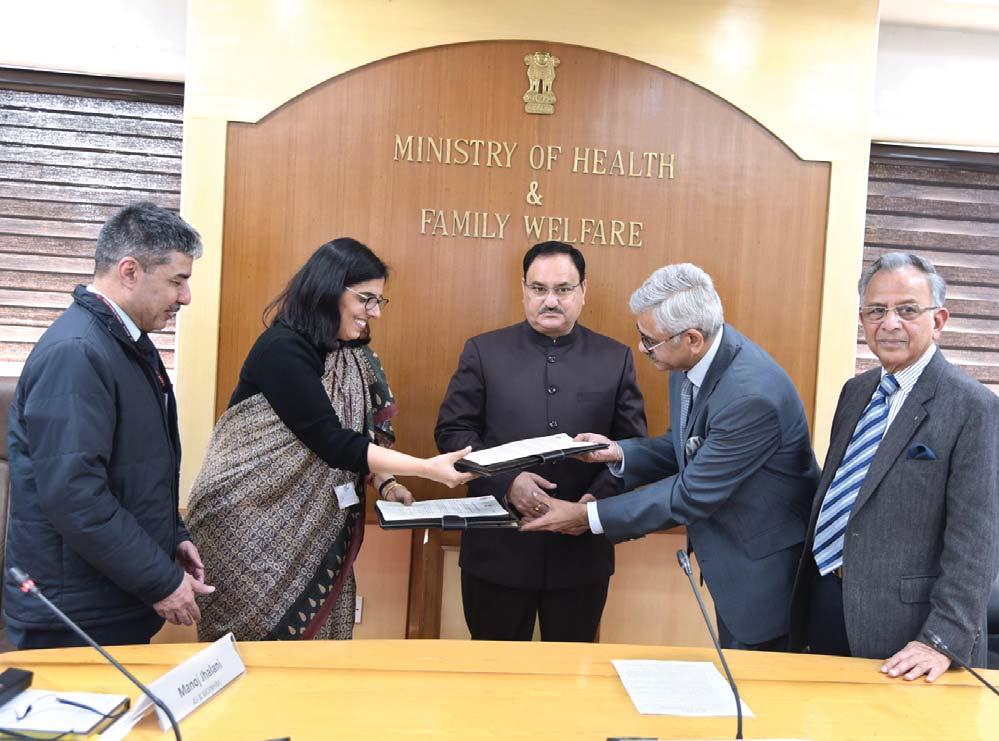
INPPC Chair Deepak Kapur and Joint Health Secretary Vandana Gurnani exchange the MoU in the presence of the Health and Family Welfare Minister J P Nadda (centre) and Additional Health Secretary Manoj Jhalani (left). PRIP Rajendra K Saboo is also present.
An MoU has been signed between the Ministry of Health and Family Welfare and the India National PolioPlus Committee (INPPC) for Rotarians’ involvement and participation in the GoI’s routine immunisation
project, including Mission Indradhanush (MI), Intensified Mission Indradhanush and Elimination of Measles and Rubella on Dec 6. The MoU was signed in the office of Health and Family Welfare Minister J P Nadda by Joint Health Secretary Vandana
Gurnani and PDG Deepak Kapur, Chairman INPPC, on behalf of Rotary.
Health Minister Nadda thanked Past RI President Rajendra K Saboo, who was present at the MoU signing, and Rotary, for the support and commitment provided by the Rotary fraternity
in India over the past four decades in helping the country get rid of the scourge of polio. As also, their support in many other social causes and initiatives. Additional Health Secretary Manoj Jhalani was also present during the signing of the MoU.
The Minister was certain that Rotary would once again rise to the occasion and use the inherent strength of its member volunteers to assist the Government in addressing the challenges posed by measles, rubella and other diseases against which vaccines are available. The ambitious goal is to achieve a 90 per cent immunisation target by 2020.
This MoU has fructified after several meetings senior Rotary leaders in India held to consider strategies for the elimination of Measles and Rubella (MR) in the country. In
An important aspect of this partnership is that it is an extension of our commitment to keep India polio-free.
the meetings, RI Director C Basker, PRIP Saboo, PRIP Kalyan Banerjee, TRF Trustee Sushil Gupta and Dr Jacob John had discussed partnering with the government in its target of eliminating MR by 2020. They felt that now India was polio-free, it was time to focus on the “Plus” component of
“PolioPlus” and participate in vaccination programmes to prevent measles, rubella and other diseases, while continuing polio immunisation to ensure India remains polio-free.
Earlier, when PRIP Kalyan Banerjee was Trustee Chair of The Rotary Foundation, in consultation with PRIP
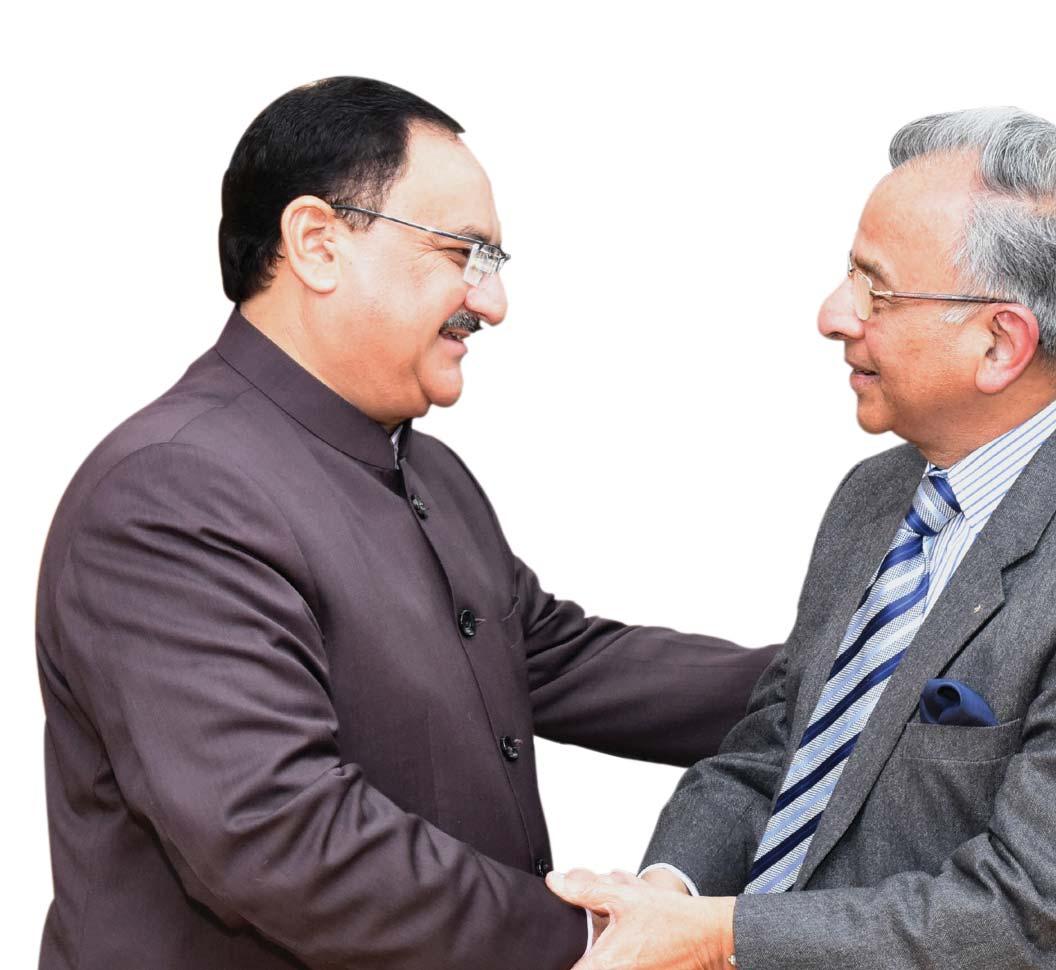
Saboo, Dr Jacob John and PDG Kapur, he had got the support of TRF Trustees and RI PolioPlus Committee Chair Mike McGovern for Rotary’s participation in MI in India.
Health and Family Welfare Minister J P Nadda and PRIP Rajendra K Saboo.
Past RI President Rajendra K Saboo challeng invol enthusia had dur eradicat “an imp this part an e commit polio-fr But involv wo m
Said Kapur, “This is the beginning of a new challenge. We Rotarians of India will have to recharge our spirit and re-energise ourselves for the action ahead… just as we had done during the polio eradication campaign. Our goal is now to keep India polio-free and eradicate Measles/Rubella in partnership with the government.”










PRIP Saboo said the challenge now will be getting a similar level of involvement and enthusiasm Rotarians had during the polio eradication phase. Because “an important aspect of this partnership is that it is an extension of our commitment to keep India polio-free.”





But of course Rotary’s involvement this time would have to be more focussed on the two areas of rubella and measles. But I am encouraged in the expectation that we can do it thanks to the support from RI Director C Basker.”
Designed
by L Gunasekaran
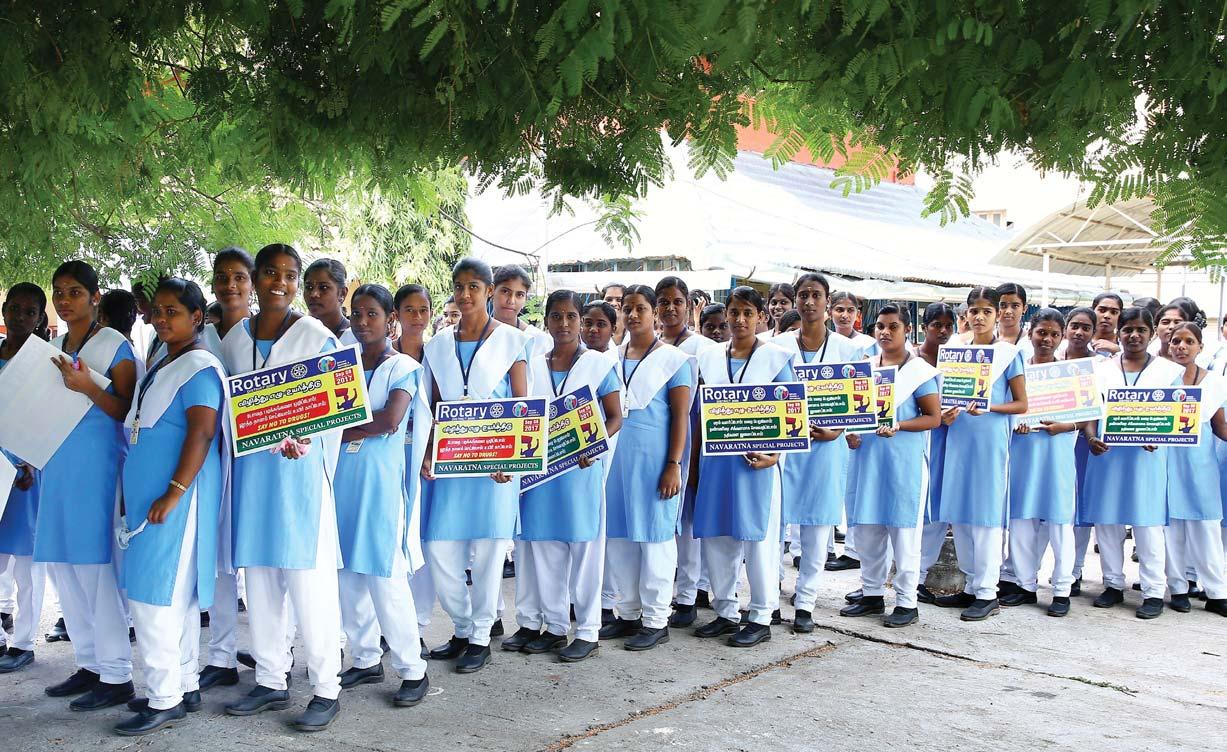
To promote Swachh Bharat, D 3000 undertook awareness rallies involving school and college students, Rotarians and the public, Rotaractors and Interactors through its clubs recently. This was the second Navaratna project to highlight clean environment with a strong focus on public health and personal hygiene, as also a campaign for Go Green (environment), Go Blue (linking of rivers) and Go Red (blood donation).
The rallies were organised with support and participation of the civic administration and were PR exercises to enhance Rotary’s commitment to serving humanity and making a difference.
At Trichy, a strong contingent of 1,500 students and public marched along with Rotary leaders, police and the Municipal administration officers and staff. The volunteers cleaned the entire stretch of the march route. At another point, handbills were distributed on cancer, drug and cleanliness awareness. They wore fancy masks to catch the public eye. On another route, about 200 Interactors and Rotaractors took out a bicycle rally with the participation of Railway Divisional Manager and Deputy Commissioner of Police. In small towns such as Ariyalur, Thuraiyur, Karur, Alangudi, Karambakudi, Batlagundu, Andipatti, Vaiyampatti, Manapparai, the rallies
were marked by placards, slogans, street plays, music bands and human chain formation.
All the clubs in Karur jointly organised the rally which was inaugurated by the District Collector. He walked with the students the entire stretch of 3 km. A salient feature of the rally was the youngsters cleaning the roads. The awareness rally at Kodaikanal and Dindigul which was inaugurated by the District Collector, served as a reminder to the public to maintain a clean environment. At both Theni and Pudukkottai, the rallies inaugurated by the Superintendents of Police, created a team spirit and promoted awareness on hygiene
Women beneficiaries of a microfinance project being implemented by RC Chennai Galaxy, D 3232, have become successful entrepreneurs with regular training imparted to them at the two centres of SPS India Foundation, an NGO. This multi-district project involving international partners — RC Geleen, the Netherlands, District 1550, and Districts 1870 (Germany) and 1630 (Belgium and Luxembourg) — aims to free women SHGs from the clutches of private money lenders, who charge very high rates of interest, even as they were unable to access bank loans without any collaterals.
Under the Women 1000+ project, the club offers loans up to `15,000 for an entrepreneur at an interest rate of 1.2 per cent a month or 6.6 per cent as cumulative interest for 10 months
by which time they had to return the money. Till now, the project has disbursed `35 lakh to nearly 300 women from 40 groups at Basin Bridge in Chennai, and Vilathikulam village and Kovilpatti in Tuticorin district. Recently, the club has raised the loan ceiling to `30,000 for borrowers at Basin Bridge.
“The total project cost is $108,000 and we have time till July 2018 to disburse the sanctioned loan amount,” says Anshul Agarwal, President, RC Chennai Galaxy.
The club has given ` 30 lakh to SPS Foundation for training the SHGs at its centres in Basin Bridge and Vilathikulam. “There is no timeframe for imparting training to women entrepreneurs and the amount will also take care of administrative expenses at these centres,” informs Anshul.
Vocational and leadership skills and other nitty-gritties of running
an enterprise such as profitable investment, transaction deals, documentation and account-keeping are taught at the SPS centres. During their visit to Vilathikulam recently, a Rotary team led by Anshul found that women are being trained in profitable ventures such as trading in goats, fish, agriculture, garment retailing and basketry.
Veeralakshmi (28) from Muthalipatti village in Tuticorin purchased a goat and upgraded her farming with a loan of `15,000. She is the first woman graduate in her village and feels education of girl children is a must for empowerment. “I motivate members in my Sembaruthi SHG to send their children to school and save enough money for the future.”
After being trained at SPS centre in Vilathikulam, her SHG members had improved their monthly savings to over `200.
Beneficiaries at the loan disbursement event in Chennai.

V Muthukumaran
Spanning a large geographic area District 3160 can surpass $1 million in giving to The Rotary Foundation as time and again the Rotarians across the 69 clubs here have demonstrated that they have a big heart and this annual target can be achieved despite the usual excuses such as no airports, poor connectivity and very little business or trade being generated in the revenue belts.”
Saying so, RI Director C Basker motivated the large gathering of Rotarians at the 34th TRF district seminar in Hospet to further scale up their initiatives and visibility.
In Rotary, there is no discrimination of colour, caste, culture or nationality, it only teaches us to love everyone across the world, he said, adding how in his company’s canteen, the practice of rotating the same plates and crockery sets across the hierarchy from the top MDs, executive staff to the last employee had ensured social equity and a feeling of bonhomie. “The entire staff sit together in the same hall to have their food. Rotary has taught me that charity must start at home. Now, my organisation is healthy, I am making more money and spending more. You see, everything is interlinked.”
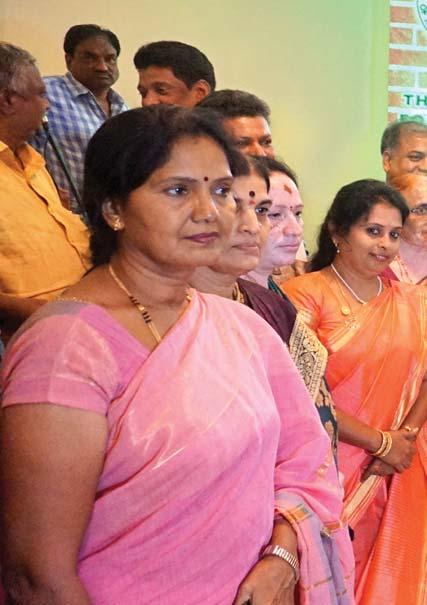
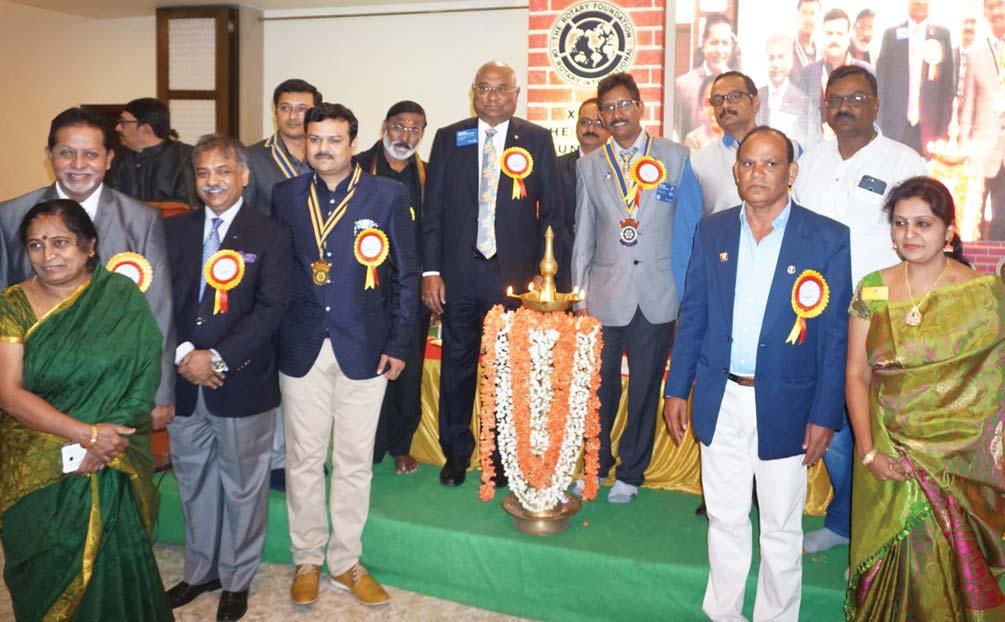
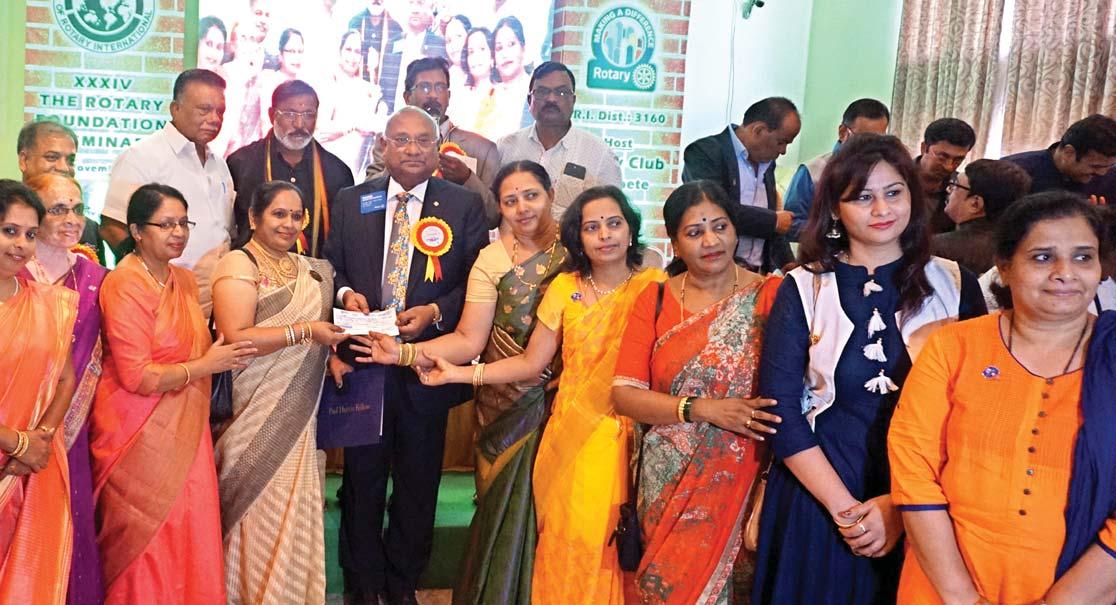
He highlighted PRIP Arch Klumph’s message that members won’t attend meetings regularly if they were not motivated and the responsibility lies with the club presidents to make it interesting and choosing the right projects.
Recalling Rotary’s success in polio eradication, Director Basker said, “We were never taken seriously by UNICEF and Centers for Disease Control in the global fight against polio till we succeeded in the Philippines (1982–84).” Ever since, PolioPlus has been one of the most successful health projects of an NGO.
With the “trendsetting” presidents, in the last four years India has become a global donor and moved from being a net receiver to a giver, even as we reached the second rank in the last Rotary year, with a TRF contribution of over $20 million.
In his address, DG Madhu Prasad Kuruvadi noted that only 13 per cent of the Rotarians had participated in the district’s contribution of $220,000 last year to the Foundation. “We had begun this year with a TRF giving of $30,000
during the installation. We have to contend with small clubs in small towns, but despite this hurdle, we are meeting the local needs of our communities.”
DRFC Ramalinga Reddy said, “Only through love and affection from the leadership, the Rotarians will be motivated to achieve the desired goals in TRF and project objectives.” He expressed confidence that the TRF target of $250,000 from the district for the current year will be met. The district has been doing projects without global grants and managing with local contributions alone.
District Secretary Tirupathi Naidu urged the Rotarians to attend TRF seminars to understand about the Foundation and its activities, and get motivated by the inspiring speeches of Rotary leaders.
DRFC and Vice Chair of the National CSR Committee Vinod Bansal gave a checklist of dos and don’ts while applying for a global grant in a CSR project with the club making sure all the formalities and procedures were
complied with as per both the Companies Act and TRF guidelines. PDG Sathish Dhamankar, D 3170, enunciated the differences in the three types of Rotary grants — global, district and package grants — and urged the club presidents to do a SWOT analysis of their assets, financial strength and the expertise of the members before embarking on such projects. A global grant will be applicable only to a longterm project with sustainable outcomes aligned with Rotary’s focus areas and having a minimum budget of $30,000. And it must have a world fund match from a partner district, he said.
Listing out the projects of the host club, RC Hospet, PDG Gopinath Ramrathnam said till date there were 145 PHFs, 17 Major Donors, 100 nonRotarian donors and a cumulative giving of $246,000 to TRF. Club President P S Gurunath hoped that with the knowledge gathered at the seminar, the district will be able to sign some global grant partnerships. The seminar collected $60,000–70,000 for TRF, with the attendance of 310 Rotarians. Pictures by V Muthukumaran

Sandhya Rao
Sometimes, the oddest book captures your fancy. I’m a typical case, right through school totally terrified of arithmetic and anything mathematical. Thanks to an inspiring teacher, Mrs Rajam, and a question paper in the public exam that was entirely based on common sense, I managed to do well enough for the admissions head of a college to ask why I didn’t take up mathematics instead of English literature at the undergraduate level. Horrors! Luckily, that bullet was dodged. Recently, two parcels of books arrived at home. Among them was a paperback called The Gentle Man Who Taught Infinity by Sheshagiri K M Rao. You will remember The Man Who Knew Infinity, by Robert Kanigel, made more famous by the film starring Dev Patel essaying the role of mathematician Srinivasa Ramanujan,whose brilliant work was revealed to the world by the British mathematician TM Hardy. Mattur Venkatadri Channakeshava taught maths to generations of boys at Baldwin Boys High School, Bengaluru. He was no ‘hero’ in the way we normally understand the word. As the author says in his intro: “He didn’t make me a rank holder or a gold medallist in the subject. No he didn’t. I was just
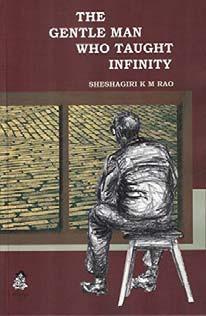
an average student of the subject who very nearly failed in it in the ninth grade. He will vouch for this. But he made me love the subject.” Now that, by any definition, is genius: to show the way to love something, that’s special.
Sheshagiri Rao goes on to explain: “The first thing Channa did was make us enquire and think. He gently nudged and pushed us to figure things out on our own, always. Second, his teaching was based on first principles… always. You never got a sense that he was ad hoc. He taught you to see a pattern in the madness. Third, he taught us mathematics because he wanted us to pursue truth and beauty, not just get good examination grades. Yes, you read me right. Never mind if none of us became mathematicians. For me, he made maths
fascinating. Finally, Channa was a master storyteller who loved his craft. Which is why I remember minor details of his teaching even after all these many years.”
With the help of anecdotes, reflections, references, problems and solutions, inferences and reminiscences, the book showcases the teacher, the art of teaching, and explorations on the beauty and nature of the subject, in this case, mathematics. The writing has neither flair nor flourish, but it has passion.It is insightful in its observations and open-minded in its vision. It also whets curiosity. It may not necessarily drive out all those fears but it will certainly help sweep away some cobwebs.
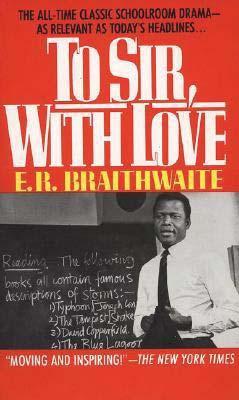
Reading The Gentle Man Who Taught Infinity — and skipping the really nerdy bits — got me thinking about teachers and teaching methods, and about books about teachers and teaching methods.The first and most obvious name that comes to mind is To Sir, With Love by
E R Braithwaite. Most people of my generation would remember the film starring Sidney Poitier. Others will remember the title song, so tenderly rendered by Lulu. I remember that I first read the book, and only later saw the film. Published in 1959, it is based on the true experiences of the author when he was a teacher in a school in East End, London. A couple of years later when I chanced upon Up The Down Staircase by Bel Kaufman, it seemed like the American answer to To Sir, With Love. Published in 1964, Wikipedia says the book was 64 weeks on the New York Times bestseller list. It talks about teaching classical literature to children at an inner-city school plagued with all kinds of societal issues; the title comes from the fact that kids could get punished for going ‘up the down staircase’.What makes Kaufman’s book interesting is its stylistic approach, combing memos, notes, essays, lesson plans, and occasional dialogue to create the narrative thread.

Technical High School on Staten Island. His charges were 16-year-old mechanics, beauticians, gang members, criminals and taxi drivers-in-waiting. They did not want to be taught Shakespeare, let alone waste time in school. A boy called Petey threw a baloney sandwich at him: McCourt’s response was brilliant and audacious, as well as typical of his style. He picked the sandwich up, ate it and told the class it was delicious. Thereafter he learned to control his classes, either by getting them to write what they wanted to write (excuse notes in the style of Eve, Judas and other figures of the past was always popular) or by telling them stories about his Irish life before America…”
Diary in which she, as a child, had recorded her observations during the Bosnian conflict.
There are many books on this theme, and so much more to understand about life and learning from them, including A Beautiful Mind by Sylvia Nasar. This 1998 book is the biography of Nobel Prize-winning economist and mathematician John Forbes Nash. And who can forget the perfectly charming Totto-chan: The Little Girl at the Window by Japanese television personality Tetsuko Kuroyanagi, published originally in 1981 in Japanese. She describes the rather unusual education she received in an unused train that served as her elementary school, founded during World War-II by educator Sosaku Kobayashi.
A couple of books on the theme attained literary fame. Among them is The Prime of Miss Jean Brodie by Muriel Spark, published in 1961. In 2005, Time magazine included it in its list of 100 best books published in English from 1923 onward. This is a work of fiction, however, set in the 1930s, and gets some of its nuance from the fact that one of the things Jean Brodie promotes is fascism. However, Frank McCourt’s Teacher Man is again entirely based on his own experiences as a teacher in the US. The obit by Carlo Gebler published in The Guardian in July 2009 upon his death bears quoting: “… in 1958, he started his teaching career in McKee Vocational and
A friend introduced me to Erin Gruwell’s account of her experiments and experiences with students of Woodrow Wilson High School in Long Beach, California. The Freedom Writers
Diary: How a Teacher and 150 Teens Used Writing to Change Themselves and the World Around Them was published in 1999: it is relevant in any part of the world even today. The atmosphere in the school when Gruwell first stepped into its corridors was charged with tension: racial, societal, economic. By getting her students to read and write about books such as The Diary of Anne Frank and Zlata’s Diary: A Child’s Life in Sarajevo, she managed to impact their lives and thinking. The original freedom writers’ high point was a visit from Zlata Filipovic herself of Zlata’s
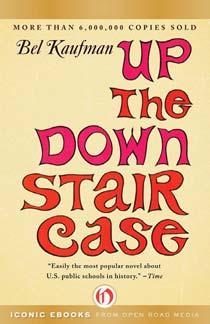
Teachers are the backbone of any society, and a good teacher loves the subject, loves students, and loves to get the students to love the subject in her or his own way. In the very first class of Channa’s that Sheshagiri Rao attended, the students saw a simple problem written on the blackboard: 142857 x 1 = _____. That was a cakewalk. They were asked to continue multiplying: 142857 x 2, 142857 x 3, 142857 x 4, 142857 x 5, 142857 x 6. Now, Channa asked them to look at all the answers. What did they observe?
If you don’t already know this one, do it and see for yourself. If what you see doesn’t get you at least a tiny bit fascinated, well, then, multiply 142857 by 7! I would never have known what a magical world numbers inhabit had it not been for books. And this is just the tip of the iceberg. So many more books and numbers await!
The columnist is a children’s writer and senior journalist.
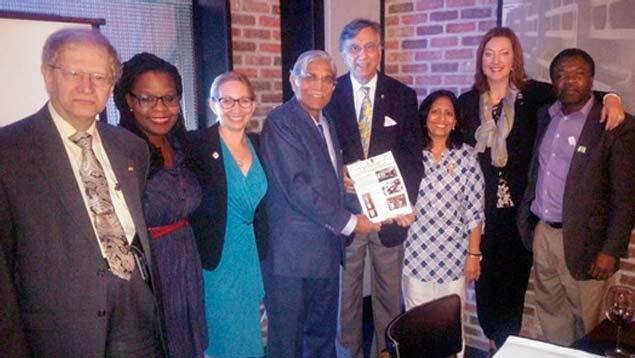
RCPS IPP Pradeep Wagh (fourth from left) presenting the project report to PDG Suraj Bhatia. Also present (from L) RCJC Secretary Stephen Stamos, Michelle Ricot-Nandakumar, President Jennifer Aitken, Netra Wagh, Lisa Boehm and Thomas Chu.
Komal, Poonam, Sheetal are all common names of school-going girls in the deep rural area schools around Pune. Komal, the loving daughter of a farm hand, till some time back, had little hope of making it to the secondary school examinations in any good shape. Her moderate family resources prevented her from getting modern educational aids to help her. Also, the school she goes to belongs to a zilla parishad, which has modest facilities. Of course her school teacher is a very dedicated person. But he has to teach multiple classes and finds it difficult to impart quality education to the students in different grades. The school lacked laboratory, library facilities and sports equipment.
This is where RC Jersey City (RCJC), US, D 7490, came to the rescue of Komal and several hundred school-going children like her. RCJC
partnered with RC Pune Shivajinagar (RCPS), D 3131, to do an international project for its centennial year (2016–17).
A global grant programme was chosen as a vehicle for this purpose. Named the Rotary Distance Education Programme (RDEP) this project has three main components:
Computer-aided education units for over 20 rural schools with pre-loaded software of school syllabus as a teaching aid to such schools.
Comprehensive infrastructure development of select schools. Teacher training under a Teacher Quality Improvement Programme (TQIP) for over 200 rural teachers.
“Global grants are an effective tool of Rotary for promoting development in under-developed areas of society as also for international understanding through partnership of two clubs,”
said Dr Pradeep Wagh, IPP of RCPS, speaking at the kick-off of the Rotary Foundation Month at RC Jersey City. He was speaking on the occasion of successful completion of the project in 2016–17.
Global grants are an effective tool to leverage the resources available with a club for a higher value. This project, for instance, had contributions of RCJC, RCPS as also others from D 3131, D 7490 and The Rotary Foundation.
President Jennifer Aitken from RCJC traced the progress of the project from the time PDG Adele Miller initiated it. Several Rotarians from both the host and partner clubs followed up with guidance from past DRFC Mohan Palesha, D 3131.
The RDEPs improved the understanding of math and science for rural students with graphics, audio-visual presentation and animation being used in the class.
While the infrastructure development (the second component) provided facilities like a well-stocked library, sports equipment and other requirements, the TQIP equipped the rural teachers with innovative strategies, intelligence and skill sets required for classroom teaching.
It was a matter of pride that Komal, one of the beneficiary students, scored 97 per cent in the Class 12 public exam in 2016–17. Her friends Poonam, Sheetal and hundreds of other students who benefitted from this global grant project had passed out with flying colours.
“We are thankful to Rotary for empowering the rural students by giving us e-learning and other equipment,” said Rajaram Mhaske, Principal, Kasurdi ZP School in Daund taluk, Pune.
The crowning moment for this project was when it won the district’s
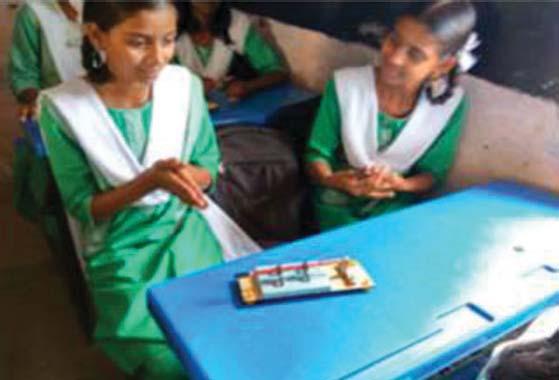
Best Literacy Teacher Training Award under a global grant. In order to make the project easily replicable, a video documentation of the teacher training
was done which can be viewed at: https://sites.google.com/site/rcpstqip/ PDG Raj Bhatia of D 7490 has played mentor for this project.
TheRotary Ulema Council, formed in the troubled days when there was a lot of resistance against polio vaccination by the Muslim community in States like Uttar Pradesh, Maharashtra, Kerala, etc, has been roped in again as Rotary in India has signed an MoU with the Indian Government for a partnership in universal immunisation including Mission Indradhanush.
Under the chairmanship of PRID Ashok Mahajan, who had played a leading role in bringing the Muslim community on board during polio vaccination over the last many years, the Rotary Ulema Council met in Lucknow in December. Mahajan said the meeting was attended by Hindu, Muslim and Christian religious leaders. “Around 30 Muslim Ulemas who attended the meeting, expressed their wholehearted support
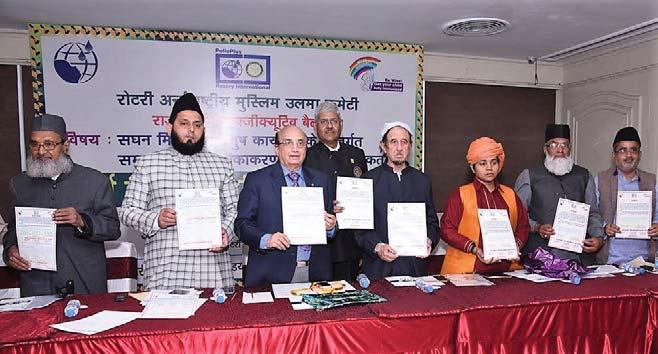
PRID Ashok Mahajan with religious leaders at the Meet.
and an appeal to promote Routine Immunisation, signed by many prominent Ulemas from Lucknow was released.”
Secretary of the Ulema Council, past president Ajay Saxena, from D 3120 was also present, as well as the media which has reported this
initiative of Rotary to ensure that children from all communities get proper immunisation to protect them from polio, measles, rubella etc.
He added that the Ulemas have promised to propagate the immunisation message during Friday prayers in mosques in UP.
Rotary Eclub Magnum, D 3012, has upgraded facilities at the Government girls schools in and around Gurgaon district, in Haryana. “Originally the plan was to do so through a global grant, but when we found that Rotary International is now allowing CSR funds from corporates to be used for welfare projects, we embraced the idea,” says past president of the club Sunil Prakash, who is the project coordinator.
So, the corporate Zeco Aircon was roped in to contribute $32,000 for the first CSR-Global Grant to upgrade six schools in and around Sohna town in Gurgaon district. The project report was made and with the persistent efforts of RISAO (Rotary International South Asia Office) in New Delhi, the first such application for the grant was moved and was also approved in record time. “This gave us the confidence that yes we can go ahead in improving the lives of girls in these schools by giving them better water, health, sanitation facilities and basic education,” he adds.
Once the grant was released, the project was put on fast track to prove that the club meant business. Work started in full swing in the schools, with great support from the school authorities, the district education officers and specifically the school management committee (SMC) and village authorities. This resulted in much faster work.
“When the teachers and the students came to know of our project, they were very excited and enthusiastic. They cooperated with us and assured us they will turn their schools

TRF Trustee Sushil Gupta inaugurates the school in the presence of (from L) DG Sattish Singhal, DGN Deepak Gupta, Rotary Eclub Magnum President Ravi Singhal, Chairman-Zeco Aircon and Project Coordinator Sunil Prakash.
into Happy Schools and also improve their attendance, which has already happened,” added Prakash.
The first renovated school was inaugurated by TRF Trustee Sushil Gupta in the presence of DG Sattish Singhal, PDG Ramesh Aggarwal and DG Nominee Deepak Gupta, Jayashree Jayaraman, Manager - CSR and WinS, TRF, the village pradhans, SMC members, officers from the education department and parents. The meet concluded with planting of trees. Under this project, the following facilities have been given.
Sanitary napkin vending and disposal machines
Running water in toilets
Handwash stations to develop the habit of hand washing with soap before and after meals and after using toilets
Safe and filtered drinking water
Tables and benches for classrooms
Fans, dustbins, and a clean environment in and around the school premises
Parks to play and exercise and A computer centre.
“We have another such CSRGlobal Grant for next seven schools in Bahadurgarh district. Work has started and will take time to complete,” said Prakash.
Trustee Gupta appealed to the village pradhans, SMC members and the parents to take responsibility for the sustainability of the project and maintain the facilities as they do for their own homes. Only then can their children reap the benefit of the work done in the schools.
Ravi Singhal, Chairman of Zeco Aircon and current president of RC Eclub Magnum, appealed to corporates to come forward and contribute to such projects. When the youth of the country is empowered with basic education, health and hygiene, they will act as ambassadors for the next generation to change and live life comfortably, he said.
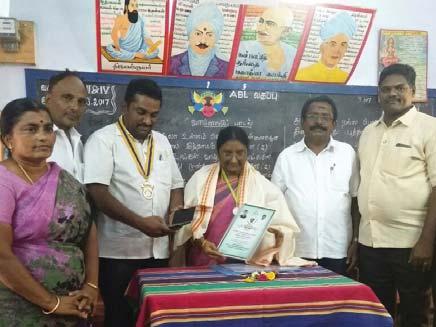
The Rotarians provided toilet and water facilities and sports material to benefit the students of two government schools in Karur. They also gifted crackers for the rural children to enjoy Diwali.
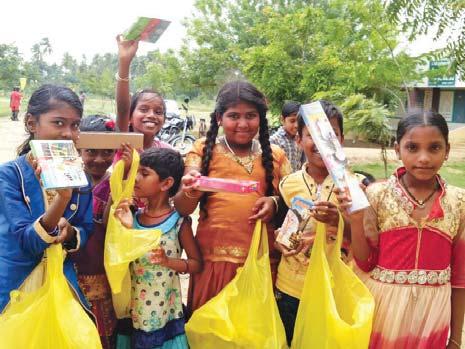
Past president Sandeep Singhal, along with spouse Kavita, met the the President of India Ramnath Kovind at the Rashtrapati Bhavan and briefed him of Rotary’s contribution to the welfare of the people.
MSelvakumari, spouse of club member T P Venkatachalapathy and a teacher in a municipal school, donated Rs 10,000 to the Rotary Polio Fund. The amount was the prize money she got as part of the Dr Radhakrishnan Best Teacher Award from the State. She herself is a polio victim.
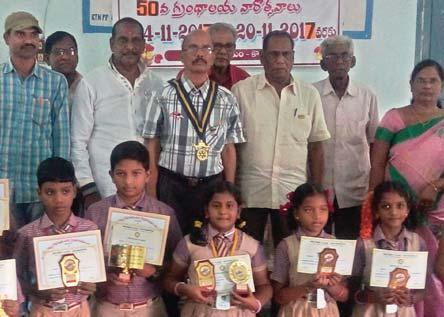
The club organised several competitions for school children in Kothapeta. Nearly 100 mementoes and certificates were given to the winners.
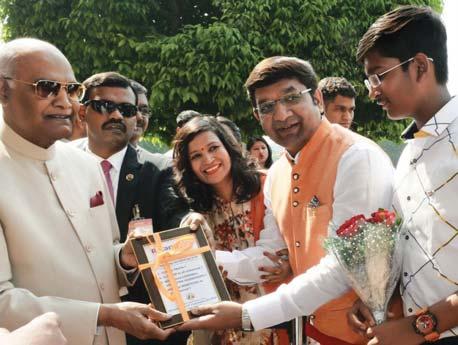
A three-day RYLA was held for 50. Adivasi students who hail from a remote hamlet. Lectures on career opportunities and skill development activities were arranged for them. DG K S Rajan inaugurated the RYLA.
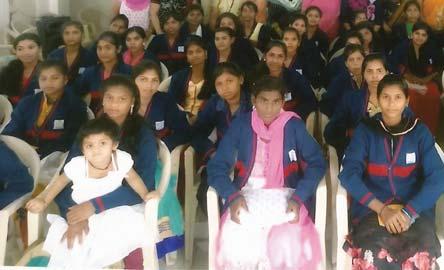
To assist pilgrims visiting the Matanamadh temple in Kutch, 32 camps were set up. The Rotarians visit the camps regularly to inspect food hygiene, hand wash system and replenish medicine stocks. Recently, four Best Camp Awards were given away in the presence of DGN Niraj Bhai Sogani.
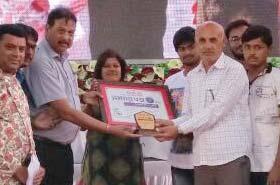
The Rotarians presented education kits to the students of Aamba Primary School in Amreli and conducted programmes to inculcate interest in various subjects.
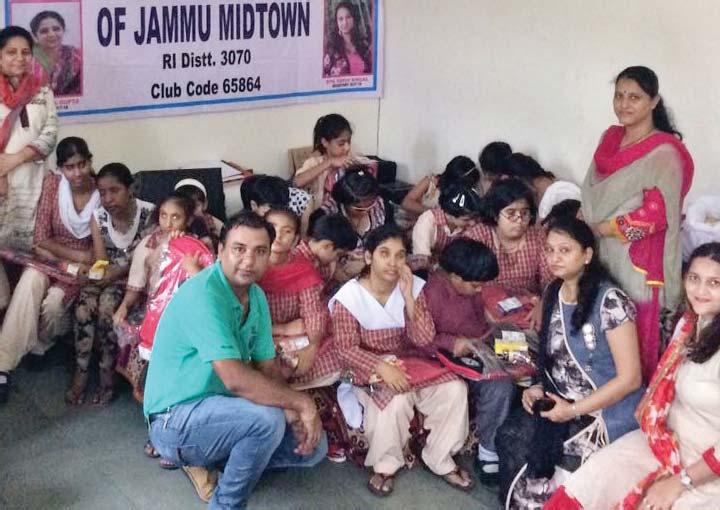
The club members visited a home for visually-challenged girls in Roopnagar and donated groceries, spices and cooking oil for the benefit of the inmates. They also distributed travel bags to the girls.
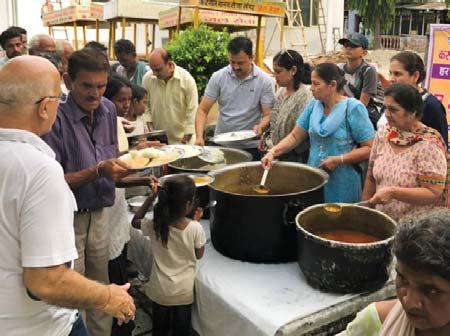
To mark the occasion of Annapurna Diwas, the club served food to 500 people at Manav Sewa Sang in Karnal. The Rotarians also educated them on health and sanitation habits.
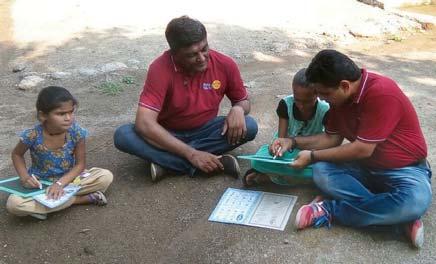
An awareness programme on handwashing was held at the MP Elementary School. Watercans, soaps and brochures detailing correct handwash procedure were distributed to the students.
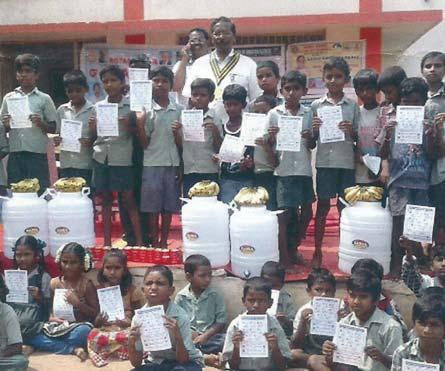
In
a green initiative titled ‘Each one, sow one’, seed balls were prepared and sown around the region. The Rotarians also planted around 100 saplings in the town. Suresh Babu, Director, International Services, has taken the responsibility of rearing the plants.
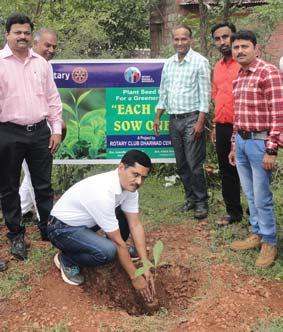
Awater purifier was donated to the Hosur Government School to provide clean and pure drinking water for teachers and students. The teachers thanked Rotary for their thoughtful gesture.
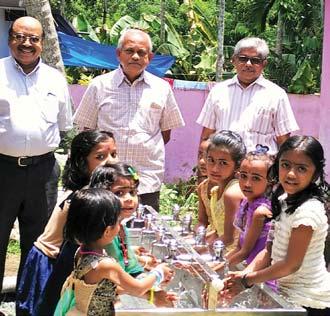
steel handwash unit was installed at the Government L P School, Perupadanna, for the benefit of the students. The school was adopted by the club 15 years ago.
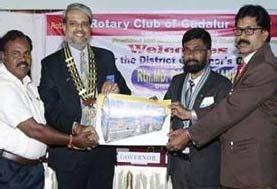
Over 1.45 lakh people including 75,000 tribal villagers in Gudalur hill area will benefit from a freezer box donated by the club to Rotary Gudalur Valley as part of building its public image in the district. The cost of the project is Rs 1.15 lakh.

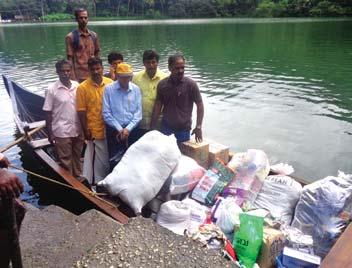
The club distributed food, clothes to the people living at the Neyyar Wildlife area near Thiruvananthapuram. Notebooks and stationery were given to the school-going children.

The Rotarians gave T-shirts and stationery material to the students of Sevathur Government School in the town to motivate them to attend school regularly.
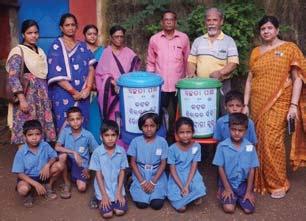
Bhai Duj (Brother’s Day) was celebrated with transgenders who were overwhelmed by the reception and warm acceptance they got from the Rotarians. Rotaractors also took part in the event.
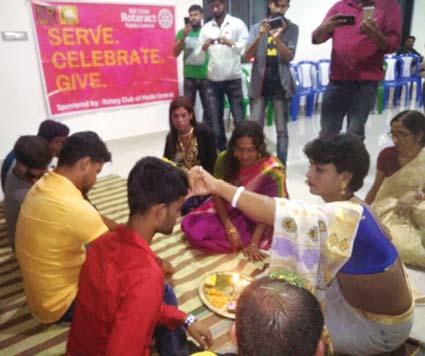
Health camps were conducted in various localities and for schoolchildren with the help of doctors from the government hospital. A cancer screening camp was also organised.
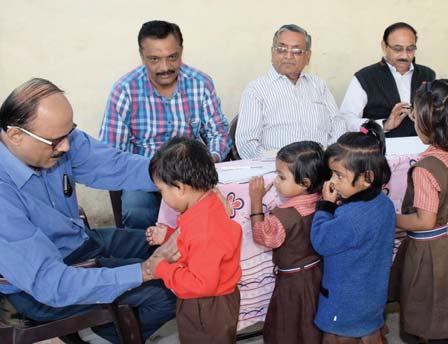
Dustbins were donated to the Shelter Primary School in Cuttack to promote the habit of cleanliness among the students. The teachers appreciated the thoughtful gesture of the Rotarians which will help the school to maintain a trash-free ambience.
Compiled
by V Muthukumaran
Designed by L Gunasekaran
Kiran Zehra
True disability lies in the eyes of people who can’t see beyond physical appearance,” says Vishwas KS, who lost his arms in an accident when he was 10. “But, that did not stop me from becoming a para-swimming champion,” he adds. The 26-year-old swimmer from Bengaluru has won three medals at the 2016 Speedo Can Am Para-swimming
championships held in Canada. He was one of the participants at a 2-km walkathon that was organised by RC Bangalore Orchards, D 3190, at Millers and Cunningham Road on the International Disability Day (Dec 3).
To make the walkathon more effective and let the message sink in deeper in the minds of the public, the club had arranged strategic points
where the participants assembled with banners, speaking about caring for the disabled and how they are “not disabled, but differently-abled.” Rotary’s role in making India polio-free was also displayed at the venues.
While the differently-abled community is fighting hard for their basic rights, some of them are struggling to break free from the clutches of
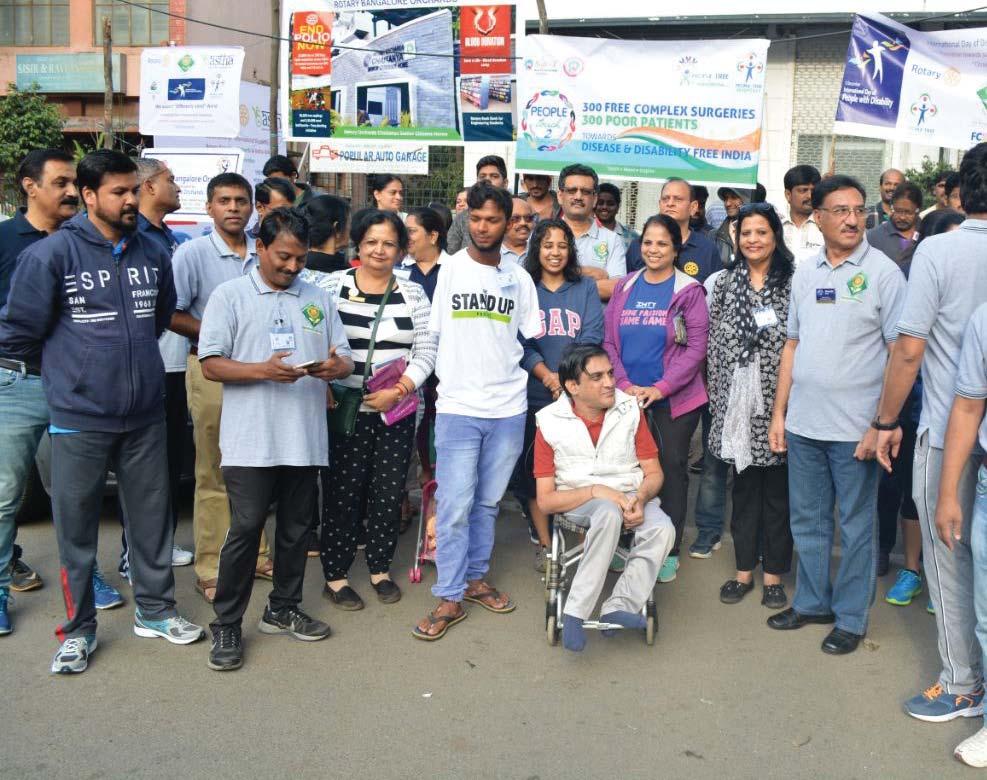
superstition, says Club President Aleemullah Khan. “In some rural regions they are even considered ‘cursed’. This is shocking and ridiculous. How can we explain to these people that disability has nothing to do with supernatural forces? Awareness is the only solution.”
Adds Vishwas, “Pity is hurtful. We want people around us to be more empathetic. Our physical disability does not entitle us to mere charity. We require support and encouragement to put our lives back in place. We want to be accepted.”
Khan adds that the walkathon, apart from creating awareness, has also helped in enhancing Rotary’s public image and is an extension of the End Polio initiative. “Even though
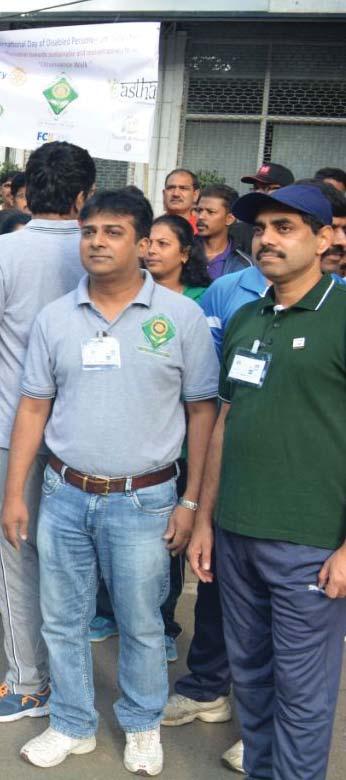
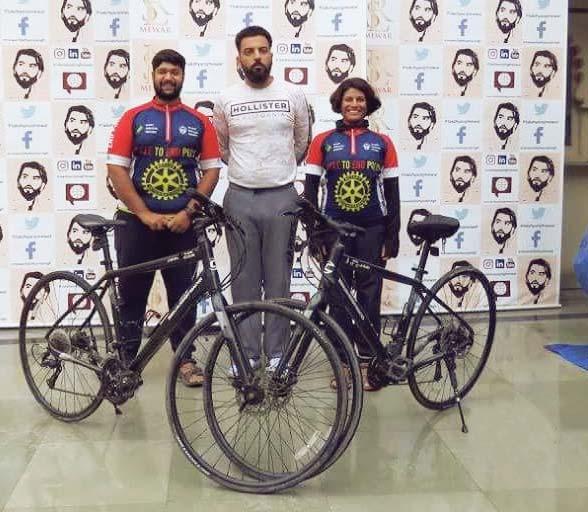
Pavan and Bhagyashree with the Prince
Lakshya Raj Singh Mewar.
India is officially certified Polio-free in March 2014, there are polio cases coming up in neighbouring countries and we need to sustain our fight against polio. We have sent out a powerful message that Rotary is sensitive to the needs of the differently-abled people and our main focus is to end polio that has crippled so many people in the world.”
The walkathon has received a big response in Bengaluru, “all thanks to our Public Image Director Naresh Nagraj who was instrumental in getting good mileage from print and electronic media.”
In September, DG Asha Prasanna Kumar and Nobel Peace laureate Kailash Satyarthi flagged off a 20,000-km cycle expedition across India undertaken by Rotaractors Pavan and Bhagyashree of Rotaract Club of Bangalore Orchards. They are
attempting a Guinness World Record while spreading awareness on Rotary’s End Polio and TEACH initiatives. Past president Kirit Morzaria drafted the route map and has also arranged a support vehicle, in association with Fiat Chrysler Automobiles, to provide logistic support to the cyclists throughout the expedition. DG Asha has coordinated with 38 Rotary districts to provide support to the Rotaractors who are expected to complete the expedition by Mar 15.
“We are thankful to Rtn Sridharan MB from whom we received the first cheque of `1 lakh and thereafter many Rotarians have contributed to the cause,” says Khan. The club’s Youth Service Director Jay Pillai has provided space in his office to set up a control room and is coordinating with a team of Rotaractors to monitor the day-to-day developments of the expedition. The cyclists have covered over 6,000 km so far.

Last month I was invited for an event in Bengaluru as a speaker. All speakers were staying in a five star hotel, where when I tried to go into the bar, a man stopped me saying I had to wear shoes to get admission.
I reminded him India had become a free country in 1947 but he just looked at me blankly. I told him I didn’t have any shoes, which was true. Again he looked blank. We argued a bit. In the end I just told him to have me thrown out and walked in.
As usual the few men who were there were all properly dressed in western clothes. And as usual, the few women who were there were all in chappals and sandals. Talk about gender discrimination.
This ‘formal’ dress and ‘dress code’ thing has always flummoxed me. What does it mean anyway? I mean why is it dressing stupidly considered a good thing?
My first exposure to this idiocy was in 1964. Thanks to my father
One day I spilt some sambhar down the front of my shirt and Eureka! I understood: ties were meant to hide stains on men’s shirts.
being transferred to Jabalpur from Delhi, I was forced to go to a school run by the missionaries. It was an excellent school but a tie was a must part of the school uniform.
Jabalpur is very hot in summer and less hot in winter. So I could not understand why we needed a tie. Then one day I spilt some sambhar down the front of my shirt and Eureka! I understood: ties were meant to hide stains on men’s shirts.
One day the aging Anglo-Indian master who taught science asked the class to each name an innovation. When my turn came I said tie. He looked surprised and asked why and I said it was great way to hide stains.
The old man gave me a rap on my knuckles with his cane. “You stupid boy, ties are meant to keep you warm,” he said.
Keep you warm? In India? In Jabalpur? And it was me who was stupid? Perfect!
You should see the National Day functions at the embassies in Delhi. For nine long months the city sizzles, swelters and chokes. But the dress has to be a lounge suit. For the men, that is.
The women, however, are allowed to wear what they like. So the Indian women turn up in saris and salwars, East Asian ones in sarongs and such like, while the Europeans wear loose, flowery skirts. They look very cool and very happy.
The men, meanwhile, fidget and fight with each other to stand in front of
For nine long months Delhi sizzles, swelters and chokes. But the dress has to be a lounge suit. For the men, that is.
fans that blow hot and dry (April-June) or hot and humid (July-September) air at them.
Even the suits wouldn’t matter so much if the men could wear chappals or sandals along with them. But no such luck. You have to wear shoes. The result is that heat is bottled up both from below and in the middle. Thank god, that no one insists on hats.
I have been fortunate. Not many embassies invited me. And the few that did had to do without me because I gave away my single suit long ago. I wear only khadi bush-shirts, mostly white. I don’t wear shoes either, only chappals or sandals. In winter, I put on a pair of socks.
My reasoning simple: India is a hot country and if you must insist on ‘formal’ dress it must suit the environment. Even the bandhgala coat that the government has prescribed is hot. Most men when forced to wear it don’t wear a shirt under it. That is why as India regains her confidence, Indian men should switch to clothes more suited to our climate.
After all, why should girls have all the fun?

Standing top row: (From L) Dr Vishwa Bandhu Dixit (3090); A. Venkatachalapathy (3201); Neeraj Sogani (3054); Nikhilesh M Trivedi (3261); Ravikira n Kulkarni (3170);
Nirmal Prakash A (2982); K Raja Gopalan (3212); K P Sinha (3250); Dr Shailesh Palekar (3131); C R Chandra Bob (3231); R V N Kan nan (3000); Barjesh Singhal (3070); Abhinandan A Shetty (3182); Dr E K Ummer (3202). Standing 2 nd row: (From L) Rajiv Sharma (3030); Guddati Viswanadh (3020); Konidala Muni Girish (3160); E K Luke (3211); Arun Kumar Jain (3110); Deepak Jain (3100); Subhash Jain (3012); Dr Ashes Ganguly (3142); Bhabani Prasad Chowdhury (3262); Gustad Anklesar ia (3040); S Piraiyon (2981); Chintamani Bhattarai (3292); Priyesh Bhandari (3053). Seated: (From L) Vishnu S Mondhe (3132); Dr Sayantan Gupta (3240); Suresh Hari S (3190); Mukul Sinha (3291); Vinay Bhatia (3011); Stuti Agrawal (3120); Pinky Patel (3060); Dushan Soza (3220); Babu Peram (3232); Shashi Sharma (3141); Ramesh Vangala (3150); P raveen C Goyal (3080); P Rohinath (3181).

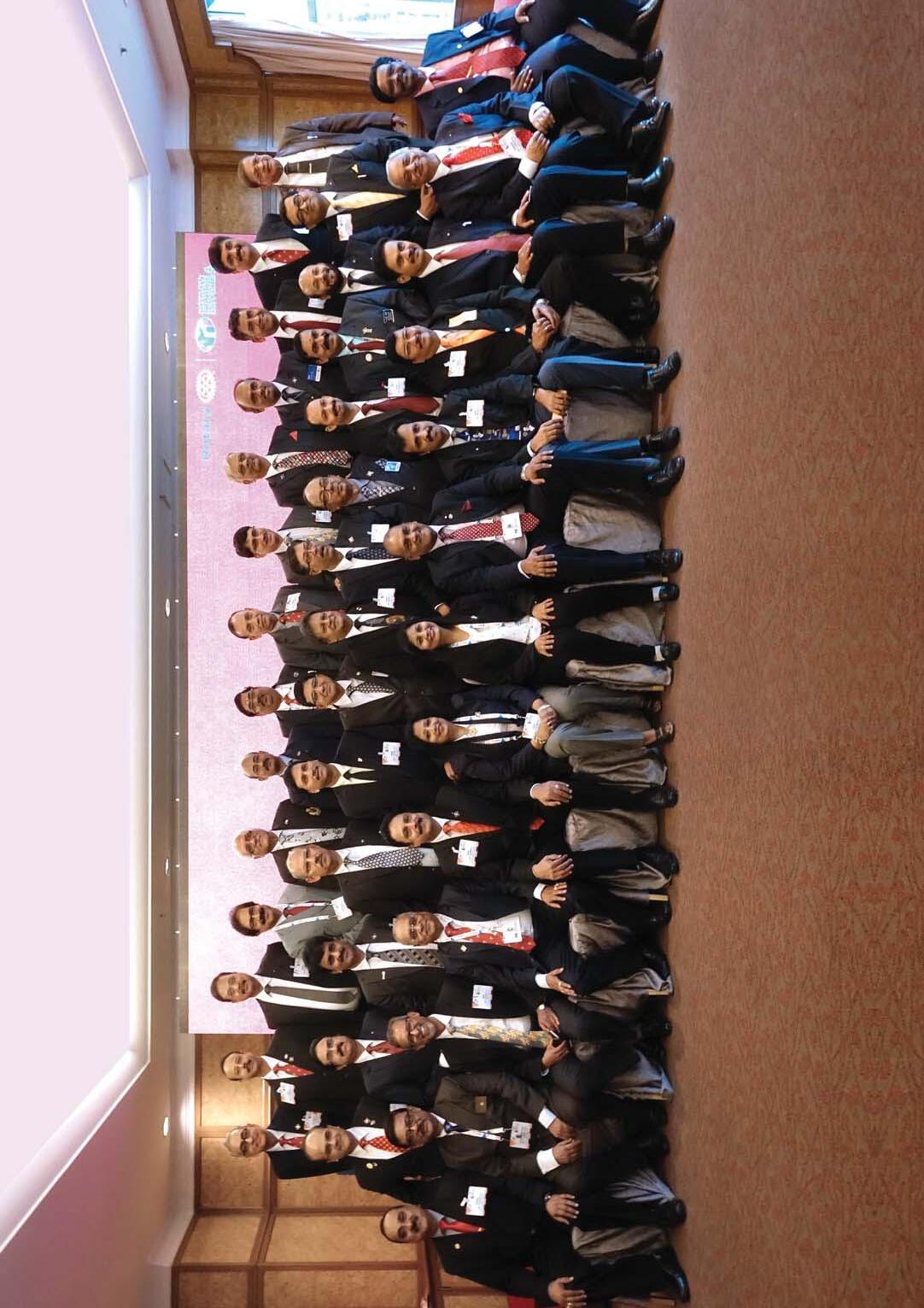
Regn. No. TN/CCN/360/2018-2020 Licensed to post without prepayment No.TN/PMG(CCR)/WPP-431/2018-2020
Registered with Registrar of News Papers for India 3880/57 Rotary News Published on 1st of every month
Total number of pages in this monthly issue, including cover, 84. Price: `35










